- You are here:
- All South Africa Tours
- Kruger Tours

Your Safari
Tour length, rates in usd $ – change currency, starting from.
- Johannesburg (334)
- Cape Town (11)
- Hoedspruit (4)
- Port Elizabeth (0)
- Pretoria (9)
- Nairobi (0)
- Entebbe (0)
- Zanzibar (0)
- Dar es Salaam (0)
- Kampala (0)
- Victoria Falls Town (0)
- Windhoek (0)
- Addis Ababa (0)
- Mombasa (0)
- Livingstone (2)
- Antananarivo (0)
- Bujumbura (0)
- Hazyview (8)
- Blantyre (0)
- Upington (0)
- Diani Beach (0)
- Nelspruit (5)
- Lilongwe (0)
- Bulawayo (0)
Comfort Level
- Luxury+ (31)
- Luxury (76)
- Mid-range (180)
- Budget (78)
Private or Shared Tour
- Private tour (112)
- Shared tour (265)
Safari Type
- Lodge, tented camp or hotel (347)
- Camping (30)
Operator Rating
- & up (355)
Specialized Tours
- Fly-in safaris (18)
- Family (176)
- Beach time (6)
- Honeymoon (107)
- Gorilla trekking (0)
- Photographic safaris (2)
- Mountain climbing (0)
- Walking safaris (2)
- Self-drive (6)
- Guided self-drive (5)
- Chimp trekking (0)
- Overland tours (7)
- Cycling safaris (0)
- Canoe safaris (0)
- Horseback safaris (0)
- Birding tours (0)
- Accessible safaris (0)
- Golf & Wildlife (0)
Other Tour Features
- Airport transfer is included (377)
- Itinerary can be customized (145)
Filter by Operator
Filter by accommodation, operators from.
- South Africa (365)
- Tanzania (3)
- United Kingdom (4)
- United States (5)
- Australia (3)
- Belgium (0)
- Botswana (0)
- Comoros (0)
- Denmark (0)
- Ethiopia (0)
- Eswatini (0)
- Germany (0)
- Ireland (0)
- Lesotho (0)
- Madagascar (0)
- Mauritius (0)
- Mayotte (0)
- Mozambique (0)
- Namibia (0)
- Netherlands (0)
- New Zealand (0)
- Nigeria (0)
- Portugal (0)
- Reunion (0)
- Seychelles (0)
- Singapore (0)
- Switzerland (3)
- United Arab Emirates (0)
- Zimbabwe (2)
Kruger Safari Tours - Compare 377 Packages
South Africa’s premier safari destination, Kruger National Park throws up some staggering statistics. Established in 1898, it extends over some 19,000km²/7,335mi² and supports a total of 147 mammal species (the most of any African national park). This includes an estimated 13,000 elephants, 40,000 buffalo, 2,000 lions and more rhinos than any other protected area. Kruger is an ideal safari destination at both ends of the price and experiential spectrum. No other major African park is so well geared to budget-conscious self-drivers. Equally, some of the all-inclusive private and concession lodges associated with Kruger and its immediate surroundings (including MalaMala, Sabi Sabi and Londolozi) rank among the most exclusive, prestigious and costly in Africa.

4-Day Classic Kruger Park Safari
$958 pp (USD)
South Africa: Shared tour (max 6 people per vehicle) Mid-range Lodge
You Visit: Johannesburg (Start) , Kruger NP, Johannesburg (End)
Wildlife Safaris Tour operator has an office in South Africa
4.9 /5 – 259 Reviews
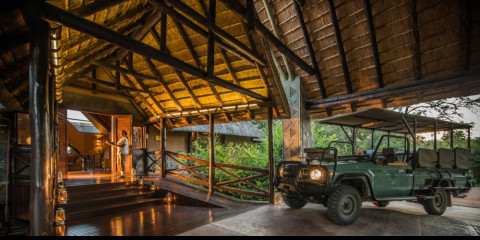
5-Day Luxury Kruger Park and Sabi Sand Safari
$2,921 pp (USD)
South Africa: Private tour Luxury Lodge & Chalet
You Visit: Johannesburg (Start) , Kruger NP, Sabi Sands (Greater Kruger) , Johannesburg (End)
Safari.com Tour operator has an office in South Africa
4.7 /5 – 186 Reviews
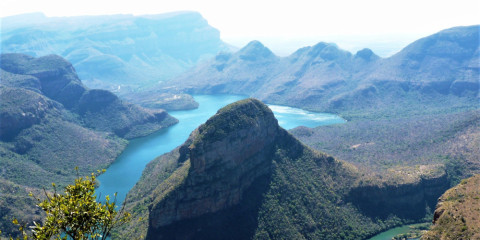
4-Day Unforgettable Kruger Park Safari & Panorama Tour
$855 pp (USD)
South Africa: Shared tour (max 6 people per vehicle) Luxury Hotel
You Visit: Johannesburg (Start) , Southern Kruger, Kruger NP, Panorama Route (Highlight) , Nelspruit (End)
Elephant Herd Tours & Safaris Tour operator has an office in South Africa
4.8 /5 – 90 Reviews

3-Day Kruger Park and Manyeleti Reserve Bongan Lodge
$683 pp (USD)
South Africa: Shared tour (max 12 people per vehicle) Budget Lodge
You Visit: Johannesburg (Start) , Manyeleti GR (Greater Kruger) , Central Kruger, Johannesburg (End)
Bongan Safaris Tour operator has an office in South Africa
5.0 /5 – 21 Reviews
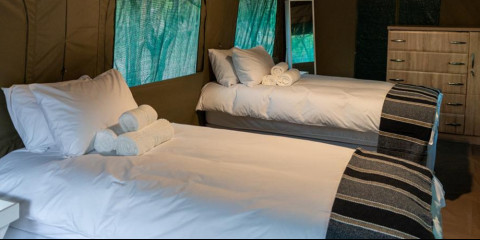
4-Day Ultra Budget Glamping Kruger Safari
$522 pp (USD)
South Africa: Shared tour (max 10 people per vehicle) Budget Tented Bush Camp
You Visit: Johannesburg (Start) , Kruger NP, Panorama Route (Highlight) , Johannesburg Airport (End)
MoAfrika Tours Tour operator has an office in South Africa
4.9 /5 – 1166 Reviews
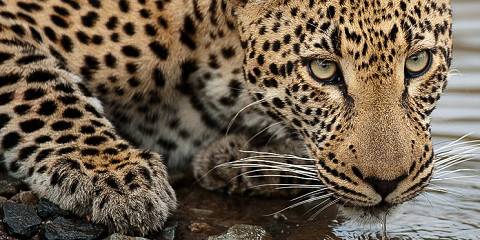
4-Day Luxury Greater Kruger to Canyon Safari Adventure
$1,355 pp (USD)
South Africa: Shared tour (max 9 people per vehicle) Luxury Lodge
You Visit: Johannesburg (Start) , Balule NR (Greater Kruger) , Central Kruger, Blyde River Canyon (Panorama Route) , Johannesburg (End)
Shinzelle Safaris Tour operator has an office in South Africa
4.9 /5 – 63 Reviews
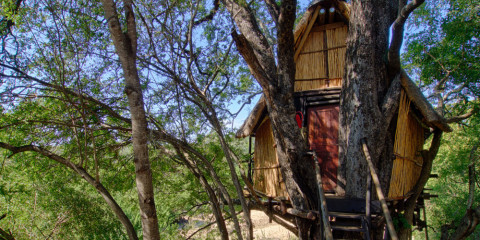
5-Day Tremisana/Treehouse Kruger Park Safari
$917 pp (USD)
South Africa: Shared tour (max 9 people per vehicle) Mid-range Lodge
You Visit: Johannesburg (Start) , Balule NR (Greater Kruger) , Kruger NP, Blyde River Canyon (Panorama Route) , Johannesburg (End)
Viva Safaris Tour operator has an office in South Africa
4.9 /5 – 262 Reviews

5-Day Safari with Night Drive and Panorama Route Tour
$1,349 pp (USD)
South Africa: Private tour Mid-range Lodge
You Visit: Johannesburg (Start) , Panorama Route (Highlight) , Kruger NP, O.R. Tambo Airport (Johannesburg) , Johannesburg (End)
Khalanga Safaris Tour operator has an office in South Africa
5.0 /5 – 63 Reviews

3-Day Big 5 Budget Safari, Kruger National Park
$372 pp (USD)
South Africa: Shared tour (max 10 people per vehicle) Budget Lodge
Safari With Us Tour operator has an office in South Africa
5.0 /5 – 217 Reviews

4-Day Kruger Safari, Soweto & Apartheid Museum
$869 pp (USD)
South Africa: Private tour Mid-range Lodge & Tented Camp
You Visit: Johannesburg (Start) , Soweto (Johannesburg) , Kruger NP, Johannesburg Airport (End)
Nhlalala Travel Tour operator has an office in South Africa
4.9 /5 – 34 Reviews
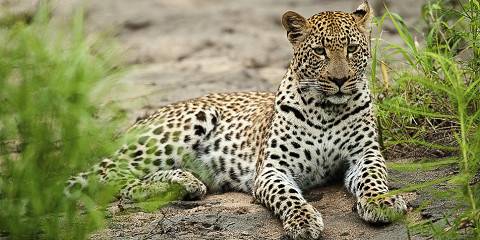
3-Day Johannesburg to Kruger National Park Safari
$598 pp (USD)
South Africa: Shared tour (max 9 people per vehicle) Budget Camping
Mbombela Experience Tours & Transfers Tour operator has an office in South Africa
5.0 /5 – 32 Reviews

4-Day & 3-Night Kruger National Park Budget Safari
$583 to $649 pp (USD)
South Africa: Shared tour (max 8 people per vehicle) Mid-range Guest House
You Visit: Johannesburg (Start) , Southern Kruger, Kruger NP, Johannesburg Airport (End)
The Mzansi Experience Tour operator has an office in South Africa
4.8 /5 – 63 Reviews

7-Day Classic Eco-Safari in Kruger (Transfers Incl)
$4,093 pp (USD)
South Africa: Private tour Mid-range Lodge & Guest House
You Visit: Johannesburg (Start) , Klaserie NR (Greater Kruger) , Kruger NP, Panorama Route (Highlight) , Blyde River Canyon (Panorama Route) , Johannesburg (End)
5.0 /5 – 42 Reviews
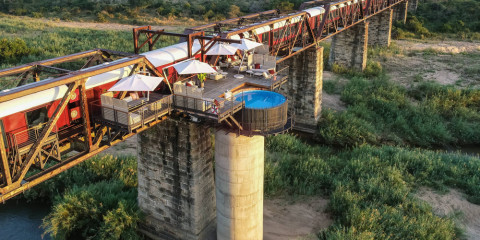
4-Day Zula Kruger Shalati Train on the Bridge
$3,225 to $3,518 pp (USD)
South Africa: Private tour Luxury Lodge
You Visit: Johannesburg (Start) , Sudwala Caves (Highlight) , Kruger NP, Panorama Route (Highlight) , Johannesburg (End)
Zula Zula Adventure Bus Tour operator has an office in South Africa
5.0 /5 – 2 Reviews

3-Day Luxury Hoyo Hoyo Safari Lodge Kruger National Park
$975 pp (USD)
Gems of Africa Safari and Tours Tour operator has an office in South Africa
4.9 /5 – 98 Reviews
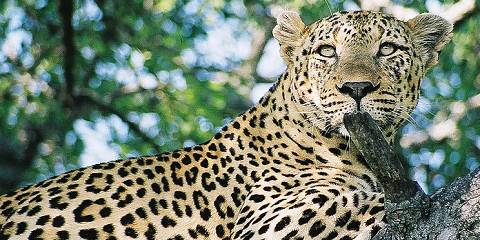
3-Day Greatest Kruger Park -4 Star Lodge & Joburg Return
$747 pp (USD)
South Africa: Shared tour (max 8 people per vehicle) Mid-range Hotel
You Visit: Johannesburg (Start) , Kruger NP, Greater Kruger, Johannesburg (End)
Southern African Tours Tour operator has an office in South Africa
4.7 /5 – 65 Reviews
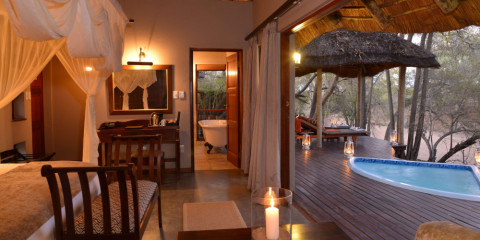
5-Day Imbali Lodge Safari
$2,291 pp (USD)
South Africa: Shared tour (max 9 people per vehicle) Luxury+ Lodge
You Visit: Johannesburg (Start) , Kruger NP, Imbali Concession (Kruger NP) , Johannesburg (End)
The Kruger Safari Co. Tour operator has an office in South Africa
5.0 /5 – 125 Reviews
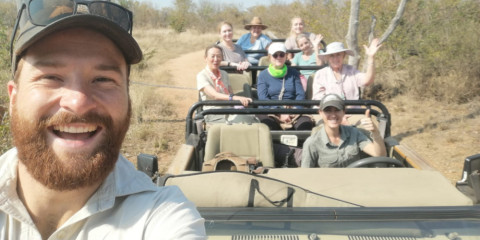
4-Day Orpen Gate to Letaba Camp- Tented Bushcamp Stay
$1,026 pp (USD)
South Africa: Shared tour (max 8 people per vehicle) Budget Tented Camp
You Visit: Hoedspruit (Start) , Balule NR (Greater Kruger) , Kruger NP, Hoedspruit (End)
Wildlife Encounters Tour operator has an office in South Africa
5.0 /5 – 20 Reviews

5-Day 4 Star Panorama Route & Greater Kruger Park Safari
$1,894 pp (USD)
South Africa: Private tour Luxury Lodge & Hotel
You Visit: Johannesburg (Start) , Panorama Route (Highlight) , Greater Kruger, Kruger NP, Johannesburg (End)
Mmilo Tours Tour operator has an office in South Africa
5.0 /5 – 124 Reviews

3-Day Sabi Sand & Kruger Ensuite from/to Johannesburg
$927 pp (USD)
South Africa: Shared tour (max 10 people per vehicle) Mid-range Lodge
You Visit: Johannesburg (Start) , Sabi Sands (Greater Kruger) , Kruger NP, Johannesburg (End)
Wild Kruger Tour operator has an office in South Africa
4.9 /5 – 56 Reviews
Related Searches
- South Africa Safari Tours
- Kruger Tour Operators
- 5-Day Kruger Packages
- Best Kruger Safari Tours
- 6-Day Kruger Safaris From Johannesburg
- 3 Day Kruger Safaris From Johannesburg
- Kruger Safaris From Hazyview
- Timbavati Safari Tours
- Tshukudu Safari Tours
- Klaserie Safari Tours
- Lion Sands Safari Tours
- Addo Elephant Safari Tours
8 Questions About Kruger National Park Safaris

Answered by
Philip briggs.

When is the best time to go on safari in Kruger?
“The best time for Kruger safaris is during the southern hemisphere winter months of May to September, with wildlife-viewing conditions improving throughout this period. Climatically, it is most pleasant during these dry winter months (warm by day, cool by night) and there are fewer mosquitoes, which reduces the risk of contracting malaria. Winter offers the most productive wildlife viewing. This is because the vegetation tends to be lower and thinner, allowing for better visibility, and the lack of rain causes wildlife to gather around permanent water sources. Bird-watchers may arrange their Kruger tours for summer, when large numbers of migrant birds arrive from Europe and many resident species display a colorful breeding plumage. If you don’t like crowds, avoid visiting Kruger during South African school holidays.”
What are the most popular areas in the park?
“Most Kruger safari packages focus on the park’s southern third. Partly this is because it’s the closest section to Johannesburg, and pretty much everywhere else in South Africa, which means it fits most comfortably into a countrywide itinerary. In addition, the south has denser wildlife populations than the north and wildlife tends to be more habituated to cars (and therefore easy to view). There is also a greater choice of rest camps and concession lodges. Probably the most productive and popular game drives in the south comprise a triangle of roads connecting Skukuza, Lower Sabie and Satara, and the two roads running south from Skukuza to Malelane and Lower Sabie to Crocodile Bridge Gate. The popularity of these roads means they can become congested during busy periods such as school holidays, which is when locals tend to visit Kruger.”
Is Kruger good for a self-drive trip?
“Yes, Kruger is arguably the best self-drive safari destination anywhere in Africa. This is due to its easy accessibility, combined with a network of good surfaced roads and well-equipped rest camps, and the ready availability of interpretative material such as maps and dedicated field guides. Self-drivers can either rent a car in Johannesburg or Pretoria and drive to Kruger, or they can fly to an airport within the park or just outside it and pick up a rental car there (by advance arrangement). Self-drivers should bear in mind that cars drive on the left side of the road (like the UK and many former British colonies, but unlike the USA and most of Europe and Asia). You should allow for average driving speeds of around 30km per hour within the park. The speed limit in Kruger is 50km per hour on surfaced roads and 40km per hour on dirt, but you also need to allow time for stops to look at wildlife. Another attraction for independent travelers is that prices for Kruger safaris tend to be very low compared to other major African parks.”
What animals can I expect to see on a Kruger safari?
“All the Big Five (lion, leopard, elephant, rhino and buffalo) are present in significant numbers. However, wildlife viewing in Kruger can be hit-and-miss, so those seeking a Big Five quick fix would be better heading to one of the private reserves that offer expertly guided all-inclusive safari packages. That said, those who allocate a couple of days to their Kruger safari can be confident of encountering large herds of buffalo and elephant, and also stand a good chance of seeing lion, white rhino and, to a lesser extent, leopard and black rhino. Other wildlife commonly seen on Kruger safari trips includes spotted hyena, black-backed jackal, southern giraffe, plains zebra, hippo, warthog, wildebeest, impala, greater kudu, common waterbuck, vervet monkey and chacma baboon. Sightings of cheetah and African wild dog are possible but rare. Birdlife is prolific, with more than 500 species recorded. The park is particularly good for colorful savannah dwellers such as the lilac-breasted roller, yellow-billed hornbill and white-fronted bee-eater. There is also a wide variety of eagles, vultures and other raptors, as well as hefty ground dwellers such as the southern ground hornbill, kori bustard and ostrich.”
How long is the drive to the park?
“Coming from Johannesburg or elsewhere in Gauteng, most of the southern gates lie between 400km/249mi and 500km/311mi to the east, a drive of up to five hours on good surfaced roads. Coming from Kruger Mpumalanga International Airport outside Mbombela (Nelspruit), most of the southern gates lie between 40km/25mi and 100km/62mi away, so allow up to 90 minutes. The most remote gate from Johannesburg is Pafuri, which lies about 620km/385mi to the northeast, a seven- to eight-hour drive on roads that deteriorate as you approach the park. When planning your Kruger holidays in the context of a full South Africa tour, be aware that the park is an astonishing 1,800km/1,118mi from Cape Town using the most direct route, and almost 750km/466mi from Durban.”
What condition are the roads in within Kruger?
“An excellent network of surfaced roads suitable for 2WD cars connects all gates and rest camps in Kruger. This is supplemented by a secondary network of unsurfaced roads, most of which are also suitable for any 2WD car, though some might become problematic after heavy rain. A good map showing the full internal road network can be bought cheaply at any entrance or rest camp gate, and all junctions within the park are signposted for easy navigation. From a wildlife-viewing perspective, surfaced roads often follow busier routes, so taking quieter unsurfaced routes will probably enhance your Kruger vacation.”
Is the park fenced?
“Until a few years back, the entire park was fenced. Today, however, it shares open borders with a number of private reserves that run along the western border, though in most (if not all) cases, these private reserves are fenced along their outward boundary. Fences along the international boundaries with the other two components of the Great Limpopo Transfrontier Conservation Area (namely Limpopo National Park in Mozambique and Gonarezhou National Park in Zimbabwe) are no longer maintained. This allows wildlife some freedom of movement into these neighboring reserves.”
What lodges or camps do you recommend for a Kruger safari?
“For a short Kruger holiday (up to 3 nights), I would concentrate on the far south. My favorite camp there is Lower Sabie, which has a beautiful location on the Sabie River at the heart of several top-notch wildlife-viewing roads. Skukuza, the park’s largest rest camp, is a bit too busy for some, but it’s very well equipped (with everything from ATMs and car-rental outlets to a well-stocked supermarket and restaurant) and has a useful location for exploring some good wildlife-viewing roads. Those able to dedicate more time to a Kruger tour (4 or more nights) could head to the central plains. Satara Rest Camp lies in an area of open savannah where lion and cheetah are often seen. Olifants Camp has a stunning location on a wooded ridge overlooking the eponymous river, and tiny Balule Satellite Camp is ideal for those seeking a remote and super-affordable bush experience. An extended Kruger tour (ideally 7 to 10 days) might also take in the far north, where my favorite rest camps are riverside Shingwedzi and remote Punda Maria. For those seeking more exclusive safari packages, try one of the dozen or so upscale concession lodges scattered throughout the park. These lodges offer a luxurious all-inclusive guided experience similar to the legendary Sabi Sands block of private reserves along the park’s western border.”
Kruger Safari Reviews

Alan is a travel writer and author of over 20 Lonely Planet guidebooks, including the guides to Southern Africa and Zambia & Malawi.
Killing time in Kruger
The mothership of South Africa’s parks, Kruger is more organised and has more variety of accommodation than any other park. It also has a HUGE number of animals with the Big Five and every other kind of five you can think of rustling...
Full Review

Mike is an award-winning wildlife writer, former editor of Travel Zambia magazine and author of the Bradt Guide to Southern African Wildlife.
Africa’s Best DIY Safari
South Africa’s premier wildlife reserve divides opinion. Some who’ve visited supposedly ‘wilder’ parks argue that the Kruger’s developed infrastructure, complete with paved roads and large public camps, undermines the wilderness...
The parks we visited during our stay were varied. The first evening safari we didn’t see the animals we hoped. However the full day drive the following day made up for this. We saw everything we hoped to, mainly the Hippis and Giraffes....
It is everything that thousands of others have experienced. It is soo big that it would take weeks to discover each region, but we were thankful for seeing the best that we could in a limited timeframe.
Brilliant glamping experience. The safari tour guide was knowledgeable and we managed to spot the animals. The glamping staff were friendly and they kept the facilities clean. This was a girls trip and we felt safe throughout our stay....

Once in a life time unforgetable experiance . All staff members were very helpful +HIGHLY capiable.
Viva Safaris kept to their programme, Bushwalk, Great Kruger Safaris with very well trained, friendly guides, Sunrise and Sundown safaris (Bush Braai was unbelievable crowned with an Amarula Liquer Toast). The safari jeeps accomodated very...

Private Vehicle Morning Safaris
Private vehicle afternoon safaris, private vehicle full day safaris.
- 3 Day Best of Kruger Safari
- 4 Day Best of Kruger Safari
- 4 Day Kruger and Panorama Safari
- 5 Day Kruger and Panorama Safari
3 Day Best of Kruger Private Safari
- 4 Day Kruger and Panorama Private Safari Tour
- 5 Day Kruger and Panorama Private Safari Tour

3-4-5 Day Kruger Safari Packages
Rated on TripAdvisor as leading Kruger Safari packages with 1564 – 5 Star Reviews / Departing Johannesburg every Monday – Wednesday – Saturdays

Private Kruger Safari Packages

4 Day Private Kruger and Panorama Safari

5 Day Private Kruger and Panorama Safari
Private kruger day safaris.

Trip Advisor Reviews
Explore our range of specialized tours.
Choose a private safari for a personalized and exclusive wildlife experience with your own guide and vehicle, offering flexibility and intimacy in exploring Africa’s incredible wildlife.
Choose from our range of private Safari packages that including options for couples, family safaris, and fly-in safaris.
Customize your adventure to match your preferences, whether you’re seeking a romantic getaway, an exciting family experience, or a luxurious fly-in safari.
Experience a variety of safari options, complete with all the expected comforts and inclusive of conservation fees, making our Kruger Park safaris a cost-effective choice for your thrilling adventure.
SATSA Accredited
Being a SATSA accredited company means we are committed to adhering to and governed by the regulations established by the South African Tourism Services Association.
Professional
From booking your accommodation to planning your day trips into the Kruger National Park in the company of one of our tour guides, Kurt Safari will do it all for you.
In order to guarantee the finest possible African experience during your stay, we make it a priority to offer our guests round-the-clock support.
We cherish the African wilderness we call home, and our entire team, including guides and consultants, are local residents living near Kruger National Park.
With more than 20 years of experience
With over two decades of experience guiding guests through the magnificent Kruger National Park, Kurt Safari stands out as South Africa’s premier Kruger National Park safaris tour operato r . Our range of Kruger National Park safari travel packages caters to clients seeking an authentic African safari experience, where rustic adventure meets modern comfort. Every aspect of our Kruger Park safaris and tours is meticulously tailored to accommodate various budgets, preferences, and tastes.
Our Kruger Park safaris offer options for both budget-conscious travelers and those looking for a touch of luxury. Guests not only have the opportunity to explore the best of Kruger National Park along its most wildlife-rich routes but also to discover some of the region’s most fascinating and beautiful attractions.
Guided by trained and passionate guides, guests can enjoy up to 9 hours of safari time in the Kruger National Park on our Full Day Safaris, a longer duration compared to most other companies. We use comfortable open-air safari vehicles, providing guests with a remarkable bird’s-eye view of the wildlife encounters.
The majority of our private Kruger Park safaris and tours take place in the wildlife-rich Southern Kruger region, home to the renowned Big 5 – Lion, Elephant, Buffalo, Leopard, and Rhino, as well as herds of zebra, wildebeest, and a plethora of bird species, with over 148 mammal species residing in the Kruger National Park.
Kurt Safari offers a range of Kruger National Park safari packages, including 3, 4, 5, and 8-day options, including Photographic and Birding safaris led by experienced guides.
Booking any of our Kruger Park safaris is easy through our website. You can choose the package that best suits your needs, book directly online, and make secure payments. Alternatively, feel free to reach out to us to speak with one of our knowledgeable consultants.
Our base is in Hazyview, just a short 15-minute drive from the Kruger National Park. Our consultants, guides, and management team are primarily locals with a deep understanding of the Kruger National Park and its wildlife. They can provide you with valuable insights that you won’t find online, ensuring a memorable holiday.
For clients on overnight Kruger Park Packages, we arrange stays at quality private lodges, a short 10-15 minute drive from the Kruger National Park. These lodges offer top-notch quality, including Wi-Fi, breakfasts, and dinners, combined with air-conditioned accommodations, enhancing your safari experience.
Kurt, the Director of Kurt Safari, has guided Kruger Park safaris for nearly 12 years before founding our company. We are now rated as the leading safari operator on TripAdvisor. Our packages have been personally designed after years of trial and error, with a focus on quality guiding and safety, complemented by amenities such as quality accommodation, fantastic meals, and an affordable and memorable experience.
We look forward to welcoming you to Kruger and hope you enjoy your Kruger Park safari with us.
Welcome to Krugersafaris.com, where you can explore a range of affordably priced safaris in Kruger Park, along with valuable travel information.
Embark on your adventure with us.
Krugersafari.com stands as one of Kruger’s premier tour operators, with over two decades dedicated to welcoming guests from around the globe to partake in the ultimate Kruger Park safari experience.
We offer a diverse range of exceptional Kruger safaris for our clients to select from. Each safari is conducted in an open safari vehicle and led by one of our experienced guides, each with years of expertise in guiding tours through the Kruger. Our safari packages are meticulously crafted to ensure you have an unforgettable time in our beautiful country. Recognizing that for many of our guests, a visit to the park is a once-in-a-lifetime adventure, we strive to make our Kruger Park safaris as enchanting, captivating, and memorable as possible. Whether you’re seeking a single-day excursion or a 3-day, 4-day, or even 5-day adventure in the Kruger, we have the perfect tour for you. Our offerings include shared safaris, private Kruger Park safaris, and packages for those interested in exploring the Panorama Route and the Kruger National Park.
Enhancing your Kruger Park experience is the newly introduced Umbhaba Eco Lodge, offering world-class service and quality, complete with en-suite air conditioning. In cases where Umbhaba Eco Lodge is fully booked, we utilize the Sanibonani Lodge in Hazyview.
The Krugersafari.com Experience
A journey to the park with us promises a relaxed experience, and our well-organized itineraries and inclusions in each tour ensure you are well taken care of and in excellent company.
Our guided tours are competitively priced and efficiently arranged, with accommodation included in each overnight package, the style of which varies based on the Kruger tour you choose.
We specialize in small guided group Kruger Park safaris, and with daily departures from Johannesburg to Hazyview, you can arrive in the city in the morning and be enjoying the Kruger in the afternoon! Our Kruger safaris are perfect for both local and international visitors.
Each safari vehicle is open, providing excellent visibility to easily spot animals amidst the wild vegetation. This exceptional visibility makes our safaris ideal for both aspiring and seasoned photographers looking to capture unique shots. For those seeking a more photography-focused safari, explore our custom photographic safaris.
The Kruger National Park unquestionably ranks as the best place in South Africa to encounter the Big 5: Lion, Leopard, Elephant, Rhino, and Cape Buffalo. A day trip to the park is sufficient to spot these iconic animals and more. Keep in mind that when exploring the Kruger, you never know what awaits around the next bend in the road! The Kruger boasts an incredibly diverse array of wildlife species, along with hundreds of bird and reptile species.
While we offer a wide array of Kruger Park safaris and thrilling game drives for our guests to choose from, we are also more than willing to customize a package to fulfill all your wildest safari dreams! We always go the extra mile for our guests, understanding the profound impact a real African safari can have. Our accreditation with SATSA ensures that the safari you book will meet all your expectations, providing a safe, reasonably priced, and one-of-a-kind experience. Each of our safaris promises to deliver the African adventure you desire.
You can find pricing details for our best-selling Kruger Park safaris on our website.
If you have any questions about our tours, please feel free to reach out to our helpful team based in Hazyview. You can also visit TripAdvisor to peruse our latest reviews.
We eagerly await the opportunity to welcome you to the African continent. You can book your safari through our website or contact us via email.
Essential information for kruger park safaris.
The magnificent Kruger National Park stands as one of South Africa’s most beloved and iconic landmarks. Every year, this conservation reserve warmly welcomes numerous visitors from around the globe. Many of these guests embark on various Kruger Park trips or opt for a self-driven adventure through the park, all seeking the serene solitude that can only be found in the wild. However, it’s not just the tranquility that draws visitors to the park; it’s the captivating wildlife.
Credit goes to Paul Kruger, the former president of the now-defunct Transvaal Republic, who dedicated himself to setting aside a portion of Transvaal for the preservation of animals. Without his tireless efforts, the park’s inhabitants would have long vanished from the landscape. In 1898, when the park was initially established, hunting was rampant, and trophies of big game like lions and elephants were highly coveted by foreign visitors. To safeguard the local wildlife from complete extinction, the park was designated as a no-hunting zone, and it remains one of the world’s oldest and largest conserved areas to this day.
Today, we enjoy the fruits of the wisdom and foresight of those who came before us. A Kruger Park safari is an unforgettable experience, and it’s more affordable than you might imagine. Initially, tourists didn’t enter the park; however, around 1927, the first paying visitors were permitted to explore it. In those early days, there were no accommodations inside the park, so visitors had to exit before sunset.
As time passed and transportation methods evolved, more tourists began arriving, and accommodations were developed to allow them to stay overnight. Entry fees were never excessively high, earning the park a reputation as the “People’s Park,” a place where anyone could experience the wonders of conservation. Today, even a 7-day safari is quite budget-friendly, and there’s always the option of a self-driven adventure through the park.
Booking a Kruger Park safari or a Kruger Day Tour has never been easier. A quick online search will yield a plethora of options, many of which are offered by reputable safari companies like ours. Why choose to book a safari instead of going for a self-drive? Well, in reality, it requires less planning and can save you a few bucks (pun intended).
The Establishment of an Iconic Conservation Park
Although the Kruger National Park was officially declared in 1898, it wasn’t until 1927 that it was officially named the Kruger National Park and opened its gates to tourists. Those early years were quite intriguing, as tourists would traverse the park on a train, providing limited visibility of the wildlife. The route was fixed and unchangeable, but it was considered the safest way for early visitors to experience the park. These were the days before the advent of the automobile, so it’s easy to imagine how the park’s accessibility changed after cars became commonplace.
By 1928, a board of directors was overseeing the Kruger Park, and it was determined that in order to make the park more accessible to visitors, overnight accommodations were needed. The park’s first rondavels, round-hut-style accommodations that have since become synonymous with the park, were constructed at Skukuza, Pretoriuskop, and Satara. As more and more guests flocked to the park, additional accommodations were added for their convenience, while the former ranger lodgings were also converted into unique guest accommodations.
For those who have researched South Africa and the Kruger Park in particular, it’s well-known that the summers in the region can be exceptionally hot and humid. One can sympathize with the park’s earliest overnight guests who grappled with the challenge of staying cool. In fact, staying overnight in one of the rondavels was not a popular choice in those days. While it was a novelty, the heat was often unbearable, and mosquitoes were a constant nuisance that couldn’t be kept out. These days, rondavels are equipped with fans, and some even have air conditioning. Additionally, in those early days, the accommodations did not provide complete isolation from the wilderness. As the park expanded and construction progressed, guests gained more protection from the wildlife and access to ablution blocks where they could bathe or shower.

The Flora and Fauna of Kruger National Park
While the park’s wildlife is the primary attraction for visitors, the plant life in the area is equally as captivating as the animals. The flora within the park is incredibly diverse, and the park is divided into four distinct regions, each characterized by its unique plant species.
- Thorn Trees and Red Bush-Willow Veld Located in the western and central parts of the park, just south of the Olifants River, this region is dominated by red bush-willow and acacia (thorn) trees. Marula trees are also abundant in this area, while acacia trees line the rivers and streams. The Nwatimhiri Bush and areas along the Sabie River are particularly dense with vegetation.
- Knob Thorn and Marula Veld South of the Olifants River and to the eastern part of the park, you’ll find the knob thorn and marula veld. This region offers ample grazing grounds and is characterized by red grass, buffalo grass, knob thorn trees, and marula trees, making it an essential part of the park’s ecosystem.
- Red Bush-Willow and Mopane Veld In the northern part of the park, west of the Olifants River, the predominant vegetation consists of red bush-willow and mopane trees.
- Shrub Mopane Veld The northeastern part of the park is predominantly covered by mopane trees.
It’s important to note that these regions host a wider variety of plants and trees than those mentioned above. The abundance of these trees and bushes contributes to the naming of the areas, and each region plays a crucial role in supporting the park’s diverse wildlife.
Notable Wildlife and Conservation Efforts
Kruger National Park is renowned for being home to the Big 5, which includes lions, leopards, elephants, rhinos, and buffalos. While these iconic animals are a major draw for Kruger visitors, the park also houses a broader array of species than any other park on the African continent, totaling 147 species of animals. In addition to numerous predators and large animals like elephants, the park is home to a variety of antelope species such as kudu, impala, nyala, and eland. Furthermore, the park serves as a sanctuary for endangered and rare species, such as the wild dog, underscoring its importance in wildlife conservation.
Anti-Poaching Measures
Due to the presence of numerous endangered species within the park, extensive efforts have been in place for many years to combat poaching. Anti-poaching units are equipped with cutting-edge prevention tools, including night vision technology and advanced telescopes. Game rangers, law enforcement officers, and military personnel have all actively participated in the campaign to curtail poaching activities. While there has been a reduction in poaching incidents, animals, particularly rhinos, remain under constant threat.
While elephants are sporadically targeted by poachers, it is the rhinoceros that often makes headlines. Poachers enter the Kruger National Park during full moon nights, targeting both black and white rhinos for their valuable horns. These horns can fetch approximately $66,000 per kilogram on the black market. Despite bans on horn trade in most countries, these restrictions have had limited impact on deterring illegal activities.

Exploring the 12 Principal Camps of Kruger National Park
Kruger National Park offers a multitude of reasons to visit, and among them is the rich history and warm hospitality found in each camp. The park is a laid-back haven, where even the bustling main camps exist in their own tranquil bubble, far removed from the modern world. Before delving into discussions about the park’s historical significance, its incredible wildlife, or the safari experiences it offers today, let’s take a closer look at each of the 12 main camps.

Located in a mountainous area, Berg-n-Dal is a unique camp that has preserved its natural environment and habitat. Dry riverbeds run along its southern and northern borders, and the camp boasts large trees. Wildlife enthusiasts can spot creatures like wild dogs, klipspringers, and leopards near the camp. Berg-n-Dal is one of the newer camps in the park, offering a range of facilities and comfortable accommodations.
Crocodile Bridge
As one of the smaller camps in Kruger National Park, Crocodile Bridge takes its name from the nearby Crocodile River. It’s an excellent spot for game viewing, especially along the Southern Circle, where lions are frequently sighted. Other animals in the area include kudu, giraffes, spotted hyenas, and cheetahs. This camp has garnered multiple nominations as the best camp in the park.
Letaba is ideally situated at the park’s midpoint, acting as a bridge between the north and south. Its name means “River of Sand,” and it’s renowned for its elephant sightings. The area around Letaba is lush and green, bursting with nighttime activity, including bats, owls, nightjars, frogs, and cicadas. It’s a prime spot for observing elephants and bushbucks.
Lower Sabie
Lower Sabie sits on the banks of the Sabie River, offering a serene and laid-back atmosphere. The camp is well-known for its majestic trees, making it an ideal location for leopard sightings. Other animals that frequent the area include hippos, lions, and various antelope species. Lower Sabie provides excellent accommodations.
Mopani camp is surrounded by Mopani trees and features a massive baobab tree at its center. The camp’s vegetation is left in its natural state, and wildlife enthusiasts can spot hippos, waterbucks, and tsessebes. The camp borders Pioneer Dam, attracting animals for afternoon and morning water breaks.
Olifants is renowned for its breathtaking views, perched high on a hill above the Olifants River. The camp is surrounded by viewing platforms that offer an excellent vantage point for observing wildlife near the water below. Animals like crocodiles, lions, elephants, and hippos can be spotted here. The camp also offers great accommodation options and a picturesque picnic area.
Orpen, along with its satellite camps Maroela and Tamboti, enjoys a strategic location. The camp is named after Eileen Orpen, the land’s owner who donated it to the park. This grassy area is ideal for observing grazing animals, and the surrounding open plains are home to numerous lion prides. The night air resonates with the roars of lions, creating an unforgettable experience. Orpen offers diverse wildlife sightings, including the Big 5, wildebeests, and jackals.
Pretoriuskop
Nestled among ancient granite rocks, Pretoriuskop is home to fascinating granite boulders. As one of the park’s oldest camps, it retains a historical charm in its layout and style. The camp is known for sightings of Sable antelopes, Lichtenstein’s Hartebeests, wild dogs, and kudus. Its proximity to one of the park’s entry points makes it a popular choice for visitors.
Punda Maria
Punda Maria, located in the park’s northernmost region, experiences scorching temperatures even during winter. It boasts a unique sandveld habitat with diverse plant life, earning it the nickname “botanical gardens of the park.” Wildlife enthusiasts may encounter nyala, wild dogs, and zebra herds. Punda Maria is an ideal destination for those seeking tranquility.
Satara was one of the first camps to build rondavels, offering overnight stays to interested guests. Today, it’s a bustling camp renowned for excellent game viewing opportunities. Nestled in a wooded area, Satara is considered rustic and a haven for birdwatchers. Visitors can spot lions, giraffes, wildebeests, and the elusive honey badger.
Shingwedzi, another camp in the park’s northern region, is celebrated for wildlife sightings, including nyala, waterbucks, and elephants. The scenic route along the Shingwedzi River provides access to the camp. With its rustic charm and limited modern conveniences, Shingwedzi offers a true break from the ordinary. The camp’s sparser vegetation makes wildlife spotting easier.
Skukuza is often saved for last on our list, serving as the capital of Kruger National Park. It’s the central hub where day visitors typically stop for lunch. Situated along the Sabie River’s southern banks, Skukuza boasts multiple lookout points and a tranquil atmosphere. Visitors can encounter animals such as spotted hyenas, bush babies, and warthogs. The camp also offers a range of accommodations and modern conveniences.
Each of these main camps provides a unique experience and a glimpse into the rich tapestry of Kruger National Park.
Additionally, the park features satellite camps, bushveld camps, overnight hides, bush lodges, luxury lodges, and campsites to cater to various preferences and interests.
Exploring Kruger National Park from the comfort of an open safari vehicle remains a highly popular way to experience the park. It allows guests to get up close to nature while ensuring their safety. With the wind in your hair and the captivating sounds of Africa all around, a safari in an open vehicle will create lasting memories. Additionally, it provides excellent opportunities to capture stunning photographs.
At Kurt Safari, we provide some of the most competitively priced Kruger National Park safari experiences. We offer private Kruger National Park tours and day tours, giving guests various options to consider when planning their visit to the park. Don’t hesitate to book your tour with us today.
Commonly asked questions about kruger national park, is a kruger national park safari the finest african safari experience.
The Kruger National Park stands as a renowned and captivating tourist destination in South Africa. This wildlife sanctuary is globally acclaimed for its rich assortment of animals, diverse biomes, and plant life. Its establishment dates back to May 1926, thanks to the dedicated efforts of game warden James Stevenson-Hamilton and the late President Paul Kruger. The Kruger National Park came into existence through the merger of various lands and the Sabi Sand Game Reserve, forming the expansive park we know today. Its primary purpose has always been the conservation of Lowveld animals.
Within the Kruger National Park resides an astonishing array of animal, plant, and bird species. It boasts some of the world’s largest and swiftest creatures, such as the African Elephant, Cape Buffalo, White and Black Rhinos, and lions, all of which draw visitors from around the globe. The park’s location in the Lowveld region offers a surprising diversity of biomes. Each of these biomes features remarkable variations in terms of animals and plant life. Travelers can traverse sandy and arid areas with resilient plants, sparser landscapes, and animals adapted to the hot and unique environment. Further exploration leads to lush savannah bush with abundant water, trees, and plant species.
Due to its vastness and diversity, every visit to the Kruger National Park promises a unique experience. Some days, guests may witness the Big 5 within a few hours, while on other days, they might encounter zebras and impalas. This unpredictability is what makes the Kruger Park a beloved and frequently visited destination, offering spontaneous and thrilling adventures.
Embarking on safaris within the Kruger National Park is an excellent way to immerse oneself in its wonder and beauty. Knowledgeable guides can lead guests to various exceptional areas, share informative and fascinating insights, and enhance their understanding of the park. These guides are well-trained and deeply passionate, which reflects in the exceptional treatment guests receive during safaris.
Kurt Safari proudly holds the title of the No.1 Rated Kruger National Park Safari Company. We offer high-quality and affordable 3-4-5 Day packages and day safaris led by experienced guides. The park’s vast expanse, coupled with its breathtaking landscapes and an astounding variety of animal species, is incredibly inviting. The Kruger National Park is steeped in captivating history and compelling stories that captivate and entertain individuals of all ages and interests. Safaris in the Kruger create indelible memories, often leaving guests with lasting impressions of adventure in one of South Africa’s wildest and most diverse places.
With numerous ways to explore and experience the Kruger National Park, the ease of booking a safari, and the friendly and helpful nature of the guides, embarking on a Kruger Park Safari is a decision you’ll never regret.
Is Kruger National Park a Hazardous Destination?
Kruger National Park enjoys global acclaim for its incredible wildlife, picturesque landscapes, and rich history. Every day, thousands of people visit the park, eager to explore its offerings. The Kruger Park boasts numerous captivating sights, including scenic hilltop camps with river views, lookout points near rivers or watering holes, and picturesque clearings by the roadside. Visitors have the opportunity to encounter animals throughout the park, which also means the possibility of interactions and potential risks, both with wildlife and fellow humans.
Among the notable dangers:
African Elephants: While these gentle giants are usually passive, they can become agitated and defensive when their calf is present. Elephants have a strong maternal instinct and will protect their offspring at all costs. Agitated elephants may provide warnings before attacking, but danger arises when separating the calf from its mother or when there is limited space to move. Fortunately, elephant attacks are not common occurrences.
Buffaloes: Buffalo herds pose a greater threat than elephant herds. When provoked, buffaloes can attack without warning. They are social animals that often defend themselves in groups. When a vehicle threatens the herd, they may charge or stampede, causing chaos and a serious danger to all involved. Buffaloes have been known to damage vehicles and harm people.
Hidden dangers include:
On-Foot Dangers: Guests walking in the Kruger, whether on a bushwalk or within rest camps, may encounter hidden dangers such as snakes and spiders. The park is home to 152 spider species, including potentially dangerous ones like the Button Spider, Sac Spider, and Violin Spider. When on foot, guests should also be cautious of snakes, which can seek shelter in various places and strike without warning when threatened.
Curious Vervet Monkeys: Some park residents, like Vervet Monkeys, are curious and may come into close proximity to humans. These clever animals travel in large troops and are commonly found near rest camps where they can access trash cans and fresh food. Vervets may enter people’s accommodations and can become aggressive when cornered or injured. A troop of Vervet Monkeys can pose a danger to both visitors and themselves.
In summary, while the Kruger National Park offers incredible wildlife encounters, visitors should be aware of potential dangers and exercise caution. It’s crucial to respect the park’s wildlife and follow safety guidelines to ensure a safe and enjoyable experience.
What is the price of a Kruger National Park safari?
Kruger National Park stands as the top tourist destination in South Africa. Its immense size, abundant wildlife and plant species, along with exceptional photography opportunities, make it a must-visit when traveling to South Africa. Many international visitors may not be fully aware of what to expect and the associated costs during their stay at Kruger National Park.
The overall cost of your safari experience in Kruger largely depends on your preferences and activities. Entrance fees to the park can vary based on your nationality. South African citizens pay R200 per adult and R50 per child, while international guests are charged R400 per adult and R200 per child. In addition, all visitors, regardless of nationality, must pay daily conservation fees of R400 per adult and R200 per child.
Visitors have the option of embarking on a self-drive safari, where they take charge of their entire adventure, from driving around the park to creating their own schedule. Self-drive safaris are popular among those who wish to explore Kruger National Park at their own pace, spend quality time with family and friends, and avoid strict schedules. The costs associated with a self-drive safari typically include entrance and conservation fees paid at the gate, fuel expenses, funds for food and snacks during the day, and money for souvenirs. Accommodation, if needed, is a separate cost and can sometimes be relatively expensive.
Alternatively, there are numerous safari companies that offer guided tours, providing a wide range of experiences at varying costs. Many of these companies offer 3/4/5-day safari packages, catering to different budgets. These packages can range from budget-friendly options to more luxurious tours that include meals. It’s essential to research different safari companies to find one that aligns with your preferences and budget. For guests opting for a 3/4/5-day safari, accommodation costs are usually included in the tour package, allowing them to focus on the experience rather than worrying about where to stay.
Safari experiences with a tour company offer the advantage of exploring more of Kruger National Park while being guided by experienced tour guides who provide valuable insights about the park and its wildlife. Guides keep track of animal sightings, ensuring reliable and exciting tours. On the other hand, self-drive safaris provide a relaxed and cost-effective alternative, allowing guests to spend the entire day making memories with family and friends at their own pace. Newcomers to Kruger Park are encouraged to consider guided tours, especially if they are not familiar with the park’s landscape and surroundings.
Which Kruger National Park Camps are considered the finest?
The Kruger National Park is enveloped by an incredibly diverse landscape, featuring a wide range of biomes that house distinct plant life, climates, and wildlife. Given its extensive size, the park offers numerous opportunities for visitors to take a break, enjoy meals, cool off, and find accommodation after a day of exploration. Throughout the Kruger Park, there are a variety of unique rest camps, tent camps, and lodges designed to accommodate and meet the expectations of any traveler.
Indulgent Retreats: Within the Kruger National Park, there are numerous exceptional rest camps, each offering unique features that set them apart. If you seek central access to the park, luxurious accommodation options, breathtaking scenery, and a wealth of amenities like a cinema, library, and restaurants, Skukuza is an ideal destination. Satara, located right in the heart of lion territory, is renowned for its prime location. Guests are virtually guaranteed to encounter numerous lion prides while visiting this area and staying at the camp. Satara Camp has a rustic charm and is not as bustling as Skukuza, providing the luxury of a modern camp combined with the tranquility of a smaller rest camp.
Elephant Haven: Elephants are a major attraction in the Kruger Park, making an area known for spectacular elephant sightings immensely popular. Olifants Camp is situated atop a hill, offering unparalleled views. The camp is celebrated for its breathtaking vistas and is often considered one of the finest camps in the Kruger. Its peaceful ambiance and reputation as an elephant hotspot make it a unique and highly regarded choice for accommodation.
Secluded and Serene: For those who prefer a lighter, more minimalist experience, there are plenty of rest camps that offer excellent camping opportunities. Berg en Dal is one of the larger camps in the Kruger, but its location in a hilly area surrounded by dry riverbeds creates one of the most serene and relaxed places to spend the night. Some of the best camping spots are situated near the camp’s fences, providing unobstructed views of the Kruger’s natural beauty, free from the interference of buildings and trees. Balule, located close to the center of the Kruger Park, is the second smallest camp in the park. Despite its proximity to Satara, Balule is a preferred choice for those seeking peace and solitude. Balule is a satellite camp without electricity, where the kitchen operates on gas, and it boasts spacious areas that offer less shade but more opportunities for stargazing. The camp is frequently visited by hyenas and elephants that patrol the low fence, allowing guests to feel truly immersed in nature during their stay at Balule Satellite Camp.
What wildlife can be observed in Kruger National Park?
Kruger National Park is home to a diverse array of mammal, bird, and plant species. Its establishment dates back to May 1926, but even before that, the Sabi Sand Reserve was dedicated to conserving Lowveld wildlife. When Kruger National Park was founded, it was declared a sanctuary where no animals were to be hunted.
The Lowveld region is renowned for its unique mammal species, many of which are exclusive to this area. Among the notable mammals in the park, Lions take the spotlight as the second-largest cat species globally and the largest in South Africa, second only to the Tiger. Lions are highly social creatures, often found in large prides comprising a dominant male, juvenile males, numerous lionesses, and their cubs. Another sought-after cat species in the park is the elusive Leopard, known for its solitary and secretive hunting behavior, blending seamlessly into the savannah vegetation. The Cheetah, the world’s fastest land animal, surprises many safari-goers with its appearance, resembling a Leopard but with a more slender build and smaller spots. Other lesser-known and rarer cat species in the park include the Rooikat, Wild Cat, Serval, and Caracal, which are solitary and often nocturnal hunters.
Antelopes are a predominant presence in Kruger National Park and are usually among the first animals encountered upon entering the park. The common Impala is a highly social species found in large herds, often mingling with Zebra and Buffalo herds. Known as the “McDonald’s of the Kruger” due to their abundance, Impalas are easy prey for many predators. Other notable antelope species in the park include the Kudu, which serves as a symbol of Kruger National Park, and the Eland, the world’s largest antelope species. These magnificent antelopes are highly prized in hunting reserves but are protected within the park.
Among the park’s largest animals are the African Elephant, renowned for its majestic herds and strong maternal instincts. It is the largest and heaviest land animal globally. The Black and White Rhinos, while popular, face severe threats from poaching, and their populations have significantly declined. Other notable giants in Kruger include the Cape Buffalo and the Blue Wildebeest, commonly found near water sources and interacting with Zebra and Impala herds. While mostly passive, they can be dangerous if provoked.
The variety of animals in Kruger National Park is astonishing. Zebras are a delight to observe as they socialize with Impalas and engage in unique interactions. Wild Dogs, although rare, are highly sought-after animals often on the wish list of safari-goers. Hyenas are more active in the afternoon and can be recognized by their distinctive calls. Giraffes are a fun encounter, though sometimes challenging to spot amid the trees. They travel in small herds, making a memorable sighting nearly guaranteed during your adventure in Kruger Park.
What bird species can be observed in Kruger National Park?
While Kruger National Park is renowned for its diverse mammal and reptile species, the rich variety of bird species within the park often goes unnoticed. Yet, the park offers exceptional opportunities for birdwatching, attracting enthusiasts with thrilling sightings.
One of the most iconic and sought-after birds in Kruger National Park is the Bateleur Eagle. This striking bird is frequently spotted perching in trees near sandy areas of the park, delighting birdwatchers on Kruger Park Safaris. Another common sight at rest camps is the Greater Blue Eared Starling, a beautiful blue bird often seen flying close to people in search of food scraps. The park is also home to a variety of eagle and hawk species, including the Bat Hawk, Hawk Eagle, and Crested Eagle, among others.
A well-known avian resident of the Lowveld is the African Fish Eagle. Its distinctive call often precedes its appearance as it soars through the skies. This majestic raptor is frequently seen near bodies of water capable of sustaining it. Their sizable nests, averaging 2 meters in diameter and a meter deep, are often found in trees near watering holes. African Fish Eagles may have multiple nests that they visit when food is scarce in a particular area. Another bird closely associated with Kruger National Park is the humble Helmeted or Spotted Guinea Fowl. These small birds are commonly observed in small flocks in rest camps, picnic areas, and along roadsides, particularly in the mornings. Local lore suggests that Guinea Fowls should only be eaten during months without an ‘R’ in their names, such as May, June, July, and August.
A group of birds, known as the “Big 6” of birds, mirrors the concept of the Big 5 mammals. This group includes the Kori Bustard, recognized as the world’s heaviest flying bird; the Martial Eagle, strong enough to knock an adult off their feet; the Leppetfaced Vulture, Africa’s largest vulture; the Pel’s Fishing Owl, often referred to as the leopard of the group due to its rarity; the Saddle-billed Stork, known for its vibrant plumage; and the Southern Ground Hornbill.
Kruger Park also hosts numerous common bird species commonly found in the Lowveld region. Birds like the Hadida, Hammerhead, Hoephoep, Kingfishers, Woodpeckers, and the Piet-my-Vrou are frequently seen throughout the park, providing a sense of familiarity and comfort to many visitors.
Discover Southern Africa?
Southern Africa offers a diverse and stunning landscape, from shifting red desert sand dunes to lush green forests teeming with life. Travelers to this region have the opportunity to embark on an unforgettable journey to some of its most coveted destinations, including Cape Town, the Garden Route, and Namibia. These tours are conducted in groups and led by experienced guides who are well-acquainted with the routes, top attractions, and hidden off-the-beaten-path adventures.
Whether you opt for a Namibia tour, a Cape Town exploration, or a Garden Route adventure, each journey is infused with a blend of history, discovery, and enjoyment. Don’t forget to pack your hiking boots and a quality camera to capture the memories of this remarkable trip.
The featured tours encompass essential elements like accommodation, entry fees to various attractions listed in the itinerary, comfortable transportation throughout the tour, and a few added surprises. To gain a more precise understanding of what each tour entails, we recommend thoroughly reviewing the details of each offer.
With a wide array of Southern Africa tours available, you can easily find and book the one that suits your preferences through our website. If you encounter any challenges in selecting the right tour for your needs, feel free to reach out to us directly for a conversation with one of our consultants.

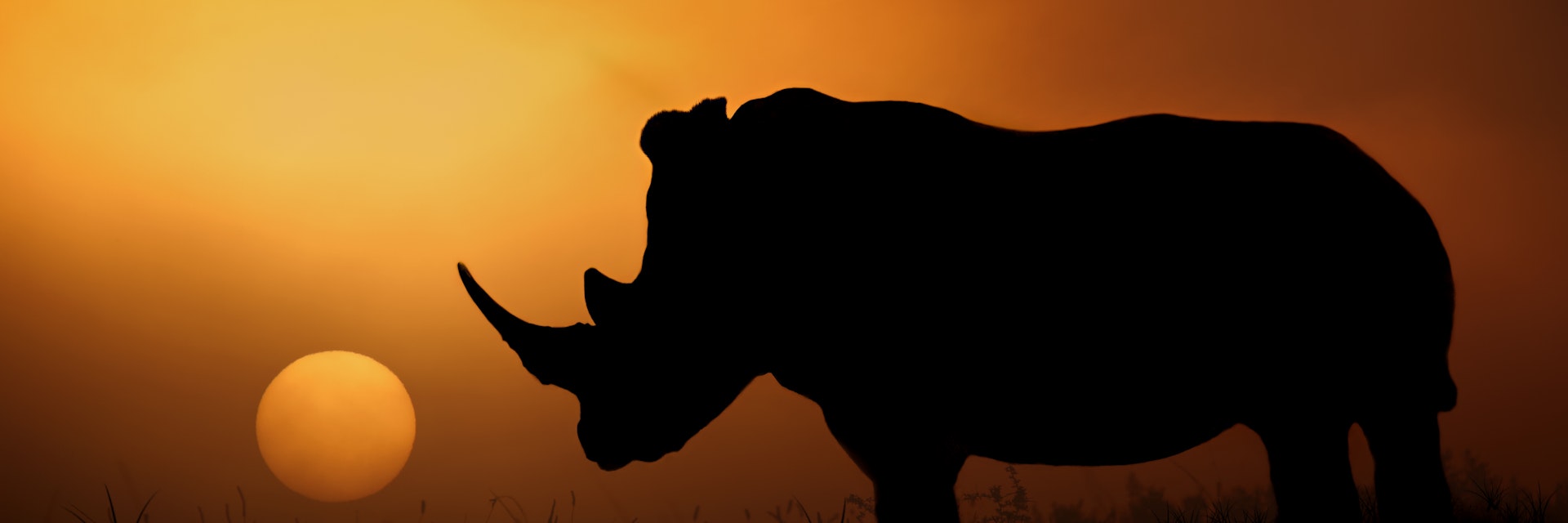
Kruger National Park
Kruger is one of the world's greatest wildlife-watching destinations. All of Africa's iconic safari species – elephant, lion, leopard, cheetah, rhino, buffalo, giraffe, hippo and zebra – share the bushveld with a supporting cast of 137 other mammals and over 500 varieties of bird.
Leave the planning to a local expert
Experience the real Kruger National Park. Let a local expert handle the planning for you.
Attractions
Must-see attractions.

Elephant Hall Museum
Even if you're not staying at Letaba Rest Camp, it's worth swinging by to check out this excellent museum. It has life-size skeletons and dozens of…
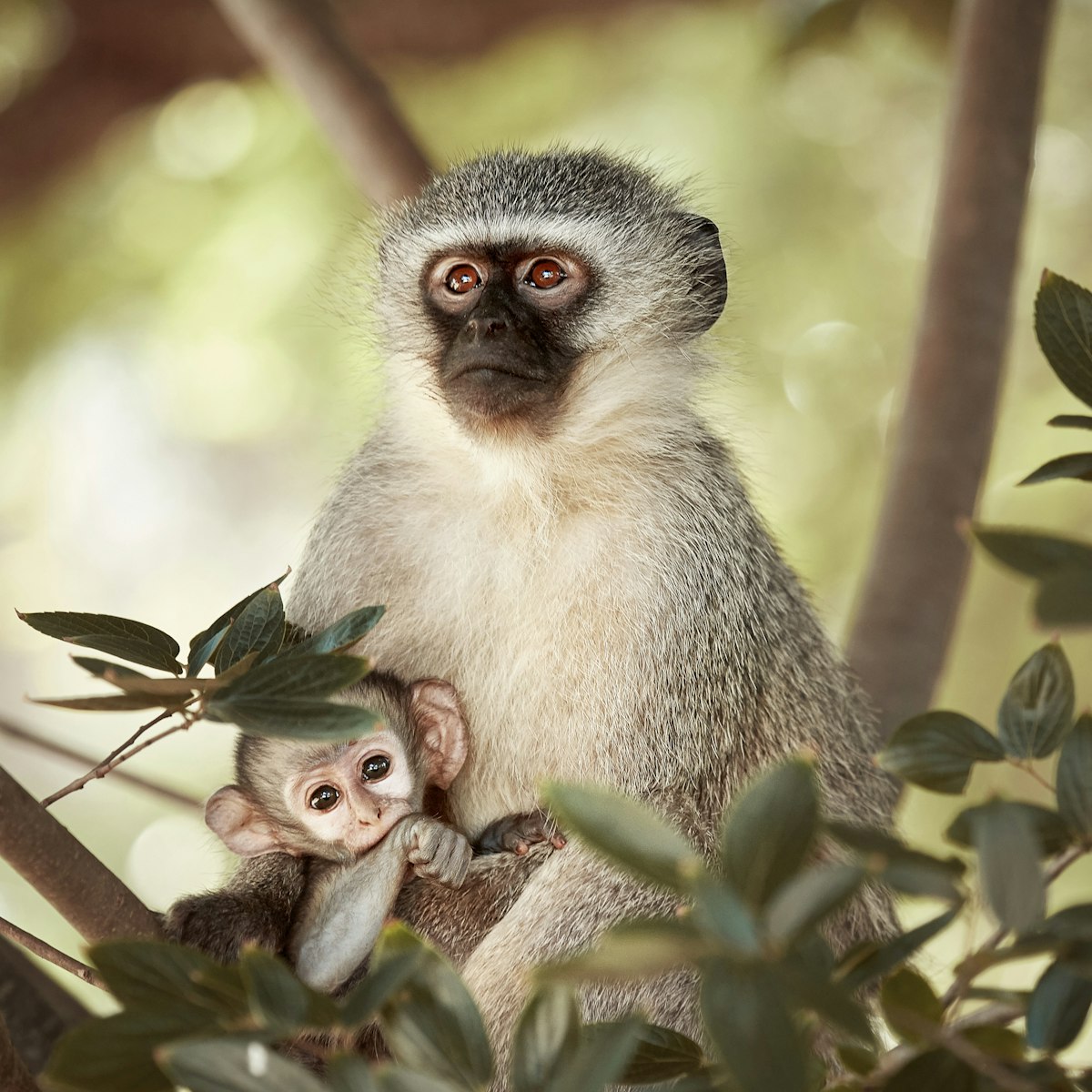
Sabi Sand Game Reserve
Within the borders of the large Sabi Sand Game Reserve are some of Southern Africa’s most luxurious safari lodges and the best wildlife watching on the…
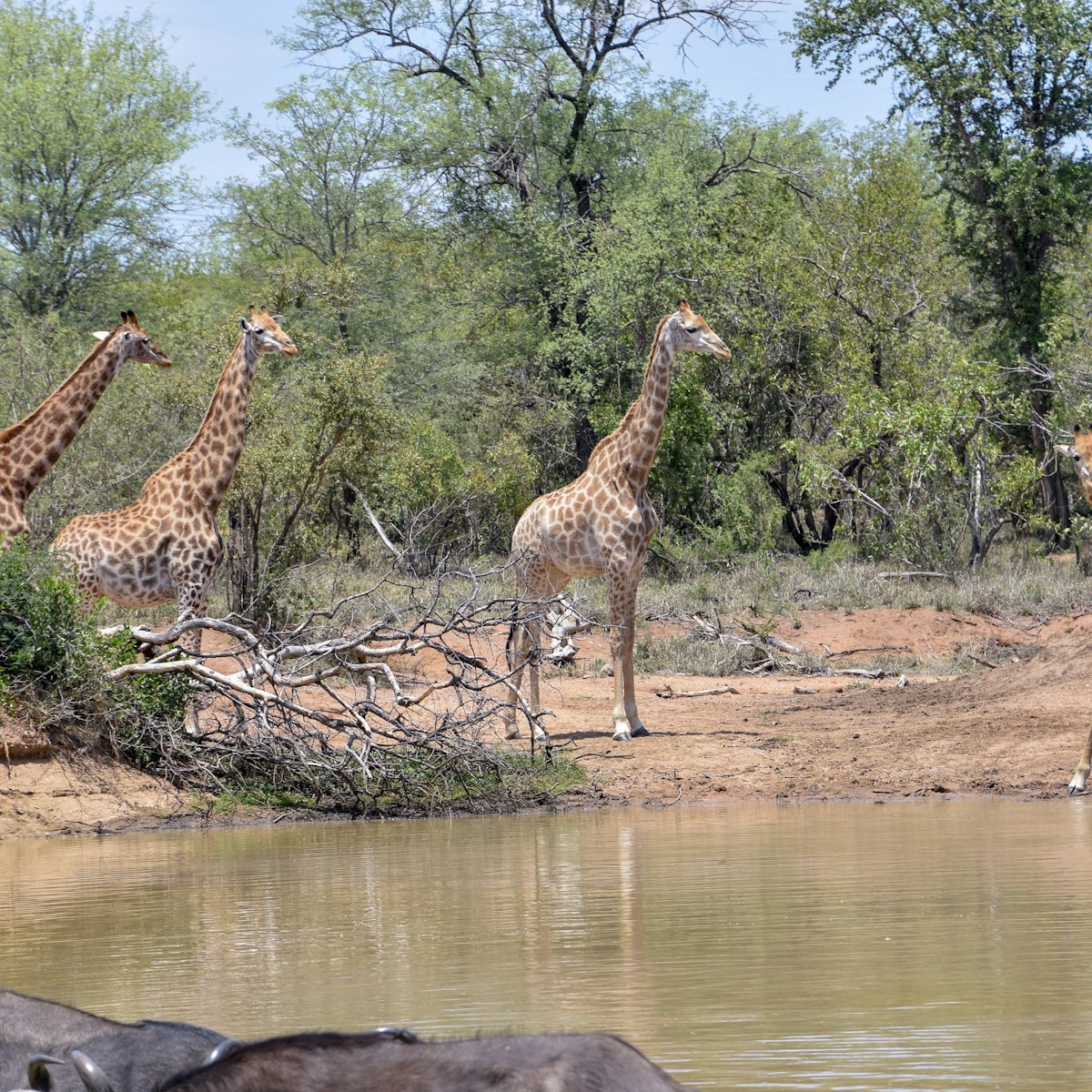
Kapama Private Game Reserve
With four luxury lodges and the Big Five in residence (as well as occasional passing wild dogs and great birding), 13,000-hectare Kapama gets all of the…
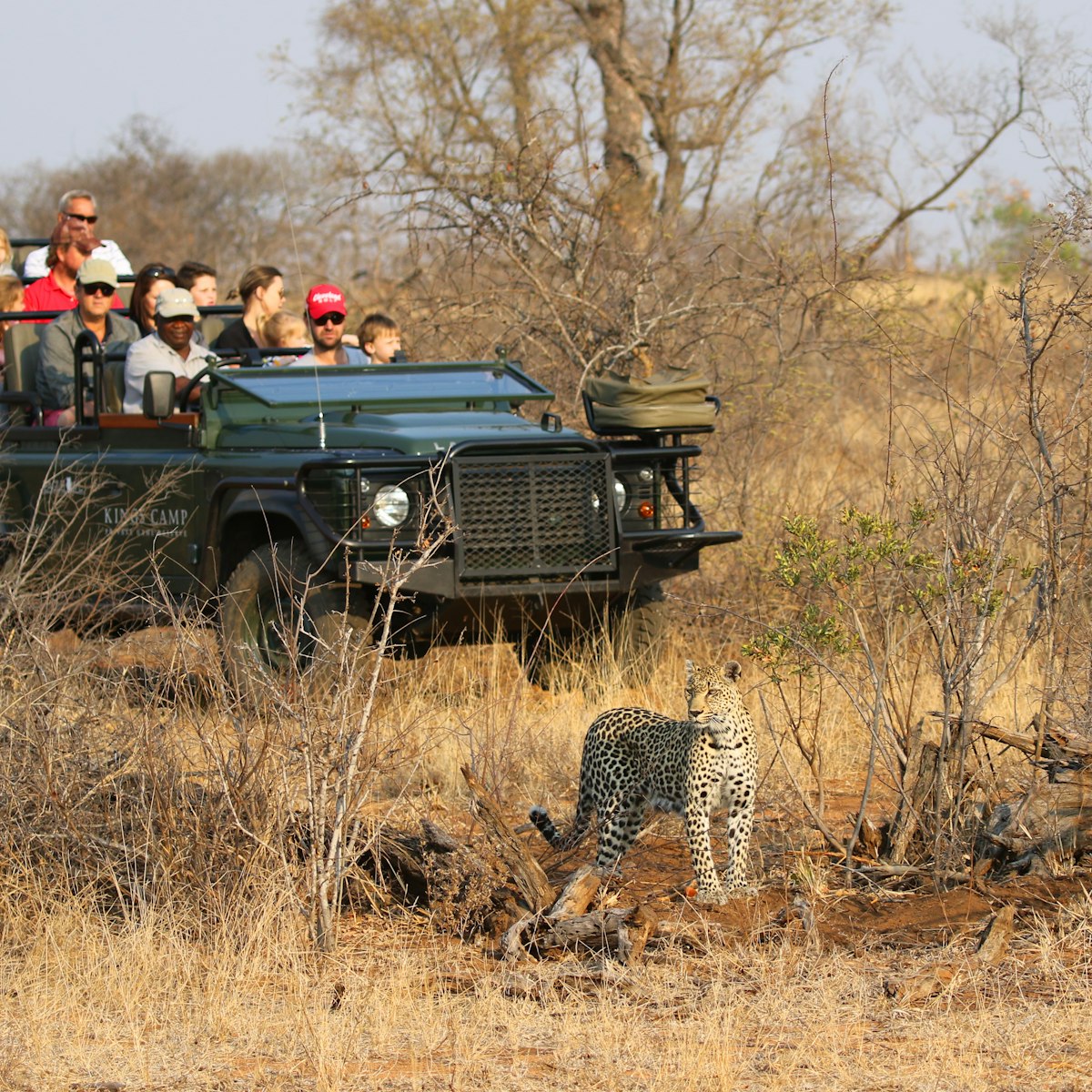
Timbavati Private Nature Reserve
Timbavati abuts Kruger National Park's western boundary and has an excellent mix of wildlife, conservation and good accommodation. Its accommodation…
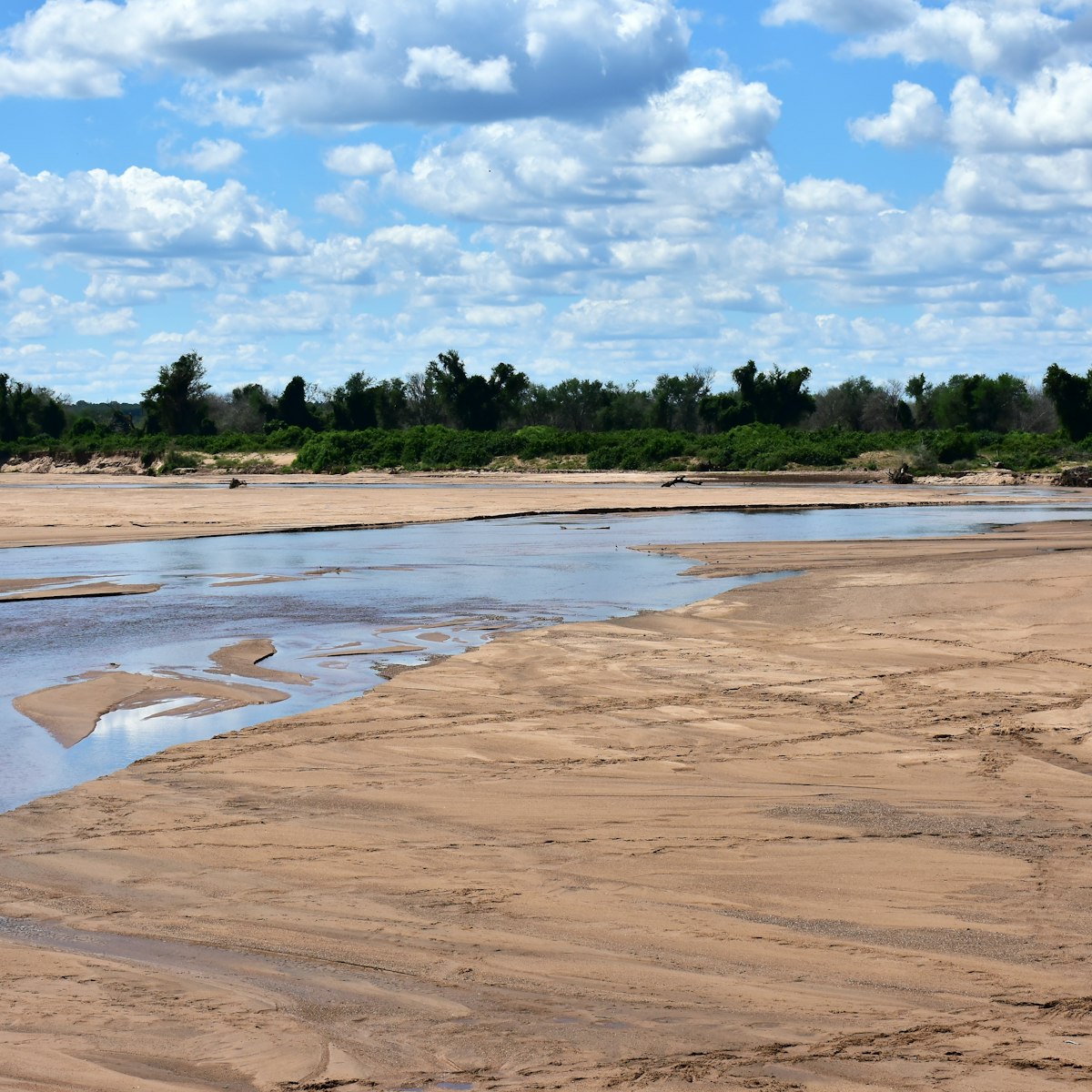
Crooks Corner
On the outskirts of a beautiful fever-tree forest, Crooks Corner marks not only the confluence of the Luvuvhu and Limpopo Rivers but also the historic…

Bobbejaankrans
This overlooks a section of the Timbavati River that animals often visit to slake their thirst. It's especially good early morning or late afternoon.

Renosterpan
This waterhole north of Berg-en-dal usually lives up to its name (renoster is rhino in Afrikaans). Late afternoon is best.

Klaserie Private Nature Reserve
A 600-sq-km (or 60,000 hectare) private wildlife reserve in the greater Kruger area, Klaserie has strong conservation credentials.
Plan with a local
Experience the real South Africa
Let a local expert craft your dream trip.
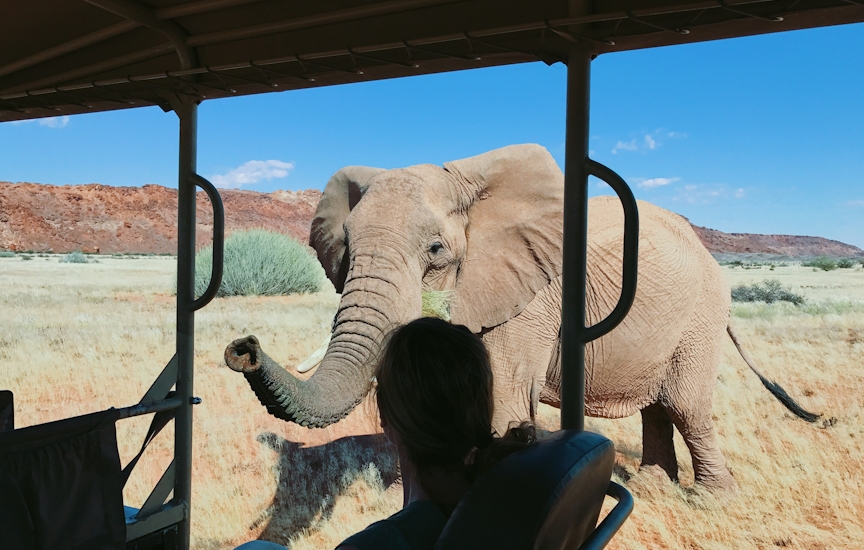
Latest stories from Kruger National Park
Filter by interest:
- All Interests
- Adventure Travel
- Art & Culture
- Beaches, Coasts & Islands
- Food & Drink
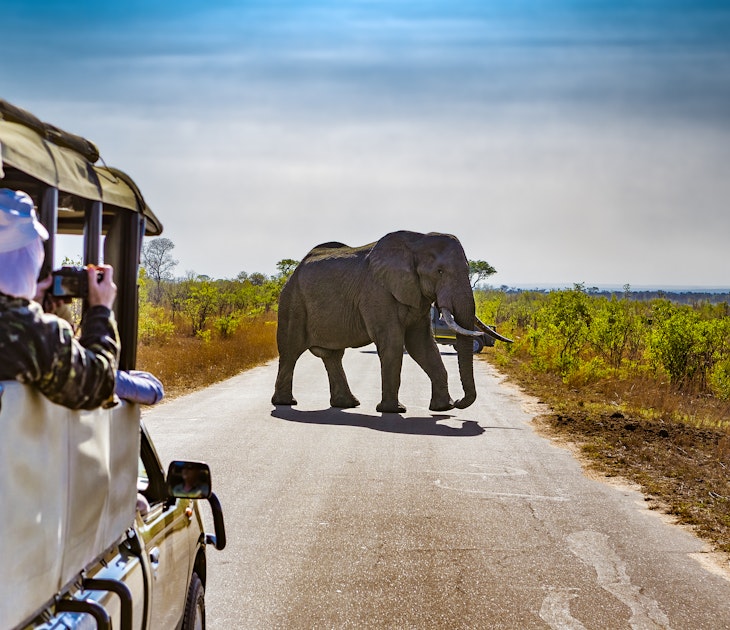
National Parks
Jan 5, 2022 • 8 min read
Preserving mountains, grasslands, beaches and deserts, South Africa's national parks are natural wonders. Here's a guide to South Africa's best reserves.
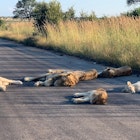
Apr 21, 2020 • 2 min read
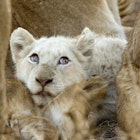
Sep 30, 2019 • 6 min read
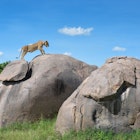
Jul 3, 2019 • 6 min read
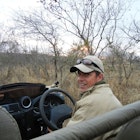
Jan 31, 2012 • 5 min read
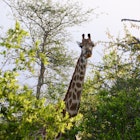
Jun 18, 2010 • 2 min read
Purchase our award-winning guidebooks
Get to the heart of Kruger National Park with one of our in-depth, award-winning guidebooks, covering maps, itineraries, and expert guidance.
- Destinations
Kruger National Park
South africa.
An Unmatched African Safari Destination
Immerse yourself in one of the world's greatest wildlife havens, the Kruger National Park. South Africa’s largest national park offers a safari experience beyond comparison – teeming wildlife like the Big 5, diverse landscapes, and luxurious accommodations.
Diverse Wildlife and Unforgettable Safaris in Kruger National Park
The Kruger National Park is home to the legendary Big 5 , consisting of the lion, leopard, rhino, elephant, and African buffalo. However, there are many other fascinating wildlife species.
From small critters to majestic giants, Kruger guarantees wildlife encounters that will make your safari a truly unforgettable experience.
Unique Safari Experiences Tailored to Your Interests
From exciting morning game drives to thrilling night safaris and guided bush walks, we can design your Kruger safari to match your interest. Whether it's bird-watching, photography, or tracking the Big 5 , your Kruger safari experience will be as unique as you are.
Luxury Lodges in the Heart of Kruger
Experience the African wilderness from the comfort of Kruger's luxury lodges . Offering stunning views, world-class service, and an exclusive, immersive safari experience, these lodges are the perfect place to relax after a day of thrilling wildlife encounters.
The Best Time to Visit the Kruger National Park
While the Kruger National Park offers excellent wildlife viewing throughout the year, the dry winter months (May to September) are considered the best time for game viewing.
However, the wet summer season (October to April) is perfect for bird-watching and ooh-ing and aah-ing over adorable newborn wildlife .
Exploring Beyond the Borders of Kruger National Park
While Kruger is the crown jewel, the surrounding private reserves such as Sabi Sand , Timbavati , and Manyeleti offer even more exclusive safari experiences with fewer crowds and excellent wildlife viewing opportunities. Here you can often drive off-road to get a closer look at wildlife, go on walking safaris, and embark on night game drives to see the nocturnal wildlife in action. It’s also super easy to pair your Kruger safari with a relaxing beach holiday in Mozambique or Mauritius or with a visit to the breathtaking Victoria Falls .
Our Commitment to Conservation and Community Upliftment
If you book your dream African holiday with Rhino Africa, your visit directly protects this spectacular wildlife haven and uplifts local communities. Therefore, you're supporting sustainable tourism initiatives that have a lasting positive impact on our continent.
Plan Your Kruger National Park Safari with Rhino Africa
Ready to venture into the African wilderness? Contact Rhino Africa today, and let our Travel Experts tailor the perfect Kruger National Park safari for you.
With our in-depth knowledge, first-hand experience and passion for our continent, we'll ensure your Kruger safari is a journey of a lifetime.
In Africa, It's Not About What You Know, But Who You Know.
We've partnered with the best to ensure you get front row seats at the best possible price., frequently asked questions.
We've taken the liberty to answer everything you may need to know about visiting Kruger National Park
Kruger is a year-round destination, but it remains seasonal. In other words, the best time to visit the Kruger National Park for a safari depends on your safari interests. Here's what you can expect to experience through the months of the year.
November to December: The summer months are hot and humid with either continual rains or very typically afternoon thundershowers, which generally clear before the game drives depart. Many newborn animals are around, most notably the impala lambs, which are beautiful but vulnerable to predators.
January to March: These usually are drier months with very hot days. If you're an avid birder, this is the time to see the beautiful migratory birds. Going on early morning drives with early returns to escape the heat is typical.
April: The vegetation starts changing from a thick, lush green bush to a slightly sparser and browning bush during this autumn season. The temperature starts cooling down at night, but the daytime is still warm. There could be an occasional thunderstorm in the afternoon.
May to June: You can expect cold temperatures at dawn and night during the winter months. Warm clothing is recommended, such as gloves, scarves, beanies and insulated jackets. The vegetation turns brown, and trees start losing leaves. Therefore, this sparser vegetation allows for better wildlife visibility during game drives. During this time, large herds of elephants are very mobile, increasing your chances of spotting them en route!
July to September: Over these months, the bush is very dry. Evening and early mornings are chilly, so layer up for your game drives! Game viewing is fantastic due to excellent visibility, and the wildlife congregates around the scattered watering holes. One of the best moment for Kruger National Park safaris !
September to October: Spring is at the height of the dry season, boasting hot, dry winds and colourless, sparse vegetation. Because the rivers and dams are low, you can see high concentrations of wildlife in these areas, making game viewing excellent. The first rain generally falls towards the end of October, and signs of spring and a new wet season are evident.
Whichever season you choose, our Rhino Africa Travel Experts will ensure you pick the best time to visit Kruger National Park according to your safari expectations.
The cost to visit Kruger National Park can range anything from $500 to $2,500 per person per night, depending on service providers, availability, and seasonality. We also have a selection of curated Kruger National Park tours, starting at $1700, but remember that all our tours can be tailor-made to suit your preferences.
In 2022, a day ticket for international travellers entering Kruger National Park costs anything from $28 per adult, per day and from $14 per child per day.
However, please note that the total cost to visit Kruger National Park depends on several factors, including but not limited to the duration of your trip, the type of accommodation, and the specific location within the reserve.
We always recommend that you stay at least three nights and choose one of the private concessions within the Greater Kruger National Park for a more exclusive Kruger National Park safari experience.
There are several ways of getting to Kruger National Park, each of which has a slightly different cost implication and levels of convenience to consider.
If you plan to travel from Johannesburg to Kruger National Park , daily charter flights operate between Johannesburg OR Tambo International Airport and many of the private lodges in and surrounding the Kruger. A "lodge hop" in a small light aircraft to your lodge of choice is the easiest and most convenient way to travel to the safari destination. The flights take about 90 minutes and deliver you straight to the corresponding airstrip of the lodge you are travelling to. Luggage is, however, limited to 20kg in soft-sided bags on these flights.
Alternatively, you can touch down in Kruger Mpumalanga Airport, Hoedspruit or Skukuza Airport, where a road transfer, often a game drive in itself, will bring you to your final destination. Commercial flights from Johannesburg take one hour, Durban an hour and a half, and from Cape Town to Kruger National Park , it's only just over two hours.
Self-driving to Kruger Park is feasible and enjoyable for those with more time. The gate is about a six-hour drive from Johannesburg, and the tarred road is well maintained, with clean service stations along the way. In fact, the Maputo Corridor means you will be travelling on a dual carriageway for most of the way. Fuel is never a problem in South Africa, and you won't get lost with Google Maps or Waze. Roads are also surprisingly well-signposted, and traffic density is generally low.
Based on your lodge of choice, time, and budget, our Travel Experts will gladly advise you on the best way to get to Kruger National Park or the surrounding reserves.
Where is Kruger National Park, and what is its history? Kruger National Park stretches across the northeastern part of South Africa and was originally founded by Paul Kruger in 1898 and called the Sabi Game Reserve. In 1926, it was enlarged and made into a national park. In 2002 the Kruger National Park became part of the Great Limpopo Transfrontier Park. This peace park links Kruger with the Gonarezhou National Park in Zimbabwe to the north and with the Limpopo National Park in Mozambique to the east.
The park is part of the Kruger to Canyons Biosphere, an area designated by the United Nations Education and Scientific Organisation (UNESCO) as an International Man and Biosphere Reserve (the "Biosphere").
Early History
Evidence of early humans is found in the area, dating back as early as 1,500,000 BC. The San people also existed in the area as far back as 100,000 BC. In 200 AD, while looking for more grazing land for their cattle, the first Nguni speaking people migrated south into the area and displaced the San.
By 800 AD, the Arabs started raiding the area for slaves, using the ports in Mozambique. A civilisation also sprang up in the northern regions of the park, and they built the Thulamela Stone Citadel, which was occupied between 1250-1700 AD. They also extracted iron ore from up to 200 mines, converting it into iron for trade.
The first known European to explore the now Kruger National park area was Francois de Cuiper, who led a Dutch East India Company expedition from the Cape Colony in 1725. However, the expedition was attacked by local tribes-people near Gomondwane and driven away.
Around 1838, Voortrekker expeditions led by Louis Trichardt and Hans van Rensburg explored the Lowveld, and later wagon routes were established to and from the Kruger area.
Gold was first discovered in September 1873 at Pilgrim's Rest and then in 1881 at Barberton. Fortune seekers rushed to the Lowveld. The prospect of finding gold banished all fear of lions, crocodiles, and malaria. This started the dramatic decline of wild animals in the region due to the hunting and trading of animal horns and skins.
The Park since the 20th Century
In 1912, a railway line was routed through the reserve. Stevenson-Hamilton (a British major who became the first warden of the Kruger National Park) successfully used this to get tourists to stop over for lunch. By 1916 a government commission was appointed to assess the future of the reserves. In 1926, as an act of reconciliation, the British administration officially renamed the reserve after Paul Kruger and declared it South Africa's first National Park.
In 1927, the park was opened to the public, who were charged a £1 fee. Only a handful of cars visited the new park that year, but in 1935 some 26,000 people passed through the gates. Today the number is around one million per year.
Here's a rough idea of what you can expect on a Kruger National Park safari . Please note that this differs depending on where you stay and what time of year you visit.
05:00: Wake up to get your day started!
05:30: Coffee with your ranger and tracker before going on safari, most often on an open 4x4 vehicle.
09:30: Start heading back to the lodge for a scrumptious breakfast.
11:00: Depending on where you're staying at what time of the year, you can often embark on a bushwalk with an armed tracker. This gives you a chance to appreciate the smaller wonders of the bush.
13:00: Enjoy your lunch and some leisure time.
16:00: Meet for your afternoon game drive.
16:30: Your evening game drive promises different sightings than the morning, with nocturnal animals coming out to play.
18:00: Watch the incredible sunset while you drink a G&T.
18:30: Using a spotlight, take a peek into the lives of your nocturnal creatures.
19:30: Return and freshen up for dinner.
20:00: Feast on dinner while your ranger tells you stories around the campfire.
Unfortunately, the Kruger National Park is not a malaria-free area. However, it is entirely possible to have a safe, malaria-free Kruger safari by using prophylactic drugs. Please note that we are not doctors, so you should always speak to your doctor about malaria prevention before travelling.
Here are our malaria prevention tips for your Kruger National Park safari :
1. Repel the Mosquitoes. Always wear repellent as well as long-sleeved shirts and long trousers in the evenings and mornings. Please note that clothes alone won't protect you, as they can bite through the material. Most of our lodges will have screened windows and doors, air conditioning systems, and mosquito nets to further protect you. The female mosquito responsible for transmitting malaria is a silent mossy, so you will have to ensure you repel them. They can strike at any time of day but are most active at dusk as well as dawn.
2. ALWAYS Take Anti-Malaria Tablets. The most important thing you can do to protect yourself against malaria is taking prophylactic tablets. Please note that you have to speak to your doctor before taking these tablets.
3. Keep an Eye Out for Symptoms and Finish Your Course of Meds. If you start to notice any flu-like symptoms, you must get a malaria test to be safe and catch it early because malaria reacts well to early treatment. Also, don't stop taking your meds until the course is complete!
When wondering what is the best way to visit Kruger National Park , we’ll always recommend to our guests that they opt for a private game reserve. So, what’s the difference and why a private game reserve?
Well, the public parks tend to be more crowded, and you could get stuck behind a convoy of other vehicles out on safari. This means that you might miss some animal sightings. There are also strict times when you’re allowed to be out on the roads in public areas, and you must stick to the main roads.
On the other hand, if you stay at one of the private game reserves sharing an unfenced border with the Kruger National Park, you have a more exclusive experience. The lodges within these private game reserves are also generally more luxurious. Because they have private land, you can go out on safari in open-air vehicles and go off-road to get a closer look at the wildlife. They also limit how many vehicles can be out at a time so that you have an uninterrupted view! Furthermore, there are no set times, and you can even head out on safari after dark!
You can also experience Kruger with all your senses by enjoying activities such as bushwalks, multi-day walking safaris, photo safaris, and more.
Some more useful Kruger National Park Travel Tips
Watch our travel tips videos for more insights into kruger national park, why book with us.

Username or E-Mail
Forget Password?
Do not have an account?
Already a member.
- Umbhaba Specials
3 Day Best of Kruger Safari
- Umbhaba Accommodation
- 4 Day Kruger and Panorama Safari
- 5 Day Kruger and Panorama Safari
- Kruger and Panorama
- Group Open Vehicle Safaris
- Morning Safaris
- Afternoon Safaris
Full Day Safari
- Full Day Panorama Tour
- Full Day Cape Winelands Tour
- Full Day Cape Canopy Tour
- Full Day Walk to Freedom Tour
- Full Day Cape Point & Peninsula Tour
3 Day Best of Kruger Private Safari
- 4 Day Kruger and Panorama Private Safari
- 5 Day Kruger and Panorama Private Safari
- Private Vehicle Full Day Safaris
- Private Vehicle Morning Safaris
- Private Vehicle Afternoon Safaris
- General FAQ’s
- Accommodation Kruger Park
- Image Gallery
- Video Gallery
- Our Open Vehicle
- Kruger National Park News
- Kruger Park Mammal Guide
- Kruger Park Bird Guide
- History of the Kruger Park
- Half Day Soweto Tour
- Full Day Soweto Bicycle Tour

Book the Best 3, 4 or 5 Day Kruger Park Safaris and Tours
“Kurt Safari is the # 1 Rated Kruger National Park Safari Company on Tripadvisor. We specialise in 3, 4 and 5 Day Kruger Park Safari Packages , as well as Day Safaris and Tailor-Made Kruger Safari Trips .

Safaris Depart Johannesburg Every Monday – Wednesday – Saturday
4 Day Best of Kruger Safari
4 day kruger & panorama safari, 5 day kruger & panorama safari.

Private Safaris Depart Daily
Private Full Day Safari
Private morning safari, private afternoon safari.

4 Day Kruger & Panorama Private Safari
5 day kruger & panorama private safari.

3 Day Best of Kruger Budget Safari
4 day best of kruger budget safari, 4 day kruger & panorama budget safari, 5 day kruger & panorama budget safari.

Tailor Made Guided Safaris

Morning Safari
Afternoon safari.

2 Nights Umbhaba Eco Lodge Self-Drive Safari
3 nights umbhaba eco lodge self-drive safari.

Namibia Tours & Safaris
Garden route tours, cape town / johannesburg day tours, trip advisor reviews, for the last 20 years, kurt safari’s experienced kruger guides have been driving both local and international travellers through some of the most exquisite and wildlife-filled areas of the world-famous kruger national park..
Today, we are a highly ranked, and much recommended, TripAdvisor Kruger National Park safari company. We have curated an exclusive array of safaris, activities, and tours that promise to give you a wildlife encounter that is nothing less than absolutely extraordinary. We offer some of the very best 3, 4 and 5 Day Kruger Park Safari Packages, as well as an array of Day Safari options.
A place of untouched African landscapes, the Kruger National Park is a true haven for those seeking adventure in a place that is home to a rich and diverse wildlife and plantlife. It’s a place made for the more adventurous spirit. Have a look at our comprehensive selection of Kruger National Park packages and discover the magic within each expedition.
Our Kruger Park Safaris Depart from Johannesburg Every Monday, Wednesday and Saturday
OUR OFFICE IS THE ROADS, CAMPS AND ATTRACTIONS OF THE MAJESTIC KRUGER NATIONAL PARK. AND OUR PASSION FOR THIS EXCEPTIONAL PLACE HAS MADE KURT SAFARI SOUTH AFRICA’S MOST ESTEEMED KRUGER NATIONAL PARK SAFARIS TOUR OPERATOR
We have a selection of the very best Kruger National Park Safaris travel packages, each of which have been created for clients who are looking for that real African Safari experience, where a rustic adventure meets first world comfort. Every aspect of our Kruger Park safaris and tours are tailor made to suit a variety of budgets, experiences, and tastes.
Our Kruger National Park safaris include a range of affordable trips, created just for those travelling on a limited budget, and we also have a selection of Kruger Park tours designed for holiday makers wanting a luxury African vacation. Not only do our guests get to explore the best of the Kruger National Park , spending their days slowly driving along some of the most famous roads, those well-known for their wildlife population’s, but they also have the option to explore some of the region’s most interesting and beautiful attractions.
In the company of a trained and passionate guides, our guests spend up to 9 hours a day in the Kruger National Park . This is more time than most other companies allow for, and this means our guests have a better chance of seeing the Big 5 and more. We make use of the most comfortable, open-air safari vehicles, giving guests a real bird’s eye view of the wildlife we encounter.
Most of our Kruger Park safaris and tours are conducted in areas of the Southern Kruger, where wildlife populations are abundant. This part of the park is home to the Big 5 – Lion, Elephant, Buffalo, Leopard and Rhino – herds of rambling zebras and wildebeest, and more birds than you could imagine. The Kruger National Park has over 148 mammal species, and many of which can be seen in the Southern regions of the park.
Kurt Safari offers one of the widest varieties of Kruger National Park Safari Packages, from exciting 3, 4, and 5 Day Packages to an epic 8 day Photographic and Birding safaris. Each tour is conducted with professional guides, who are both passionate about the park and knowledgeable about its inhabitants.
To book any of our Kruger Park safaris , you can browse through our website and find the one most suitable for your needs, your expectations and your budget. You can then book directly via our website, pay online and start preparing for your trip. Alternatively, you can contact us and have a chat with one of our knowledgeable consultants.
We are based in the sleepy Lowveld town of Hazyview, which is a 15-minute drive away from the Kruger National Park . Our consultants, guides and management team are predominantly locals who’ve spent a lifetime living in the area. They all have tremendous knowledge about the Kruger National Park and its wild inhabitants and can give you the kind of advice that you won’t find online, which you can use to make your holiday simply unforgettable.
Guests who choose an overnight holiday with Kurt Safari, stay at some of Hazyview’s most incredible private lodges. Just a 15 minute drive from the park, the lodges we use are chosen for their comfort and their high standard of excellence and friendly hospitality. The lodges we choose have Wi-Fi and the booking includes breakfast and dinner. We are also able to block book accommodation.
Kurt Schultz, the Director of Kurt Safari personally guided Kruger Park safaris for almost 12 years before creating his safari company. Today, the company is rated as one of the leading Kruger Safari operators on TripAdvisor, and all of our packages have been personally curated, after many years of trial, error, and trips in the park. We believe that the Kruger Park safari should be simple but wild, with a focus on quality guiding and safety. We also believe that what can make a market truly special is the added benefits such as secluded but comfortable accommodation, indulgent meals, and the opportunity to have a memorable experience, even if you are travelling on a budget.
We very much look forward to welcoming you to one of our our favourite places, the Kruger National Park. We hope that you truly enjoy your Kruger Park safari with us.
Read our Complete Guide to the Kruger National Park here
Welcome to kurt safari. here you will find a selection of well-priced kruger park safaris as well as travel information., your adventure begins here.
Kurt Safari Co is one of the Kruger’s leading tour operators, with over 20 years spent welcoming guests from all over the world to experience the ultimate Kruger Park safari.
We have a diverse selection of fantastic Kruger safaris for our clients to choose from. Each safari is carried out in an open safari vehicle and in the company of one of our professional guides, each of whom has years of experience guiding tours through the Kruger. Our safari packages are designed in such a way that you are guaranteed to have a truly unforgettable time in our beautiful country. We know that for many of our guests, a visit to the park is a once in a lifetime adventure and so we try to ensure that our Kruger Park safaris are as entrancing, captivating and as memorable as possible. Our tailor-made safaris as well as our standard safari packages, offer something for everyone. Whether you are looking to spend a single day, 3 days, 4 days or even 5 days in the Kruger, we have the tour for you. We also have shared safaris and private Kruger Park safaris, as well as packages for guests wanting to see the Panorama Route and the Kruger National Park.
Our guests stay in the exclusive Umbhaba Eco Lodge, where they can look forward to a world class experience in their air conditioned en-suite room. Should there be no availability at Umbhaba Eco Lodge during their trip, guests will stay at the equally stunning Sanibonani Lodge in Hazyview.
The Kurt Safari Kruger Experience
A Kurt safari is a laidback experience and our itineraries, as well as all that is included in each tour, will ensure that you are well taken care of and in the best company.
Our guided tours are well priced and well organised and accommodation is included with each overnight package.
We specialise in small guided group Kruger Park safaris and with our daily departures from Johannesburg to Hazyview, you can arrive in the city in the morning and be enjoying the Kruger in the afternoon! Our Kruger safaris are ideal for both locals and international visitors.
Each safari vehicle is open, giving you ample visibility, allowing you to easily spot animals through the wild vegetation. This visibility makes each safari perfect for budding and experienced photographers looking to capture those one of a kind snaps. If you are in search of a more photographic focused safari, please have a look at our custom photographic safaris.
The Kruger National Park is without a doubt the best place in South Africa to spot the Big 5. The Kruger is home to the Lion, Leopard, Elephant, Rhino, and Cape Buffalo and a day trip to the park can offer enough time to spot these animals and many more. Keep in mind that when visiting the Kruger, you never know what is waiting around the next twist and turn in the road! The Kruger boasts a massively diverse number of wildlife and bird species.
Although we have a wide range of Kruger Park safaris and exciting game drives for our guests to choose from, we are also more than happy to customise a package to fulfil all of your wildest safari daydreams! We always go the extra mile for our guests as we know how truly amazing and memorable a real African safari should be. We are SATSA accredited, which is our guarantee to you that the safari you are paying for will live up to all of your expectations. You can look forward to a safe, well-priced, one of a kind safari. Each of our safaris will meet your expectations for that African experience you seek.
You can view the pricing of our bestselling Kruger Park safaris on our website.
Should you have any questions about our tours kindly get in touch with our helpful Hazyview based team. You can also check out TripAdvisor to see all of our latest reviews.
We look forward to welcoming you to the African continent. You can make your safari booking via our website or by getting in touch with us via email.
Kruger park safaris: must know info.
The majestic Kruger National Park is one of South Africa’s best loved iconic landmarks. Each year the conservation reserve welcomes thousands of guests from all over the world. Embarking on one of the many Kruger Park trips available, or taking a self-drive through the park , is the way that most guests are introduced to the quiet solitude that you will only find when out in the wild. But it is not the quietness that brings guests to the park. It’s the animals.
Booking a Kruger Park safari or a Kruger Day Tour has also never been so easy. A quick look online will present you with a huge number of options, most of which are from top-notch safari companies, such as ours. Why book a safari instead of doing a self-drive?
We reap the benefits of the wisdom and foresight of those who came before us. The Kruger Park safari is an experience to be remembered and it’s one that is not as costly as you might think.
The Founding of a Legendary Conservation Park
Paul Kruger , the onetime president of the now-defunct Transvaal Republic, made it his mission to have an area of the Transvaal set aside for the conservation of animals. Without his efforts, the animals that we now see roaming the park would have long been erased from the land. Back in 1898, when the park was first founded, hunting was rife and trophies of big game, such as lions and elephants were much sought after by overseas visitors.
To prevent the local animal life from becoming completely eradicated, the park became a no-hunting zone and to this day remains one of the oldest and biggest areas of conserved land in the world.
The Kruger National Park might have been proclaimed in 1898 , but it was only in 1927 that it was named the Kruger National Park and opened to tourists. Those early days were interesting, to say the least, with tourists literally flying through the park on a train. Not a lot could be easily seen, and the route was one that could not be changed. But this was the safest way for the earliest visitors to see the park. These were the days before the can.
By 1928, the Kruger Park was being steadily run by a board of directors and it was decided that in order to make the park more accessible, overnight accommodation needed to be built. The park’s first rondavels, a round hut style of accommodation that is as synonymous with the park as the Big 5, were built at Skukuza, Pretoriuskop and Satara. As more guests visited the park, more accommodation was added for their benefit while the former accommodation used for rangers was also converted into unique accommodation for guests.
Fees were never exorbitant and so the park became known as the People’s Park; a place where anyone could experience all that the conservation effort had to offer.
If you have done your research about South Africa, and the Kruger Park in particular, you will know that the summers are exceptionally hot and humid. So you can sympathise with the park’s earliest overnight guests and their struggle to stay cool.
In fact, staying over in the park, in one of the rondavels, was not a popular choice. Sure it was a novelty, but the heat was as unbearable as the mosquitoes, which could not be kept out. These days, rondavels have fans and some even have air-conditioning.
Kruger Park Flora and Fauna
While animals are what draws people to the park, the flora of the area is just as captivating as the fauna. The plants and trees of the Kruger are really diverse, and different flora can be seen in different areas of the park. The Kruger is divided into 4 distinct areas, each distinguishable based on the flora of the area.
Thorn trees and red bushwillow veld
In the west and more or less centre of the park, just south of the Olifants River, lies the red bushwillow trees as well as acacia (thorn) trees. The area also boasts plenty of marula trees. The acacia trees line the rivers and streams. Along with the Nwatimhiri Bush, the areas along the Sabie River are very dense with vegetation.
Knob thorn and marula veld
In the area south of the Olifants River, and to the east of the park, lies knob thorn and marula veld. This region provides plenty of grazing ground. Red grass and buffalo grass, as well as the knob thorn and marula trees, make this an important region of the park.
Red bushwillow and mopane veld
North of the Olifants River and to the west of the park, the red bushwillow trees and mopane trees mostly make up the vegetation.
Shrub mopane veld
Almost the entire northeastern area of the park is covered with mopane trees.
While these areas have more plants and trees than mentioned above, it is the abundance of these trees and bushes that contribute to the naming of the areas. Each region is exceptionally important for the survival of fauna.
Famous Fauna and the Effort to Conserve
The park is famously home to the Big 5, which consists of the lion, leopard, elephant, rhino and buffalo.
These iconic animals are part of the allure of visiting the Kruger, but they are not the only incredible animals to have a home here.
In fact, there are more species in the Kruger than in any other park on the African continent!
Overall, there are 147 species of animals in the park. Along with numerous predators and large species such as elephants, the park also has a host of antelope such as kudu, impala, nyala, and eland. The Kruger National Park is also home to various endangered as well as rare species, such as the wild dog.
Anti-Poaching Efforts
As the park has many endangered species, efforts to prevent poaching have been underway for many years. Anti-poaching units are equipped with the latest in prevention equipment such as night vision technology and advanced telescopes. Game rangers, the police and the army have been actively involved in the effort to stop poaching and while instances have been reduced, animals are under constant threat.
While elephants are occasionally hunted, it is the savage slaying of our precious rhinos that makes the headlines. Poachers sneak into the Kruger, often when the moon is full, and hunt rhinos for their horns. The horn is worth around $ 66 000 per kilogram and although there is a ban on the trade of the horn in most countries, the ban sadly has little effect.
Those who go on a Kruger Park safari drive are incredibly lucky to see a rhino.
Must Know Kruger National Park Rules
In the beginning, the rules for guests visiting the park were very relaxed and not widely enforced.
But as time has gone by, more rules have been added to the sheet given to guests upon entry. All of the rules are simple to understand and very easy to follow. If this is your first time going to the park, here’s what you need to know:
- Guests are only allowed to drive in the park from sunrise to sunset. Before the evening comes, guests need to be out of the park or they need to be at the rest camp they are booked into. An exception is made when guests embark on a Kruger Park night drive but guests are not allowed to self-drive after dark, so you’ll need to make arrangements and bookings for such an experience.
- Another important rule and one that applies greatly if you are going to be doing a self-drive through the Kruger is the speed limit. There is a strict speed limit in the park ; 50 km on tar roads and 40 km on gravel (dirt) roads.
- It goes without saying, but indeed sometimes needs to be said, that guests are not allowed to leave the safety of their vehicles . There are also those rare cases of guests wanting to touch the animals, which is also forbidden. One of the major park rules is that people must remain in their vehicles.
- Feeding or disturbing the animals is also very much against the rules . Littering goes in this category and it is also forbidden. Because all of the animals are wild, feeding them can do more harm than good. Animals also often mistake litter for feed and end up eating the litter and becoming ill or dying.
- If you will be doing more than a Kruger Park day tour, then there are other rules that you will have to adhere to. Being booked into your camp before 14:00 pm and leaving by 10:00 am the following day is a must.
- Another thing to take into consideration is the noise rule . Camps are generally quiet places. What keeps them quiet is the rule that states that guests must limit noise between the hours of 21:30 pm and 6:30 am. Cell phones are permitted in the camps, but minimal use is encouraged.
- Only safari vehicles and private vehicles are granted access to the parks . Motorbikes are not allowed and roller-skates and skateboards are not permitted.
- All of the rules and regulations are enforced by legislation (the National Environmental Management: Protected Areas Act of 2003). This means you can be charged or fined for breaking the rules. The rules and regulations are there for the safety of the guests while they can also make the trip more relaxed and enjoyable.
Reputable safari companies always adhere to the rules of the park.
The kruger’s 12 main camps.
There is a laundry list of reasons why you should visit the Kruger National Park.
And one of those reasons is the history and the hospitality you will find in every camp. If anything, the park is one really laid-back place to be. Even the busy main camps, of which there are 12, are in their own bubble, away from the modern world.
Berg-n-Dal is one of the few camps in the park set in a mountainous area and the natural environment and habitat have been well preserved within the camp. The camp has dry riverbeds on the southern and northern borders, along with very large trees. Some of the animals to see near the camp include the wild dog, the klipspringer, and the leopard. If you are staying over in the park, then you’ll be happy to know that there are a number of facilities available along with great accommodation.
Berg-en-Dal is one of the Kruger’s newest camps. The beautiful rocky region in which it has been built often makes it the perfect place to see cats while the camp also has an indigenous rock garden that guests can explore. The camp was originally built in 1984 but just before the camp was opened, it just about completely burned to the ground. Officials scrambled to get the facilities rebuilt, and somehow managed to get everything done in time for the opening.
The camp has been built on top of a prehistoric settlement and the area around the camp is filled with all kinds of examples of ancient life and it has a Bushman Trail which allows guests to view San Bushmen rock art. The bush walk is about 20 minutes and guests will see various ecological and geological sites when viewing the paintings.
There are a few archaeological sites close to the camp and pot shards and bone fragments have been unearthed here. Some of the latest evidence shows that those who lived in the area were from the Iron Age.
The camp is in the southern Kruger, a region of the park that is well-known for its abundant wildlife. The camp has all kinds of accommodation including camping, cottages, guesthouses and bungalows. It also has a big swimming pool, an internet cafe, a conference centre, and picnic areas for day tourists. Not many guided Kruger Park safaris stop here, but those that do enjoy a quieter setting than compared to Skukuza. The Kruger National Park accommodation at Berg-en-Dal is rustic but comfortable and affordable.
Crocodile Bridge
One of the smaller camps in the Kruger National Park, Crocodile Bridge gets its name from the Crocodile River, which flows close to the camp. Game viewing is excellent when you drive the Southern Circle which is near to the camp. In this area, lions are often spotted. Other animals known to prowl the area include kudus, giraffes, spotted hyenas and cheetahs. This camp has been time and again nominated as the best camp in the park.
Situated at the halfway point of the park, a perfect fit between north and south, is Letaba. The name means River of Sand and it is one of the best-known places to spot elephant. While a lot of areas in this sector of the park are already turning into grassland, Letaba is green and lush. And the night erupts with life. When you stay at Letaba, bats, owls, nightjars, frogs and cicadas keep the night alive. But there is more than the nightlife to keep you entertained. The areas surrounding Letaba are known for sightings of elephants and bushbuck.
Lower Sabie
Lower Sabie is situated along the banks of the Sabie River. The camp’s location gives it a laid back, calm atmosphere that guests can really unwind in. The camp is well known for having numerous, massive trees which makes it the ideal place to see leopards. Other animals you can see in the area includes hippo and lion, along with all of the usual antelope. A large number of other animals also visit the river to have a drink of water. At Lower Sabie, you will also have access to fantastic accommodation.
This is one of the camps in the park that is home to plenty of Mopani trees. But the most significant feature of the camp is the massive baobab tree that sits in the centre of the camp. Most of the camp’s vegetation is left to grow naturally. Some of the animals that you can spot in the area include hippo, waterbuck and tsessebe. The camp is on the border of the Pioneer Dam, so seeing animals late in the afternoon and early morning coming for a drink of water is the norm.
Olifants is well-known for the amazing views that it has on offer. The camp is situated high up on a hill, above the Olifants River. The camp is surrounded by viewing platforms, which offer a great way to spot the wildlife roaming near the water below. Some of the animals you can see here include crocodile, lion, elephant and hippo. Along with great accommodation, there is also a great picnic spot for day visitors.
With two satellite camps, Maroela and Tamboti, Orpen is well situated. The camp got its name from the Eileen Orpen who was owner of the land which was donated to the park and became the place where Orpen now is. This grassy area is a great place to spot grazing animals, while the wide open surrounding plans are home to many prides of lions. By night, the air is filled with the sounds of roaring lions, something that you will never forget. Orpen is well known for having a diverse array of wildlife, and some of the animals you will come across include rhino, buffalo, elephant, leopard and lion which make up the Big 5. Other animals include wildebeest and jackals.
Pretoriuskop
Pretoriuskop is a camp nestled between millions of years old outcrops of granite rocks. There are a number of interesting granite boulders in this south-western based camp. But the real attraction here is, of course, wildlife. Pretoriuskop is one of the park’s oldest camps and evidence of its age can be seen in the layout and style of the camp. The animals that are often spotted here include the Sable antelope, Lichtenstein’s Hartebeest, wild dog and kudu. Many people like to stay at this camp because it is quite close to one of the entry points to the park.
Punda Maria
Only those willing to brave the heat are brave enough to stay at Punda Maria during the intense summer months. And even in the midst of winter, this camp can get hot. Punda Maria is found in the north-most part of the park and because of the sandveld habitat, it is home to a number of interesting plants. Punda Maria is often called the botanical garden of the park. When travelling in this region you might come across nyala, wild dog and plenty of zebra herds. The drive is a long one when you are heading north. Often only those who will be spending more than a few days in the park will attempt a stay here.
Some of the first rondavels were built at Satara after more and more guests became interested in spending a night in the park. Today, Satara is a very busy camp and one known for its excellent game viewing opportunities. Satara is in a wooded area and the camp itself is considered to be rustic. If you are an avid bird watcher, this is definitely the place to go. And along with the birds you can see here, there is also a variety of animals such as lion, giraffe, wildebeest and the honey badger.
Another camp located in the northern region of the park, Shingwedzi is known for its wildlife sightings, such as nyala, waterbuck and elephant. To get to the camp, you will need to take the scenic route along the Shingwedzi River. This camp is also one that is considered to still be rustic, with a lot of the conveniences of modern living not found here, a factor that makes staying here a real break away. If it is tranquillity that you are seeking, you’ll find it here. Along with tranquillity, you will also find some interesting birds such as the Giant Eagle Owl and the Green Pigeon.
Of the plants that you can see here, there is Natal Mahogany, mopane scrub, brack thorn, sausage trees, and mustard trees. There is also a lot of bird life in the area.
As a northern camp, Shingwedzi is worlds away from the wet and humid sub-tropical southern areas of the park. Here the vegetation is sparser, which makes seeing wildlife a little easier. The further north you travel, the terrain changes from mountains and hills, to wide open plains and you can imagine cheetahs darting over the grassland. Shingwedzi is not on the day Kruger Park safari destination list because it is further away than most camps, but it is the ideal place to spend a holiday if you are looking for tranquillity.
Shingwedzi is famous for being home to some of the biggest elephants the park has ever seen. The Magnificent Seven once roamed the areas around the camp, and they became famous for having the biggest tusks ever recorded for elephants in the Kruger. An artist who learned of the elephants searched the area to find them and immortalise them in his artwork. Once the art became public, and more people learned about the elephants, guests from all over the world came to see them. The great tuskers lived in the area during the 1070s and 1980s, when the last of the tuskers died. The park has not seen the likes of these elephants again, and today, their tusks can be seen in various camps. The Shingwedzi River runs close to the camp, and it is one of the best places in the area to spot all kinds of wildlife. When the river comes down in flood, even more animals can be seen. Beyond the river lies an old alluvial plain which has a few trees and little vegetation.
Shingwedzi camp is a modern one with a touch of that rustic appeal that the Kruger has become so well known for. The camp has a restaurant and café, a swimming pool, a shop, a petrol station and a picnic area. For those who want to stay over in the camp, they are really spoiled for choice when it comes to their accommodation options. Shingwedzi has camping spots, huts, bungalows, and more luxury accommodation such as guest cottages and houses. The fixed Kruger National Park accommodation is kitted out beautifully and has fans and/or air conditioning for those intense northern Kruger summers. The camp is laid out perfectly for those wanting privacy while staying in the park and during the day, their Kruger National Park safaris offer unforgettable sightseeing.
Leaving the best for last, we have Skukuza. This camp is the capital of the park and when you are on a Kruger Park safari, this is the camp where you are sure to be stopping off for lunch. The camp is situated along the southern banks of the Sabie River and there are plenty of lookout points here. Guests stopping off for lunch can do so outside in a seating area as well as on benches that look out on the river. The camp is nice and shady, the perfect place to catch your breath, cool off and eat a snack. A few of the animals often spotted in the area include spotted hyena, bush baby and warthog.
Some wildlife comes into the camp, and day visitors enjoying a Kruger Park safari can get really up close to the wildlife. Monkeys and warthogs can be found roaming the camp in search of left over picnic snacks. Guests should be warned, however, as the monkeys can get very brazen and end up stealing food from your table or even your hand. Skukuza means “He who sweeps clean”, and it is named in honour of one of the camp’s most famous and beloved wardens, James Stevenson-Hamilton. The camp was originally called Sabie Bridge Camp, but upon the 30th anniversary of James Stevenson-Hamilton working in the park, it was renamed.
Serving as the camp’s administrative headquarters while also being the one place where all day visitors converge, Skukuza has a long and important history. As the “Capital City” of the Kruger National Park, all of the day to day administration and management of the park is done here. Well away from the prying eyes of the tourists, the park’s officials work around the clock to ensure that the park is running smoothly. Those who live and work in the park have made their homes in the quiet Skukuza Village, where there is also a school, a few shops and a weather station.
As far as Kruger National Park accommodation goes, there are all kinds of options to choose from. Camping and rondavels remain the most common and the most popular style of accommodation, although the camp does have more luxurious lodgings. There are plenty of things to do in the camp, for both day visitors and those staying over. The most luxury lodgings is the Kruger Shalati Train, which is to be built on the Sabie Bridge in 2019. The camp has a refreshing swimming pool, a golf course, and countless memorials and museums. Be sure to take a look at the dog memorial, which pays homage to the hounds that helped shape the park. You should also see the oldest hut in the Kruger, which is now a museum.
The camp has all kinds of modern conveniences, such as shops, ATMs, a classy restaurant, a café and ablution facilities. Guests staying over can look forward to air conditioned accommodation.
One of the best ways to spend your time in Skukuza, when you are on a day Kruger National Park safari is to set up a picnic while overlooking the Sabie River. You never quite know what you’ll see when you are in the camp.
Most Kruger National Park safaris will end up at Skukuza at some point in the day. We, for instance, enter the camp at around 10 am to give our guests some time to stretch their legs and grab a bite to eat.
In addition to these main camps, there are also a number of satellite camps, bushveld camps, overnight hides, bush lodges, luxury lodges and campsites.
Select your kruger park safari.
The biggest decision you need to make when planning a trip to the Kruger National Park is deciding what type of safari experience you would like to have. A quick online search brings up all sorts of safari packages, but the only way to narrow down the search is to know more or less what you want to get out of your Kruger National Park safari. It doesn’t help to book a Kruger Park day safari when what you really want is 10 days in the park.
Generally, the more time you spend in the park, the more animals you will see. The Kruger is home to hundreds of different animal species, including the Big 5. And the different regions of the park have unique habitats, meaning where you go in the park will be a deciding factor for what you see.
Kurt Safari offers guests a variety of safari packages, including 3, 4, and 5 day tours of the Kruger National Park as well as morning, afternoon and full day game drives and night drives.
Full and Half Day Safaris
To save time, and particularly if you are on a budget, opting for either a Kruger Park day tour or a half day tour is one of the easier ways to get a taste of the Kruger. Generally, we encourage visitors to spend more than a day in the park, in order to see everything. But when you are limited on either time or money, choosing a day or half a day in the park, can be a great introduction to this magnificent place.
We have Kruger Park Full Day Safaris, Afternoon Safaris , Morning Safaris and tours that combine the best of the Kruger, with a trip to the picturesque Panorama Route.
Full day private Kruger Park safaris can offer you the best way to see the park, and you have the added benefit of enjoying the sights on your own or in the company of friends and family. We offer private morning and afternoon Kruger Park safaris as well as full day safaris.
The other option is to have a full day Kruger National Park safari. Again, this private Kruger experience will give you just enough time to spot all sorts of animals. And the more time spent in the park, the more animals you are likely to see. A full day safari is also less likely to leave you feeling rushed. Along with taking you to the best places in the park, there is also the added opportunity that comes with being in the company of an experienced tour guide, who is sure to share a few stories of their time in the park.
Visiting the park during the morning or afternoon is often considered to be the best times, as the heat is not intense and the animals are likely to be grazing. During the peak heat times of the day, animals tend to seek out shade, leaving guests with a disappointing drive.
We depart on our safaris in the early morning and later afternoon, when the heat of the day has either not yet arrived or has cooled off, as these remain the best times of the day to see animals. Each of our Kruger Park Safari prices are affordable, and each will take you into the parts of the park best known for wildlife sightings.
Private 3, 4 and 5 day Kruger Park Budget Safaris
Within our selection of safari packages, we have something for every type of traveller, including those travelling as part of a small group. For these guests, we have created the 3, 4 and 5 day Kruger National Park safaris. Our tours are designed to include sophisticated,comfortable accommodation.
- The 3 day Kruger Park safari
This tour includes 3 days and 2 nights. The days are spent on safari, while in the evening you will return to the beautiful Umbhaba Eco Lodge or an equally upmarket nearby lodge should Umbhaba lack capacity. Breakfast and dinner are included as well as your transfers. Along with days spent on safari, this tour package also includes a Kruger Park night drive. With the 3 day Kruger Park safari , you will certainly have plenty to see, especially as we travel to those areas best known for animal sightings.
- The 4 day Kruger Park safari
Much like the 3-day package, your evenings will be spent at either Umbhaba Eco Lodge or a similar nearby lodge. This package includes 4 days and 3 nights in the wild, with your days being spent on safari. The ideal tour package to give you ample time in the park, you are sure to see numerous animals while you are on this safari.
- The 5 day Kruger Park safari
Finally, the last budget safari that we have available is the 5 day Kruger Park safari. While this package is similar to the 3 and 4-day tours, you will have 5 days in the park . And with this extra time, seeing the Big 5 is very much a possibility. You will be accommodated in either Umbhaba Eco Lodge or another nearby lodge.
The 3, 4 and 5 Kruger Park Classic Safaris
If you are looking to have a truly relaxing safari experience, and you are not so tightly constrained by your budget, the 3, 4 or 5 day classic Kruger Park safaris are a must. Stylish accommodation in a 4 star hotel and just the right amount of time spent in the park, when you sign up for one of our classic safaris, you will be in for a treat.
- The 3 day classic Kruger National Park Safari
Heading out early in the morning and late in the afternoon for a real Kruger experience, the 3 day classic safari is as comfortable as it is exciting. Your guide will be taking you to some of the best areas in the park, spending the day on the dusty Kruger roads looking for the Big 5 and all the other interesting park inhabitants. We offer guests transfers from Johannesburg and for the next 3 days you can sit back while we drive you through the Southern regions of the park. Breakfast and dinner are included.
- The 4 day classic Kruger National Park Safari
With 4 days and 3 nights included as a part of this tour package, you will have plenty of time to relax and enjoy your Kruger trip. The day starts early with an exciting Kruger Park tour, while the afternoons are for relaxing until late afternoon, when guests go on another game drive. This tour package also includes a night drive, something that everyone should experience at least once in their lives.
- The 5 day classic Kruger National Park Safari
The more time you spend in the park, the more opportunity you will have to see the Big 5. The 5 day classic Kruger National Park safari is a must for anyone who wants to take their time and have a truly memorable holiday. You will be accommodated in 4 star lodgings and breakfast and dinners are included. Much of this tour package is similar to the 3 and 4 day classic safaris, although you will have extra time in the park.
The 3, 4 and 5 day Kruger National Park Backpackers Safari
Not at all like the classic safari, and quite different to the budget option, the various Kruger National Park Backpackers safaris are designed for those who enjoy an on the move type of holiday.
Regardless of the number of days you want to spend in the park, your accommodation will remain the same, as guests opting for the Kruger National Park Backpackers safari will be lodged at the Bushpackers Campsite and Accommodation. This accommodation includes meals and will give you that touch of rustic living that you might be after when visiting the Kruger. This is more than a backpacker’s safari, it is also ideal for students looking for an adventure!
- The 3 day backpackers Kruger National Park safari
With 3 days spent enjoying a safari , and accommodation provided by the Bushpackers Campsite and Accommodation, guests embarking on this safari package are in for a real treat! Days will start off and end with a Kruger Park safari.And as always, we take guests to the more exciting areas of the park, where animal sightings are frequent.
- The 4 day backpackers Kruger National Park safari
Regardless of the package you select, always keep in mind that the more time you spend in the park, the more chances you have of seeing the animals you really want to see. Some guests have truly seen all they wanted to see in the 4 days that they have been on safari. We take guests to the Southern areas, as these are the most populated regions of the park.
- The 5 day backpackers Kruger National Park safari
You cannot go wrong with any 5 day safari . Giving you more than enough time to see many of the park’s inhabitants, anyone embarking on a 5-day safari is in for a once in a lifetime trip. And when opting for the backpacker’s safari, you won’t be breaking the bank. This safari also includes a tour of the Panorama Route.
The Guided Group Open Vehicle Safaris
Experiencing the Kruger National Park in the comfort of an open safari vehicle remains one of the most popular ways to see the park. Guests are up close to nature, and even though you are in an open safari vehicle, you will still be kept safe. With fresh air blowing in your hair, and the unmistakable sounds of Africa filling up the vehicle, seeing the Kruger in an open vehicle will leave you with memories to last a lifetime. And they are also the perfect vehicle for capturing some incredible photographs.
At Kurt Safari, we offer some of the best priced Kruger National Park safaris. With private Kruger National Park tours and Kruger National Park day tours, guests have a number of different options to choose from when they are planning a visit to the park.
Book your tour today.
Why book a kruger national park safari with us.

Affordable World-Class Safaris
With a range of safari options, which include all of the comforts you can expect as well as conservation fees, you can save money by booking one of our exciting Kruger Park safaris.

SATSA Accredited
As a SATSA accredited company, we are dedicated to and bound by the rules and regulations as set out by the South African Tourism Services Association.

Professional Services
From booking your accommodation, to planning your day trips into the Kruger National Park in the company of one of our tour guides, Kurt Safari will do it all for you.

Constant Support
To ensure that your stay in Africa is the best possible experience, we strive to provide our guests with 24/7 support.

We are passionate Africans
We love every part of the African wilderness that we are privileged enough to call home. Our guides, consultants and management team are all locals and we live close to the Kruger National Park.
Frequently Asked Questions about the Kruger National Park
Is a kruger safari the best african safari.
The Kruger National Park is a truly wonderful and famous tourist destination in South Africa. The animal conservancy is world known for its diverse range of animals, biomes and plant life. The park was founded all the way back in May 1926, by the hard working game warden James Stevenson-Hamilton and the late President Paul Kruger. The Kruger National Park came to be after areas around it and the Sabi Sand Game Reserve merged together to form the Kruger National Park we know today. The Kruger National Park was built with the conservation of animals in the Lowveld in mind.
The Kruger National Park is home to an unbelievable number of animal, plant and bird species. The Kruger National Park hosts some of the largest and fastest animals known in the world. Animals like the African Elephant, Cape Buffalo, White and Black Rhinos and lions are some of the most popular animals in the Park and attract visitors from around the world. The Kruger Park’s location in the Lowveld provide a surprizing amount of different biomes. Each of these different biomes have stunning diversity when it comes to animals and plant life. Guests can find a sandy and dry area that hosts resilient plants, sparser landscape and lesser animals that are adapted to the hot and unique environment, while traveling a distance onwards and encountering a dense savannah bush with lush trees, lots of water and plants.
Because the Kruger National Park is such a sprawling and diverse place, every experience is different. One day guests will be able to see the Big 5 in a few hours while other days they only see zebras and impala and this is why the Kruger Park is such a well loved and visited place, for the random and exiting adventures that await. Safaris in the Kruger National Park are also great ways to experience the wonder and the beauty of the Park as guides can take guests to a variety of unique areas, provide helpful and interesting information, and they can enlighten and enrich the knowledge of the Guests. The guides are all well trained and they are living their passion, and that passion shines through with how well guests are treated on safaris.
Kurt Safari is the No.1 Rated Kruger National Park Safari Company, we offer quality and affordable 3-4-5 Day packages and day safaris with Leading guides. The sheer size coupled with the breath-taking scenery and unbelievable amount of different animal species is very inviting. The Kruger is filled with amazing history and great stories that will entice and entertain people of any age and inclination. Safaris in the Kruger are so memorable that many guests never forget their first ever time, leaving lasting memories of adventure in one of the wildest and most diverse places in South Africa.
With so many ways to explore and experience the Kruger National Park and the ease of applying for a safari, along with the friendliness and helpful ness of the guides, you can never go wrong with a Kruger Park Safari.
Is the Kruger Park Dangerous?
The Kruger National Park is world famous for its amazing animals, stunning scenery, and great history. Thousands of people visit the Kruger Park on a daily basis and want to experience all that the Park has to offer. There are plenty of great sights in the Kruger, from stunning hilltop camps overlooking the river, lookout points near a river or watering hole and even a beautiful clearing next to the road. Guests can interact with animals almost anywhere in the Kruger National Park which means there is always a risk of an altercation, with both animals and people.
Some of the “Big” dangers
One of the animals that can potentially cause problems and cause for concern when travelling in the Kruger Park is the African Elephant. These gentle giants are passive and don’t generally cause any problems unless a calf is present. Elephants have a strong maternal instinct and will protect its calf at all costs. Agitated Elephants can attack out of nowhere but will luckily provide warning before attacking. The Danger comes when you are separating the calf from the mother or when you are backed into a difficult position with little room to move. Luckily, Elephant attacks are not a common occurrence so guests can rest assured. Buffalo herds are more dangerous than an elephant herd as if you antagonize them, they attack without warning. Buffaloes are very social animals and often attack or defend in groups. When the herd is threatened by a vehicle, they will often charge or stampede to or away from the threat, causing complete chaos and providing a serious danger to all involved. Buffaloes have been known to damage cars and kill people.
The Hidden Dangers
Taking a break from the larger dangers in the Kruger, guests also face dangers when on foot in the Kruger. Some of the more hidden dangers guests can encounter when on foot, be it during a bush walk or walking around in the rest camps, are snakes and spiders. The Kruger Park is home to 152 different species of spider that range from the Crab Spider to the Baboon Spider, but out of all these, guests should avoid the Button Spider, Sac Spider and the Violin Spider as they are the three most dangerous species in the Park. Snakes have a tendency to seek shelter in a variety of places, from holes and bushes, to cracks in a wall and inside containers. Snakes are one of the biggest threats a guest can encounter while in a rest camp or bush walk as they are always well hidden and strike without warning when threatened.
The common treat
Some of the residents of the Kruger Park are extremely curious and will often be in closer interaction to humans, one of these residents is the Vervet Monkey. Vervet Monkeys are very clever animals that travel in large troops and are very common near rest camps where trash cans fresh food can be found. Vervets can enter people’s homes and cause havoc and will sometimes lash out and attack people when cornered or injured. Where there is one, there are plenty and many members of a troop can attack, causing a dangerous situation for both parties.
How much does a Kruger Park safari cost?
The Kruger National Park is the most popular tourist attraction in South Africa. The pure size of the reserve paired with the large amount of animal and plant species as well as stunning photography opportunities makes the Kruger a must visit when visiting South Africa. Many visitors to the Kruger National Park are international and are not as knowledgeable to what they can encounter and what they can expect everything to cost while they are staying here.
Your whole safari experience and the cost of it all depends greatly on what you want to do while in the Kruger. Entrance fees to the Kruger National Park vary, depending on where you are from. Guests with a South African ID will pay R200/adult and R50/child, while guests from outside SA will pay R400/adult and R200/child. Everyone international or not must pay conservation fees per day staying in the Kruger, with R400/adult and R200/child.
Guests can easily take part in a self drive safari, which means that guests are responsible for everything the whole safari, driving from place to place and making their own adventure. Self drive safaris are very popular among guests looking to experience the Kruger National Park at their own pace, spending time with family and friends without being on a tight schedule or rush. The Costs regarding a self drive safari are generally the entrance and conservation fees paid at the gate, fuel money, money for food and snacks for the long day ahead and money for souvenirs. Accommodation, should you wish to stay over are paid separately and can sometimes be pricey.
There are plenty of safari companies that can take guests on amazing safaris. There are a large variety of different tours that guests can take that will provide them with different experiences and that will cost differently. Many companies have a 3/4/5 day safari series that allow guests to experience the Kruger National Park in multiple days. Many of these 3/4/5 day safaris range from cheap budget safaris to expensive tours through the park and surrounding areas with meals included. Every safari company is different and its worth doing your homework. For the Guests that are planning on taking a 3/4/5 day safari will see that their accommodation costs are also included into the tour costs allowing guests to focus their minds on the experience and not where they are going to spend the night(s).
A Kruger Safari with a safari company allows guests to experience more of the Kruger National Park, they are driven around by an experienced tour guide that provides them with very interesting information about the park and the animals they will encounter along the way. Guides stay in the loop with animal sightings providing very reliable and exciting tours. Self drives are relaxing and cheaper alternatives to Guided Tours. Guests have the whole day to get where they need to do and make memories along the way with friends and family and isn’t a rushed affair. Newer guests to the Kruger Park are encouraged to take part in a guided tour as they are not always familiar with the landscape and the suurroundings.
Which Kruger Camps are the best?
The Kruger National Park is surrounded in a truly stunning landscape with a large variety of different biomes that house different plant life, climate and animals. The Kruger National Park is a very large conservation reserve and because of its large size, it needs to provide plenty of opportunity for guests to stretch their legs, enjoy some food, cool off and lay down their heads after a long day. The Kruger Park is littered with a variety of unique rest camps, tent camps and lodges to accommodate and meet any person’s expectations.
Luxury Living
There are so many amazing rest camps in the Kruger National Park, each providing something unique that other camps don’t have. If you are looking for central access to the Kruger National Park, great accommodation options, stunning scenery and plenty of amenities like a cinema, library and restaurants, Skukuza is the perfect place to visit. Satara is famous for its location, smack in the middle of Lion territory. Guests are guaranteed to encounter plenty of lion prides while visiting the area and staying at the camp. The Camp has a rustic appeal and isn’t as busy as Skukuza, meaning you will have the luxury of a Modern camp with the peace of a small rest camp.
Home of the Elephants
Elephants are always a huge attraction in the Kruger Park and is one of the most popular animals, which means an area that is known for their amazing elephant sightings will be an immediate hit. Olifants is built on the top of a hill that provides a view that is almost unrivalled. The camp is known for its stunning views and is also the home of Elephants. Olifants is often considered one of the best camps in the Kruger, because of its views, its peacefulness and because it is a hotspot for elephants, providing a truly unique experience as the accommodation options are also top notch.
Secretive and Relaxing
For those who prefer to live a little lighter, there are plenty of rest camps that provide great camping spots. Berg en Dal is one of the larger camps in the Kruger but its location in a hilly area surrounded by dry riverbeds, provides one of the most relaxing and chilled places to stay the night. Some of the best places to set up your tent is near the fences of the camp as you have a front row seat to the beauty of the Kruger and your views aren’t obstructed by buildings and trees. Located close to center of the Kruger Park, Balule is the second smallest camp in the Park. Though it is located close to Satara, many people who want some peace and quiet often flock to Balule. Balule is a satellite camp that has no electricity, with the kitchen run on gas, and has very spacious areas that mean less shade but more places to do stargazing. The camp is frequented by Hyenas and Elephants that patrol the low fence. Guests can truly feel close to nature while staying at Balule Satellite Camp.
Which animals can you see in the Kruger National Park?
The Kruger National Park is home to a large variety of different species of Mammals, Birds and Plants. Since the inception of the Kruger National Park back in May of 1926. Back then, before the founding of the Kruger, the Sabi Sand Reserve already focussed on the conservation of animals of the Lowveld. When the Kruger National Park was founded, it was declared that no animals are to be hunted as they were found on Conservational Ground. The Lowveld is known for a large variety of unique mammal species, many of which can only be found in the Lowveld. The Kruger Park is home to a surprising number of wild cats, the most common of the Kruger Wild Cats are the Lions. Lions are the 2nd largest species of cat in the world and largest in South Africa, only bested by the Tiger. Lions are very social animals that can live in large prides that consist of a dominant male, a number of juvenile males, many lionesses and their cubs. The most popular or sought-after cat is the Leopard , a solitary and secretive hunter that blends in perfectly into the savannah plant life. The Cheetah is the world’s fastest land animal and a true surprise for anyone on a Kruger Park Safari. The Cheetah has an appearance similar to the Leopard but is much less stocky and has smaller spots. The other cat species in the Kruger National Park are lesser known and much rarer than the Lion and Leopard. The Rooikat, Wild Cat , Serval and Caracal are very solitary animals and are much harder to encounter while on safari as many of them are nocturnal hunters.
Antelope make up a majority of the animals that can be encountered in the Kruger National Park and is probably the first animal you will encounter when entering the Park. The most common antelope in the Kruger is the Impala . These social animals can be found in large herds and are often in the vicinity of Zebra and Buffalo herds. Impala are known as the McDonalds of the Kruger as there are so many of them in the park and they are an easy catch for most predators. Some of the famous antelope in the Kruger Park include the Kudu , which is used as the face of the Kruger National Park, and the Eland , the largest species of antelope in the world. These stunning antelope are prized animals on hunting reserves but are luckily safe in confines of the Kruger National Park.
Though not belonging to the same species, the following animals are some of the largest animals in Africa. The African Elephant is the majestic and gentle giant of the Kruger National Park and is well known for its amazing herds and strong maternal instincts. The African Elephant is the largest and heaviest land animal in the world and one of only a few species of elephant in the world. The Black and White Rhinos are some of the most popular animals in the Kruger National Park, but unfortunately due to poaching their numbers have dropped dramatically and there are very few left in the wild. Some of the more common of these giants are the Cape Buffalo and the Blue Wildebeest . These animals are most commonly found near water sources and socializing with Zebra and Impala herds. These animals are mostly passive but can be very dangerous if provoked.
The variety of animals that can be encountered in the park is staggering. Zebras are always fun to see in the Park as they socialize with Impalas and interact uniquely with them. Wild Dogs , though rare are very popular animals and on many people’s wish list during safaris. Hyenas aren’t very common during the daytime but are quite active during the afternoon. You can often hear Hyenas long before you encounter one. Giraffes are great fun to encounter and can sometimes be tricky to spot amongst the trees. They travel in small herds, but you are almost guaranteed to encounter one on you adventure through the Kruger Park.
Which birds can be spotted in the Kruger National Park?
The Kruger National Park is mostly known for their large variety of mammal and reptile species and not many people give much attention to the large variety of bird species and the amazing bird watching opportunities the Park has to offer. The Kruger Park has a diverse and unique variety of bird species. Birdwatching in the Kruger National Park is a very popular activity that provides plenty of great sights and thrills. One of the most iconic and popular birds in the Kruger National Park is the Bateleur Eagle. This beautiful bird can often be seen perching in trees near more sandy parts of the Kruger. The Bateleur is a very sought-after bird by bird watchers and is a true blast to encounter while on a Kruger Park Safari. One of the most common birds you will likely see when stopping at a rest camp is the Greater Blue Eared Starling, that beautiful blue bird that often flies close to people in search of dropped food. The Kruger National Park is actually home to a number of different eagle and hawk species. Some species like the Bat Hawk , Hawk Eagle , Crested Eagle amongst the many. One of the most iconic birds in the Lowveld is the African Fish Eagle. This majestic raptor can more often than not be heard before you spot them circling in the skies. Its iconic whistle has become synonymous with the lowveld is often spotted near bodies of water that can sustain it. Their rather large nests are often seen near watering holes in the trees, with nest sizes averaging 2m in diameter and a meter deep. These birds often have more than one nest that they travel between when food is scarce in an area. A bird that, by many people, has become synonymous with the Kruger National Park is the humble Helmeted or Spotted Guinea Fowl. These little birds can often be seen in small flocks in rest camps, picnic areas and next to the road in the mornings. A common story that is known in the Lowveld is, Guinea Fowls can be eaten but only during months that do not contain an R in them like May, June, July, and August. There is a grouping of birds that were created to mirror the Big 5 of mammals. The big 6 consists of the Kori Bustard, known as the world’s heaviest flying bird, the Martial Eagle, that is strong enough to knock an adult man off his feet, the Leppetfaced Vulture, Africa’s Largest Vulture, The Pel’s Fishing Owl, known as the leopard of the group because of how rare it is, the Saddle-billed Stork, the most colourful of the group and the Southern Ground Hornbill. The Kruger Park also houses some of the more common birds that can be found around the lowveld. Birds like the Hadida, Hammerhead, Hoephoep, Kingfishers, Woodpeckers, and the Piet-my-Vrou are all common and can be found spread out through the park and provide a sense of familiarity for most people.
Explore Southern Africa
From rolling red desert sand dunes that shift in the afternoon breeze, to vibrant, natural green forests brimming with life, Southern Africa is as diverse as it is beautiful.
Those travelling to Southern Africa can enjoy a truly memorable journey to some of the most desired destinations such as Cape Town , the Garden Route and Namibia . Tours are carried out in groups, and in the company of a guide who knows the roads, the best attractions and those secret off the beaten track adventures.
Namibia tours, tours of Cape Town and Garden Route tours all include a slice of history, a dash of discovery and a whole lot of fun! Bring along your hiking boots and good camera, and prepare yourself for an unforgettable trip.
The featured tours include your accommodation, entry fees for the various attractions on the itinerary, comfortable transportation while on tour, and a few added extras. To get a more accurate idea of what to expect, be sure to read through each tour on offer.
With a wide selection of Southern Africa tours available, you can find and book a tour via our website. If you are having difficulty finding the right tour to meet your needs, you can always contact us directly and have a chat with a consultant.
Proceed Booking
Already a member.
Username or E-mail
Don't have an account? Create one.
Or continue as guest.
- Kruger Park Classic Safaris
- Kruger Park Fly-in Safaris
- Kruger Park Tented Safaris
- Kruger Park Luxury Safaris
- Kruger Park Budget Safaris
- Kruger Park Treehouse Safaris
- 2 Day Kruger Park Safaris
- 3 Day Kruger Park Safaris
- 4 Day Kruger Park Safaris
- 5 Day Kruger Park Safaris
- 6 Day Kruger Park Safaris
- General Safari Info
- Safari Reviews
- Privacy Policy
- Make a Payment
- Terms and Conditions

Safari With Us
For The Best Deal

More than 30 years experience

Book with confidence

We cater for all needs.
Kruger Classic Safaris
Kruger Budget Safaris
Kruger Treehouse Safaris
Kruger Luxury Safaris
Kruger Fly-in Safaris

Call us today for an obligation free quote!
Kruger park safari & tour specialists, our kruger park safari packages.

7 Day Tremisana Game Lodge Safari
Please be vigilant: Email scams
Due to the increasing number of scams online, we are asking all our clients and prospective clients to please be extremely vigilant regarding anyone else claiming to represent Viva Safaris.
Our staff will only ever communicate using an @vivasafaris.com or @vivasafaris.co.za email address. All booking payments will only be done via credit card on our website using the "Make a Payment" page.
Anyone asking for payment into a suspicious bank account should immediately ring alarm bells. (Credit cards are a much safer option too for payments online as they allow you to dispute charges should you fall victim to a scam.) Please be vigilant online.
SAFARI BOOKING ENQUIRY FORM
Your First Name (required)
Your Last Name (required)
Your Email (required)
Safari Type
Safari Start Date (YYYY-MM-DD)
No of Adults
No of Children under 12
Anti-Spam Question
What is 1 + 1?

7 Day Kruger Park Hluhluwe and St Lucia Safari

6 Day Tremisana/Treehouse Safari

6 Day Tremisana/Tent Safari


6 Day Tremisana/Masango Kruger Safari

6 Day Tremisana Game Lodge Safari

6 Day Luxury Lodge Safari

6 Day Katekani Tented Lodge Safari

5 Day Tremisana/Treehouse Safari

5 Day Tremisana/Tent Safari
5 day tremisana/masango kruger safari.

5 Day Tremisana Game Lodge Safari

5 Day Luxury Lodge Safari

5 Day Katekani Tented Lodge Safari

5 Day Fly-in Safari

4 Day Tremisana/Treehouse Safari

4 Day Tremisana/Tent Safari
4 day tremisana/masango kruger safari.

4 Day Tremisana Game Lodge Safari

4 Day Luxury Lodge Safari

4 Day Katekani Tented Lodge Safari

4 Day Fly-in Safari

3 Day Tremisana/Treehouse Safari
3 day tremisana/masango kruger safari.

3 Day Tremisana Game Lodge Safari

3 Day Fly-in Safari

3 Day Budget Tented Safari

2 Day Fly-in Safari
2 day blitz overland safari, welcome to krugerparktour.com.
The website www.krugerparktour.com is a division of Viva Safaris . Viva Safaris’ air conditioned mini buses depart daily and collect you from wherever you are in and around Johannesburg or O R Tambo airport and drive you directly to the Kruger National Park bushveld – to our exclusive Viva Safaris‘ owned safari lodges where you will be looked after by our own experienced Game Rangers whilst out in the bush in our purpose designed 4×4 Landcruisers and open sided vehicles allowing you excellent visibility. Back at our lodges, you’ll find people dedicated to taking care of you and everyone from Chefs to Housekeepers ready to make sure you have the Kruger Park experience of a lifetime !
Best Value Safaris to Kruger Park
Viva Safaris has been established since 1991 and has over 25 years’ experience in providing our guests with the best Kruger Park safari value anywhere in South Africa – never forgetting affordability and the fact that for many tourists going on safari in Africa, it is a once in a lifetime experience and it is our responsibility to ensure that we deliver, time after time.
Up close with a lion in the Kruger Park with one of our open gameviewers
With Viva Safaris’ Kruger Park Safaris , you will experience all the magic of an African safari – game viewing in an open vehicle, night drives with a spotlight, bush walks with an armed ranger through Big Five country, intimate candlelit dinners under a canopy of stars deep in the African bush and, of course, spectacular accommodation in lodges that are part of the experience !!!
It is clear that VIVA SAFARIS is a serious player in the South African tourism industry. Our sustained growth indicates the support for our commitment to providing unforgettable wildlife experiences in the Kruger Park. You can confidently book any of our safaris for an excellent value-for-money experience.
Find your ideal Kruger Park Safari
Kruger safaris by duration, kruger safaris by type.

Greater Kruger National Park

Sub regions inside
Broader region.

The Greater Kruger Park encompasses a number of private reserves scattered around the edges of the Kruger National Park . Some of these smaller reserves share an unfenced border with the Kruger which allows the wildlife, including the Big Five, to move freely. Travellers are afforded an intimate safari experience with a limited number of lodges and safari vehicles in each private concession. An adventure awaits you in the Greater Kruger Park with a selection of tented and luxury safari lodge accommodation, open-vehicle game drives, guided walking safaris, elephant interactions, hot air ballooning experiences, cultural village tours, and sleep-out experiences beneath the stars.
The Kruger National Park experiences two distinct seasons: a dry winter from May to October and a wet summer from November to April. As the area is a year-round destination, when you choose to go largely depends on the type of experience you wish to have.
We rate the dry winter season as ideal for game viewing and safari walks. During this period, the vegetation thins out significantly and animals congregate around permanent waterholes, making them easier to spot. This is also a pleasant time to visit as there are relatively few mosquitoes and little to no rain. Day-time temperatures during winter are warm but not stiflingly hot. Visitors will need warm clothing for the chilly evenings and early-morning game drives.
At the end of the winter season, from around September to October, conditions can become very hot and humid. Concentrations of animals around water sources are at their peak, resulting in exceptional game viewing.
The summer rainfall period typically begins in November and continues until about April. The park is at its most beautiful as the vegetation becomes lush and green, providing an ideal backdrop for wildlife photography. This is also the calving season, when baby animals abound, and bird watching is at its best with the arrival of summer migrants. If you’re keen on combining your Kruger safari with a classic South African beach holiday, this is the time to visit.
Travellers looking to avoid the crowds should avoid Kruger during the peak tourist seasons from July to August and during the December/January South African school holidays.
At Safari.com, we have more than 50 accomplished Kruger travel consultants ready to help you make your Safari dream a reality. With our in-depth knowledge and first-hand experience of the Kruger region, we’re able to tailor a safari to suit your budget, and our price guarantee ensures that you won’t get it cheaper elsewhere… not even by booking direct. Please let one of our safari experts give you a call to discuss your travel plans, we provide the most convenient flight options with seamless transfers, pre and post safari accommodation, day trips and insider traveler tips or you can go onto Live Chat right now.
There are a number of reserves and concessions scattered around the edges of the Kruger, some sharing a border with the park. These smaller reserves offer diverse landscapes of savannah grasslands, granitic hills and riverine woodlands, often with the dramatic Drakensberg Mountains as backdrop. Most are home to the Big Five and a wide array of other big mammals.
Accommodation varies greatly and is usually far more affordable than the Kruger’s private concessions. You can choose anything from luxury chalets and rustic en-suite rondavels (huts) to self-catering bush lodges and romantic sleep-out decks under the stars.
Activities in these reserves include game drives, guided bush walks, star gazing, horse riding, hot-air ballooning, elephant-back safaris, white-water rafting, boat trips and cultural-village tours. You can even enjoy a game of golf, which might be interrupted by a giraffe strolling across the fairway.
Contact us now to plan your ideal Greater Kruger Park holiday. We have more than 50 expert safari consultants ready and waiting to help you.
Must see: Enjoy the thrill of a hot-air-balloon ride and watch the sun rising over the vast, untamed wilderness of the Kruger.

Apr 27, 2024
Anja is awesome!
Anja is awesome!! She went above and beyond for me as I had several changes until I locked in my bucket list itinerary and then my friend cancelled. She wasn't mad and just went about cancelling her portion which saved me money in the long run. Anja is a true professional regardless and I have been dealing with her since Sept 2023. Cannot wait until my trip in Sept 2024.
Apr 26, 2024
Shann was beyond amazing
Shann was beyond amazing. Listened to our needs, communicated super-efficiently and gave really honest excellent advice. She was so patient, kind and professional. The time difference across the globe made no difference. I am so excited for the itinerary she has put together. I usually cobble my own itinerary together for our holidays and it’s so time consuming and hard work. This was a piece of cake! Thank you Shann.
Great planning and service
Great planning and service, and everything worked like clockwork. We booked an Inyari Lodge safari with air with Safari.com. it wasn't clear if there will be 2 or three of us, so with Candis' help we booked a family chalet for 2 and added the third later when it was confirmed he can come. Candis put us on flights that maximized our game drive time (unlike some of the other guests) so we got all 6 drives in 3 nights. The lodge was great. Especially the game drives. We saw more than we hoped for. Additionally, Safari.com's insurance was very competitive. Highly recommended.
Apr 24, 2024
Kim helped us for the details of trip…
Kim helped us for the details of trip planning.
Apr 23, 2024
Shann was amazing
Shann was amazing , great prompt service and went above and beyond to meet our travel requirements.
Apr 22, 2024
My experience with safari.com is always…
My experience with safari.com is always incredibly, pascal made happen my dream again. He is the best always answering questions and making everything perfect.thank you again pascal, can’t wait to tell all about my second trip to Africa in October.
Thank you Heleen Coetzee for your excellent service!
Thank you Heleen Coetzee for your excellent service. We have booked through her at Kruger park numerous times. She is very helpful and quick to assist.
Apr 21, 2024
Fantastic travel agent for African safari family trip!
Wow! Shann was and is fantastic! She figured out a way to make our entire trip work. We are going on a 2 week trip to South Africa and Botswana. She really helped tie it all together as a wonderful, cohesive trip. She is super nice and super smart and very knowledgeable. She is also flexible and thoughtful, etc., etc. When the chips were down (and we literally were considering pulling the plug on the whole trip), she found a way to make the entire itinerary work and got us excited about our wonderful adventure! Highly recommend!
Apr 20, 2024
safari booking
We were looking for a Safari. Anja from Safari.com supported us to book accommodation and flights, she was very polite, super fast and very supportive. We can recommend her and Safari.com, it was great to book there.
Kruger National Park safari | Travel guide
Kruger National Park in northeastern South Africa, is one of Africa’s largest game reserves and one of the country’s most popular tourist destinations.
With nearly 2 million hectares of unrivaled habitats, Kruger offers a wildlife experience that ranks with the very best in Africa. All of the continent’s iconic safari species – elephant, lion, leopard, cheetah, rhino, buffalo, giraffe, hippo, zebra and so much more.
Visitors can find over 12,000 elephants, 27,000 African Buffalo, 2,000 leopards and 2,800 lions and it is also regarded as the best place in the world to see a leopard.
Approximately one million people visit Kruger National Park each year and for many, a visit to Kruger has become a kind of spiritual pilgrimage to this incredible wildlife kingdom.
Table of Contents
Why visit Kruger National Park?
Kruger national park safari.
Kruger Park really is South Africa’s most exciting African safari destination. It has it all. Steeped in legend and history, the iconic park is full of incredibly beautiful vast landscapes and spectacular African wildlife.
The sheer number and quality of big wildlife viewings are unrivaled and with exquisite old-country style luxury lodges and tented camps to relax in after a day’s safari, the park has everything on a safari wishlist and more.
Take your pick for the kind of safari you want: relax on a lounger overlooking a waterhole and enjoy fantastic game viewing without any effort or embark on action packed game drives in search of the Big Five.
Or spend 5 days combining the diverse wildlife and traditional culture of the Kruger Park region interacting with African elephants, sharing traditional meals and experiencing the authentic Shangaan culture.
Visitors can also embark on a thrilling open safari vehicle game drive into the bushveld in search of the African Big 5. Whatever you choose, you won’t be disappointed and prepare to have your mind blown by the incredible wildlife and wilderness on offer.
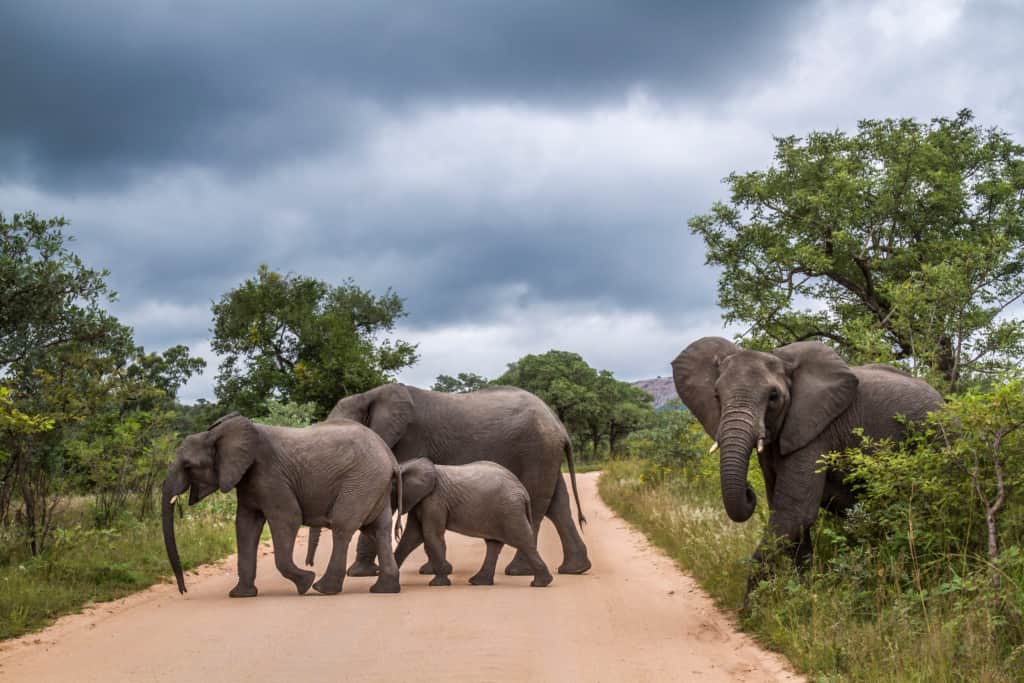
As South African safaris go, visitors to the park are in for a treat with the Big Five present. Kruger Park has an amazing variety of wildlife with the big cats found and the lion, in particular frequently seen in the south of the park.
White rhino are under threat from a dramatic increase in poaching in recent years, but you still have a reasonable chance of spotting one. Buffalo and elephant are easily seen throughout.
Graceful antelopes are a highlight of Kruger. Impala, greater kudu and waterbuck are common. Two secretive species to look out for are steenbok and common duiker.
Kruger supports the world’s largest population of white rhino, estimated at 8,000, despite a recent increase in poaching. Black rhino are rarer and seldom seen. The endangered wild dog lives in large groups that range far and wide, although it is rarely spotted.
A fine selection of different predator species are endemic to Kruger. With the exception of the Cheetah and Wild Dog, many animals are most active from dusk to dawn.
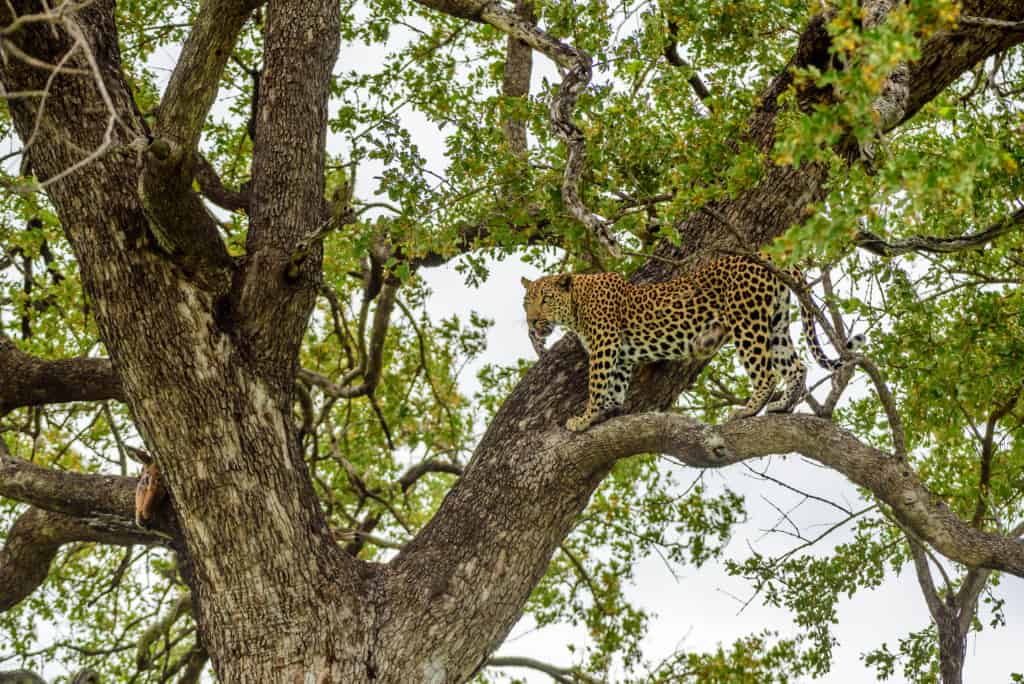
More than 500 bird species have been recorded in the greater Kruger area, representing roughly 60% of the total for South Africa. This includes more than 50 migratory species, most of which arrive from Eurasia or elsewhere in Africa in November and depart in April.
Kruger is the best place in the country to see birds of prey; around 55 diurnal and 11 nocturnal species have been recorded. The less visited northern part of the park offers the best bird watching.
All the rest camps including the Punda Maria tend to be hotspots because there is a high concentration of trees and shrubs. Notable birds include the Lilac-breasted roller, Bateleur and the Saddle-billed stork.
The vegetation is mostly mixed woodland with sour grasses such as fine thatching grass (Hyparrhenia filipendula) and yellow thatching grass (Hyparrhenia dissoluta).
404 tree species have been identified in the Kruger. The most notable include the Baobab (Adansonia digitata), Fever Tree (Vachellia xanthophloea), Knob-thorn (Senegalia nigrescens), Marula (Sclerocarya birrea) and the Mopane (Colophospermum mopane).
The Baobab is arguably the most iconic of the Big 5 trees listed and most people are simply amazed at their size and how long they live. The Baobab is part of the genus (Adansonia) of which there are 9 species in the world.
Within Kruger, this species is most commonly found north of the Olifants River where it prefers deep, well-drained soils found in rocky areas and in alluvial plains.
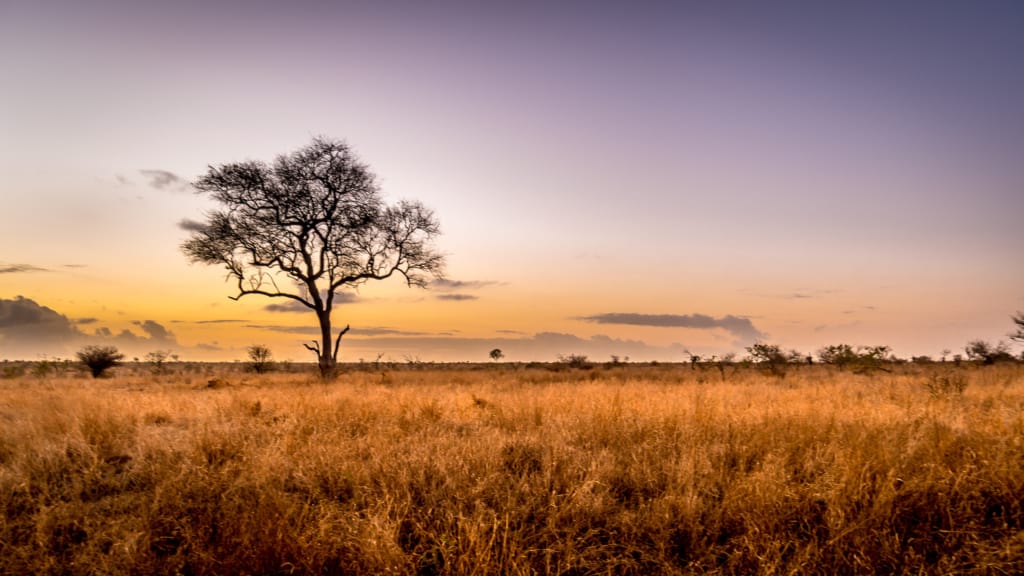
Other activities at Kruger National Park
Other South African activities that visitors to Kruger National Park can look forward to on their trip:
- Game drive: Exploring Kruger National Park’s wildlife with spectacular views of large concentrations of elephants and buffalo and big five animals.
- Fly in safari: Discover the incredible Kruger from the skies above! Up in the air, you’ll truly have a birds eye view of the stunning landscape and wildlife below, taking photos that you’ll treasure for a lifetime.
- Sundowners: On floating pontoons, go game viewing by boat, sunset cruises and canoeing adventures, a great way to relax. From a houseboat, you can watch wildlife at the water’s edge at prime times and enjoy wonderful passing scenery whilst cruising along.
- Bush walks: Walk with professional guides at a peaceful, relaxed pace through the extraordinary Kruger National Park NP where you can see birds, wildlife and beautiful tree species.
- Blyde River Canyon Nature Reserve: The third-largest canyon in the world, which boasts cliffs that rise nearly 2625 feet (800 meters) from the river bed below. Adventurous travelers can explore the canyon’s lush green scenery, waterfalls, and wildlife on hikes, boat excursions, and rock climbing adventures.
- Moholoholo Wildlife Rehabilitation Center: Home to some of South Africa’s fiercest animals—lions, leopards, wild dogs, and even honey badgers. The center helps travelers understand the plight of endangered species in the bush through education programs and guided tours.
- Mpumalanga Panorama Route: Includes historic mining towns, beautiful waterfalls, lofty views, a gorgeous canyon, and lots of wildlife. Nearby attractions include the viewpoint called God’s Window. From there, you can enjoy the views over Blyde River Canyon and see the collection of dramatic waterfalls near Sabie.
- Golfing: Kruger sports four courses for you to try your hand at. The Sabie River golf course, the Leopard Creek golf course, Skukuza and the Hans Merensky golf course. As the Park enjoys a sub-tropical climate, golf is best played in the cooler months of winter.
- Mountain biking: Swapping four wheels for two may be a wise choice. The most prestigious wilderness trails can be found at Olifants Camp where you will be supplied with all the equipment you need.
- Bird watching: This has become a very popular activity in Kruger, mostly due to the hugely diverse selection of birds. Birds are in abundance throughout the park but the Northern area of the park is particularly favored. Some of the birds that are found here can be seen nowhere else in Southern Africa.
- Night Rest Camp Open Vehicle Safari Drive: Experienced guides drive groups to spy on Kruger’s nocturnal creatures and their secretive activities. Learn about fauna and flora from our expert guides and return to camp with a spot-lit night drive.
How to get to Kruger National Park?
To get to South Africa and indeed Kruger, most visitors fly into O.R. Tambo International Airport (JNB) near Johannesburg. From here a connecting flight goes to Kruger Mpumalanga International Airport (MQP), which lies 40km/25mi from southern Kruger’s Numbi Gate. Alternatively, fly to Hoedspruit (for the central and northern sections) or Phalaborwa (for the northern section).
It is also possible to take a scheduled flight to Skukuza Airport inside the park and Federal Airlines (see below) offers scheduled flights to some of the lodges’ airstrips.
Kruger NP is a popular self-drive destination. You could hire a car in Johannesburg and drive to the park. The park has nine entrance gates, the closest of which, Numbi Gate, is 375km/235mi from Johannesburg’s O.R. Tambo International Airport. The drive takes at least four hours.
Carrying a small amount of South Africa currency , the rand (ZAR) is advised for smaller purchases.
Tariffs & Regulations
Entrance fee.
All Kruger National Park fees are payable at the gate at time of entrance. Park fees are valid for 24 hours.
- International Visitors: 440 ZAR (USD 26.50) per adult, per day and 220 ZAR (USD $13.20) per child, per day.
- South African Citizens and Residents: R110 per adult per day & R55 per child per day.
- SADC Nationals (with passport): R220 per adult, per day & R110 per child, per day.
Regulations
If you keep to park rules, you can stay with the animals as long as they are not disturbed by your presence.
Accommodation at Kruger National Park
Tour visitors at Kruger NP can choose from a number of different options when deciding where to sleep with accommodation ranging from luxury safari lodges to lower budget camping.
Jock Safari Lodge offers guests the experience of an old world safari in the southern area of Kruger National Park. Each luxury suite has its own private deck, sala and plunge pool and guests can enjoy Big 5 wildlife sightings from the lodge.
This historic safari lodge was the first private lodge to be built in the heart of Kruger National Park at the confluence of the Mitomeni and Biyamiti rivers. The lodge’s two spacious decks offer stunning views over a pool and the river.
There is an ambiance of a bygone era, and decor incorporates elements of the past, as well as indigenous Zulu and Shangaan cultures. The lodge has exclusive traversing rights in an area that is regarded as one of the best in the Kruger National Park for its Big Five wildlife sightings.
A great alternative is the Pondoro Game Lodge, set on the banks of the Olifants River, this luxury lodge occupies 98,840 acres of Balule Private Game Reserve.
Guests can expect an intimate and luxurious safari adventure like no other, a truly bespoke experience while offering guests a wide range of activities ranging from safari drives to romantic picnics at this treehouse hide.
The lodge is the perfect spot to sit back, relax and become one with nature.
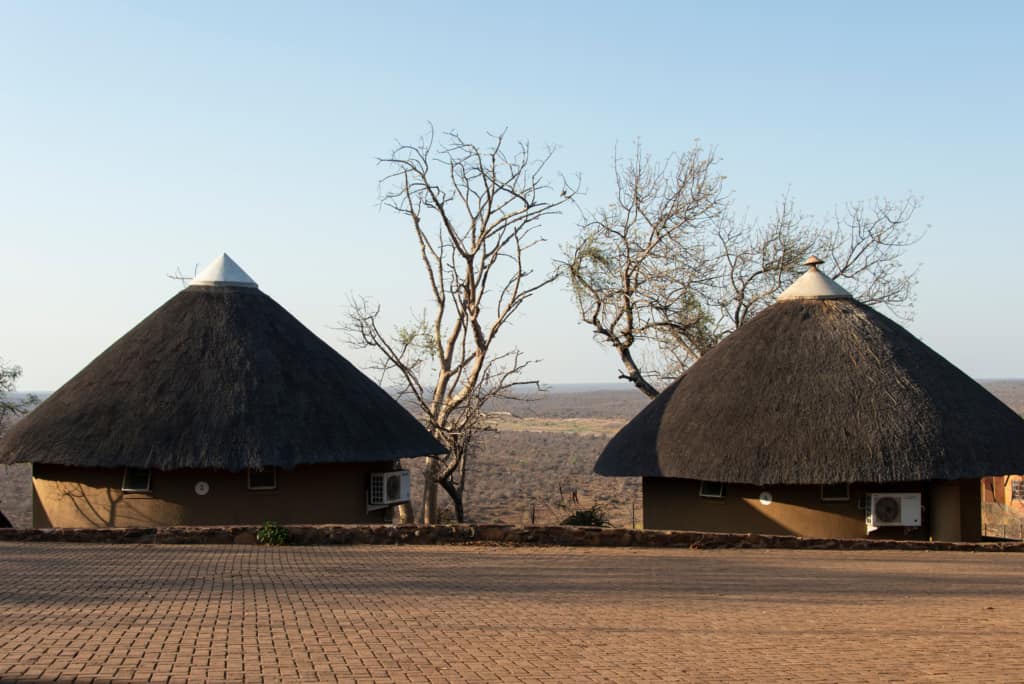
Campsites are available with or without power points and all have access to clean communal ablution blocks. If you stay at Balule Rest Camp, which only has campsites and basic huts for accommodation, you might see the two local hyenas circling the camp fence in the evening.
Balule is a rustic camping place with no electricity points and only gas lighting in the ablution block. It’s a very nice experience nevertheless. In this quieter environment, you feel closer to nature and you can catch a beautiful glimpse of the stars at night.
An alternative is Berg-en-dal rest camp, ringed by lovely natural scenery in a mountainous environment and feels quite chilled out. On the northern and southern sides, dry riverbeds border the camp, with large trees alongside.
The best sites are along the fence with views of big mammals (elephants and rhinos are commonly seen through the wire). It’s a simple camping experience with ample ablution blocks, clothes lines, electric urns for hot water and two-plate stoves as an alternative to a braai (barbeque).
Guests on a self-drive safari with a campervan can make significant savings by sleeping in their vehicle.
Bars/restaurants/amenities
Lodges will typically have all meals and drinks included in the lodge package.
Useful information
Kruger National Park occupies a large part of north-eastern South Africa. It is one of the largest national parks in the world, with an area of 19,485 km2 (7,523 sq mi). The park is approximately 360 km (220 mi) long, and has an average width of 65 km (40 mi).
Visits to Kruger are often combined with trips to Sabi Sands , MalaMala Private Game Reserve or Phinda Game Reserve .
The climate of the national Kruger park is subtropical. There is a rainy and dry season which means summers are very wet, winters extremely dry.
The park experiences winter and summer at the opposite times to Europe and North America. The wet summer months (October to April) are hot and often humid. Dry winters (May to September) are warm and mild although it cools off considerably at night.
It is advisable to take warm clothing for early morning and evening game drives.
There is virtually no rainfall during the whole of winter, and the humidity is very low. Animals are attracted to permanent water sources as water becomes scarce in the bush.
- May : This is a transitional month and marks the end of summer. Temperatures are cooling down to typically 12°C/54°F in the morning and 27°C/81°F in the afternoon.
- June, July & August : Morning game drives in open vehicles will be cold, so it’s recommended to pack warm winter clothing. The average morning temperature is 10°C/50°F. Afternoons will be pleasant with temperatures around 26°C/79°F and cloudless skies.
- September: The heat gradually builds to about 29°C/84°F in the afternoon, and the first rains bring relief from very dry conditions. Mornings are less cold with temperatures around 14°C/57°F.
Best time to go
Understanding the best time to visit South Africa is important as this will impact accommodation, flight prices, availability and the weather that visitors can expect on their safari vacation. A South Africa visa for entry may also be required.
Although some visitors might prefer the lush vegetation of the summer months, the best time for observing African wildlife in Kruger National Park is the dry winter season. The bushveld is more open, allowing for better visibility.
Kruger is a high risk malaria area from the months of October to May. It is a well-known fact that malaria is one of the most serious and common tropical diseases in the world.
However, there is no reason why this disease should deter you from coming to the Kruger National Park if the necessary precautions are taken.
Antimalarials and other vaccines for South Africa are advised, as well as covering up in the evening and using mosquito repellent (those containing DEET are most effective).
It is recommended to visit a travel clinic before coming to South Africa. Several South Africa vaccinations are recommended and usually administered before your departure.
Where is Kruger National Park located?
Kruger National Park, in northeastern South Africa and typically accessed via chartered flight from Johannesburg or Cape Town.
What animals will visitors see at Kruger National Park?
Visitors to Kruger National Park will see the Big Five including the elephant, buffalo, rhino, giraffe, zebra, wildebeest, kudu, impala, waterbuck, warthog, hippo, crocodile, hyena, lion, leopard, wild dog, cheetah and various smaller antelopes and predators.
How much is the Kruger National Park entrance fee?
The entrance fee for Kruger National Park for international visitors is 440 ZAR (USD 26.50) per adult, per day and 220 ZAR (USD $13.20) per child, per day.
- Skip to primary navigation
- Skip to main content
- Skip to primary sidebar
- Skip to footer
TravelAwaits
Our mission is to serve the 50+ traveler who's ready to cross a few items off their bucket list.
Kruger National Park: Everything You Need To Know Before You Visit

Heide Brandes
- Activities and Interests
- Africa National Parks
- Destinations
- National Parks
- South Africa
Heading down the dusty roads of Kruger National Park in far northeastern South Africa, our safari vehicle slowed to a halt as yet another herd of elephants began stomping across the road like giant wise guardians. Just minutes before, a pod of lanky giraffes caused our vehicle to stop for a while, and a wary group of water buffalo, with their meaty bodies and curling horns, watched us as we passed. Somewhere in the distance, a lion roared.
This is Kruger National Park , 7,580 miles of wild lands that are home to 500 bird species and 145 mammal species, including elephants, black and white rhinos, giraffes, zebras, antelopes, hippopotamuses, and lions. Located in the heart of the Lowveld, the entire park is a wildlife reserve and is bigger than the country of Israel. For many, Kruger National Park is a bucket-list destination, a glimpse of wild Africa.
Kruger National Park, originally known as the Sabi Game Reserve, was founded in 1898 by Paul Kruger, who wanted to protect the animals of the game reserve. On May 31, 1926, Kruger’s dream came true when the National Parks Act was passed. The Sabi Game Reserve and the neighboring Shingwedzi Game Reserve were combined to create Kruger National Park.
Today, roughly 950,000 people visit Kruger National Park every year, and the majority of the visitors — a whopping 80 percent — are South Africans. The park boasts more than 1,500 miles of all-weather roads that allow visitors to explore the park in their own vehicles, but safari guides are readily available as well.
Whether you decide to tour Kruger on your own or sign up for a safari, we have everything you need to know to get the most out of your visit to this important, awe-inspiring, and massive park.

When To Go To Kruger National Park
The dry winter months between May and September are generally the best times of year to visit Kruger National Park because the bush thins out a bit, making the animals easier to spot. September is a popular month, since the night and morning are less chilly.
The wet season between October and April has its advantages, however. The land turns green and lush, and many of the animals start having babies. Migratory birds are also plentiful around this time of year, but the days can be muggy and humid. The bugs are also out in force, so this is the time to take antimalarial medication, just in case.

How To Get To Kruger National Park
Flying into South Africa is by far the easiest way for international tourists to visit the park. There are four airports that serve the park: the Hendrik Van Eck Airport in Phalaborwa in northern Kruger, Hoedspruit Airport in the central region, the newly opened Skukuza Airport , and the Kruger Mpumalanga International Airport in the southern area.
That being said, most international visitors fly into the Johannesburg O.R. Tambo International Airport , where daily flights are offered between Johannesburg and many of the regional airstrips surrounding Kruger. The flights take about 90 minutes and can drop you off at the airstrip in the park closest to the lodge where you are staying.
Daily flights also operate to Skukuza from Cape Town . The Kruger Mpumalanga International Airport also operates daily flights from Durban and Cape Town, and another flight is available from Cape Town to Hoedspruit. Many of the lodges offer transport to and from the regional airports.
You can also rent a car and drive from Johannesburg to Kruger National Park, especially if you plan to take a self-guided tour of the park. The drive is approximately 5 to 7 hours, but it will give you the freedom to stop at other attractions along the way.

Where To Stay In Kruger National Park
Where you decide to stay depends on what kind of Kruger experience you want.
Kruger National Park has camp-run accommodations , and each camp has its own unique offerings, ranging from basic camping to the quintessential safari tents to luxury lodges. Kruger has 10 luxury safari lodges you can book, and the surrounding private game reserves offer luxury accommodations, meals, and highly trained personnel. The private lodges include Londolozi Founders Camp , Mala Mala Main Camp , Londolozi Varty Camp , and Sabi Sabi Bush Lodge . You may also consider the newly built Skukuza Safari Lodge in Kruger.
The average length of stay for a safari in Kruger is a minimum of two nights up to a week. If you plan to stay for more than four days, consider choosing two separate lodges so that you can enjoy a nice variety of experiences, animals, and foods.
Pro Tip: If you do opt for a private game reserve, know that these reserves are not fenced off from predators. Lions, leopards, elephants, giraffes, and zebras can wander through the camp, so exercise extreme caution and never walk around unaccompanied after dark.

Should I Explore The Park On My Own Or Take A Guided Safari?
When I visited Kruger National Park, the group I was traveling with opted for a self-guided tour of the game reserve. Luckily, our driver was well versed in how to spot animals in the park, but having a true safari experience is worth the cost and consideration as well.
If you opt for a game drive , you’ll have plenty of options to choose from. Morning drives, sunset drives, and even nighttime drives can be booked at the park, and an experienced and knowledgeable guide will point out wildlife and information you likely wouldn’t notice on your own. Most lodges and private lodges offer their own driving and walking safaris as well.
If you choose to explore the park on your own, maps will be your best friend. A great list of maps can be found here .
If you want the best of both worlds, Kruger offers a Park & Ride program. Just park at a select gate and hop on a safari ride through the park to see the Big Five and more.
Pro Tip: Kruger also offers safari adventures for the disabled .

How To Prepare For A Safari Bush Drive
You wake up in your safari tent or in your luxury lodge room excited for the day and the chance to see the famous wildlife of Africa. The golden hours of safari are typically the early morning, sunset, and nighttime, so try to book your drives during those hours, when the animals are more active.
To have a good Kruger experience, plan to bring items like binoculars, insect repellent, a camera, a map, plenty of bottled water and snacks, and a hat and sunscreen to protect against the African sun. You’ll also want to pack a couple of light T-shirts, a few long-sleeved shirts for the chilly nights, a rain jacket if you’re visiting during the rainy season, good walking shoes, shorts and long pants, and a hat.
Avoid wearing white, which makes you very visible to the animals. Red attracts some animals, and bright blue can attract biting flies. Stick with neutral colors like sand, brown, and muted green.
Remember, you are in the wild. Never approach wild animals, and do not get out of your vehicle unless you are in a designated “hide” area. Every year, there are fatalities because a careless tourist got out of their vehicle to take a closer look at an elephant or lion. Also, keep your windows up when possible. Baboons can be pretty aggressive about snatching food out of vehicles.
Don’t swim in the rivers and lakes in Kruger. Hippos are the most dangerous of all the big animals, are very territorial, and run faster than humans do. Crocodiles can also ruin your day if you get too close.
Always listen to your guide, if you have one. If they say not to run, then don’t run. If they say to move away, then move away. Your guide’s job is to keep you safe in one of the world’s last true wildernesses, so trust that they know what is best for you.
Pro Tip: Your guides and spotters work hard, so expect to tip each of them anywhere from 50 to 150 rands per day. If you have the same guide each day, err on the side of tipping well. If you don’t know how much to tip the guides or staff, ask the tour operator or the concierge at your lodge. While most tips are in the South African rand, American dollars are appreciated as well.

Medical Tips And Advice
No one wants to get sick or injured while on an epic safari, but if something does happen, South Africa has plenty of clinics, hospitals, and medical personnel. That being said, you should have medical insurance or travel medical insurance. If you do an internet search for “travel medical insurance,” you’ll find plenty of affordable options.
While South Africa is mostly malaria free, Kruger National Park does have some areas where the malarial mosquito is found. Antimalarial drugs are available at pharmacies in South Africa and by prescription from your doctor.
The water is safe to drink in South Africa and at Kruger National Park, and many of the lodges and hotels provide bottled water as well.
Be aware that HIV is still a concern in Africa, so avoid contact with bodily fluids and do not have unprotected sex.

Other Activities In Kruger National Park
Kruger National Park isn’t just about game drives and safari walks.
Golfing enthusiasts will be thrilled with the Skukuza Golf Course , which was built in 1972. The course is designed for golfers of all levels, but again, you may have a few run-ins with the local wildlife, since the golf course isn’t fenced in.
Mountain biking , group backpacking with a trail leader , and birding are also popular activities at Kruger National Park. The 4×4 Adventure Trails , which get you off the beaten track to areas of park that are rarely seen, are also worth checking out.
Many of the luxury lodges offer spa experiences as well as swimming pools, chef-inspired meals, full bars, and all the bells and whistles. You will not get bored — trust me!
And speaking of meals, a bush braai is a not-to-be-missed experience. A braai (barbecue) around the boma (outdoor enclosure with a fireplace) is available at most of the camps in Kruger, and it usually includes a choice of three grilled meats, salads, breads, drinks, and desserts. If you book a night game drive, you can also book a braai in the middle of the Kruger bush under the night sky. Available at all rest camps, this 3-hour experience requires booking in advance.
Pro Tip: Bring a good book or two. During the high heat of the day, when the animals are hunkered down and being lazy, you’ll want to take advantage of the down time to relax, read under some shade, and just appreciate the experience of being in Africa.

Heide Brandes is an award-winning journalist and travel writer based in Oklahoma. She loves outdoor adventures, exploring different cultures, and finding off-the-wall, bizarre, and wondrous experiences to enjoy. Heide writes for numerous national and international publications and is an award-winning member of the Society for Professional Journalists, North American Travel Journalists Association, and Society of American Travel Writers. Besides traveling and writing, Heide is also a professional Bellydancer, a medieval re-enactor, and a quirky chick who lives in Oklahoma City.
- [email protected]
- Plan my Safari
Budget Kruger Park Safari
Budget kruger national park safaris.
Budget Kruger Park Safari offer all the fun without too many of the frills to keep the price as low as possible. We choose quality 3-star accommodation in a combo of safari tents and treehouses and make certain activities, meals and drinks optional.
Filter Results
3 Day Camping Kruger Safari
A camping safari trip into the Heart of the Kruger National Park for three days is a great way to get away from it all and relax. Almost everyone who comes to this part of the African continent will want to check off an authentic African safari in Kruger National Park. South Africa’s most famous wildlife reserve has earned its spectacular reputation in part due to the incredible variety of animals and plants that can be found there. It is no wonder the Kruger Safari Co.’s three-day camping safari is such a popular option for seeing the region’s breath-taking scenery.
You might also like our 4-Day Camping Kruger Park Safari Tour or 5-Day Camping Kruger Park Safari Tour .
- Collection from OR Tambo Airport Bus Terminals by 07:00am
3 Day Greater Kruger Budget Glamping Safari
If you’re looking for an affordable glamping accommodation in the Greater Kruger National Park, the Sekekama Tented Camp offers budget-friendly options. Accommodation include solar-powered tents, complete with beds, linens, towels, and other necessities. The camp features shared ablution facilities and a communal area for dining, socializing, and relaxation. Additionally, guests can enjoy game drives and may have access to extra amenities like a swimming pool, bar, or restaurant, enhancing the overall experience.
3 Day Kruger Park Adventure Safari
Our Kruger Adventure Safari is tailored for guests seeking an adventure to the famed Kruger National Park without breaking the bank. We’ve crafted a cost-effective Kruger Park Safari, offering exceptional value for the chance to spot the Big 5 at an affordable price. Over three days, immerse yourself in some of South Africa’s premier wildlife destinations!
3 Day Tented Safari
The lodge is located in Motlala Game Reserve which forms part of the Greater Kruger National Park. The tour includes sunset game drive in Motlala Game Reserve, a full-day in the iconic Kruger National Park and a magical sunrise bushwalk along the Klaserie River. Evenings are spent under the stars enjoying an authentic African bushveld braai (barbeque). The tour ends with a scenic drive back to Johannesburg via the Panorama Route to view the Three Rondavels which stand sentry over the Blyde River Canyon.
3 Day Treehouse Lodge Safari
This renowned three-day economical tree house safari presents guests with a genuine safari adventure, where they stay in a unique treehouse located within a private camp situated in Motlala Game Reserve. Covering 3,000 hectares, this reserve is dedicated to wildlife conservation and is part of the Greater Kruger region, conveniently located less than an hour’s drive from the renowned Kruger National Park.
4 Day Classic Camping Kruger Safari Tour
Enjoy your Kruger National Park safari trip using our four day camping safari tour option for an adventure to find Africa’s Big Five: Elephant, Lion, Rhino, Leopard, and Buffalo.
The Kruger National Park is well-known for its incredible biodiversity as well as its rich cultural history. This tour provides an extensive experience of an outstanding wilderness region that is part of the internationally designated Kruger2Canyons UNESCO Man and Biosphere Reserve.
The four day Kruger camping safari tour is the ideal option for travellers on a tight time schedule. It’s a chance to explore the southern section of the iconic Kruger National Park and get a taste for why South Africa’s oldest and largest national park is one of the most popular safari destinations in Africa.
Guests stay in tented accommodation fully equipped for comfort and convenience at Pretoriuskop Rest Camp in the Kruger Park that is fully equipped for comfort and convenience.
You might also like our 3-Day Kruger Camping Safari Tour or 5-Day Kruger Camping Safari Tour
4 Day Greater Kruger Budget Glamping Safari
Embark on a 4-day budget-friendly glamping adventure in Kruger National Park with The Kruger Safari Co, immersing yourself in the best of Africa at an incredible rate. The Kruger Safari Co’s Kruger Park package has swiftly gained popularity, thanks to its exceptional accommodations at surprisingly affordable prices.
Sekekama Tented Camp offers exceptional value for money with fully solar-powered tents, that provide all the comforts of home, including beds, linens, towels, and more. The camp features a communal area designed for dining, socializing, and relaxation, along with game drives. Optional additions like a pool, bar, or restaurant enhance the overall experience, ensuring a well-rounded and affordable glamping adventure.
4 Day Kruger Park and Panorama Adventure Safari
Our Ultimate Budget Kruger Safari is designed for those guests who would like to experience a safari to the world-renowned Kruger National Park, whist traveling on a budget.
4 Day Tented Safari
Kruger Safari Company is one of South Africa’s preferred safari providers. For the last 15 years , we have been taking guests on safari trips throughout South Africa with one of our more popular safaris being those that take guests into the African wild. When taking guests to game parks, wildlife reserves and the Kruger National Park , Kruger Safari Company is committed to giving guests the most memorable experience possible. We are also committed to making every one of our safaris eco-friendly and sustainable for the environment.View our 3 Night / 4 Day Kruger Park Safari Details below.
4 Day Treehouse Lodge Safari
Our 3 Night / 4 Day Kruger Park Treehouse Safari is ideal for couples and single travelers looking for a busy and exciting experience to the Kruger National Park.
5 Day Greater Kruger Budget Glamping Safari
In the Motlala Reserve, The Kruger Safari Co presents the Sekekama Tented Camp, offering well-equipped glamping at an affordable rate. Knowledgeable guides lead wildlife drives in comfortable open-air game viewing vehicles, providing an immersive experience.
Sekekama Tented Camp offers exceptional value for money with fully solar-powered tents or cottages that provide all the comforts of home, including beds, linens, towels, and more. The camp features a communal area designed for dining, socializing, and relaxation, along with game drives. Optional additions like a pool, bar, or restaurant enhance the overall experience, ensuring a well-rounded and affordable glamping adventure.
5 Day Kruger Park and Panorama Adventure Safari
5 day kruger tented & greater kruger lodge combo safari.
Experience the thrill of a safari in South Africa’s Kruger National Park. Day 1 begins with a pickup from Johannesburg OR Tambo Airport and transfer to a non en-suite tented camp in Pretoriuskop rest camp. Enjoy an afternoon open vehicle safari, followed by a dinner under the stars. Day 2 offers a full day of exploration with open vehicle safaris and the freedom to choose your own lunch. Day 3 takes you to the Greenfire game lodge in the Balule private game reserve for off-road safaris. Day 4 continues the adventure with morning and afternoon safaris. Day 5 concludes with a final morning safari and breakfast before heading back to the airport.
5 Day Tented Safari
4 Night / 5 Day Kruger National Park Budget Camping Safari. Spend 1 night in a wonderful lodge and then 3 nights in a tented lodge, both situated in the Greater Kruger National Park.
5 Day Treehouse Lodge Safari
The 4 Night / 5 Day Kruger Park Tree House Safari package includes all accommodation, breakfast and dinner daily,safari drives in open 4×4 vehicles, visit to a wildlife rehabilitation center, guides safari walks and the Blyde River Canyon.
5-Day Camping Kruger Safari
Almost everyone who comes to this part of the African continent will want to check off an authentic African safari in Kruger National Park. A camping safari trip to the park for five days is a great way to get away from it all and relax.
You might also like our 4-Day Camping Kruger Park Safari Tour or 3-Day Camping Kruger Park Safari Tour .
6 Day Kruger Tented & Greater Kruger Lodge Combo Safari
Experience the thrill of a 6-day safari adventure in Kruger National Park. Begin by being picked up from Johannesburg OR Tambo Airport and transferred to a comfortable tented camp in Pretoriuskop rest camp. Enjoy an afternoon open vehicle safari, followed by a delightful dinner under the stars. On Day 2, embark on a full day of exploration, with breakfast provided en route and the freedom to choose your own lunch arrangements. Return to the camp for a relaxing dinner. Day 3 takes you to the Greenfire game lodge in Balule private game reserve for off-road safaris. Day 4 and 5 offer immersive open vehicle safaris from Greenfire lodge, observing abundant wildlife and breathtaking landscapes. Conclude with a memorable morning safari on Day 6 before departing for Johannesburg. An unforgettable journey through nature’s majesty.
6 Day Tented Safari
The 5-night/6-day Kruger safari offers guests a genuine African safari experience, staying in rustic but comfortable accommodation in the Greater Kruger which shares an unfenced border with the iconic Kruger National Park.
6 Day Treehouse Lodge Safari
The 5-night/6-day Kruger safari tour offers a different and exciting trip to guests who don’t mind roughing it slightly to enjoy the privilege of a unique African bushveld experience. Guests stay in rustic but comfortable treehouses at a bushveld lodge.
Budget Kruger Park Safari Holidays
The best thing about Kruger Park is you can do it on a budget and still have a fantastic safari holiday. Kruger is South Africa’s favorite national park for a reason; it’s affordable for your average family on a budget both from a travel and accommodation perspective.
Kruger Park is a state-supported national park that’s managed by South African National Parks (SANParks). The bulk of Kruger accommodation is budget-friendly, self-catering units in large rest camps. You also have the option of satellite and bushveld camps that are located off the beaten track and offer a quieter, more authentic safari experience.
3 reasons why Kruger Park is perfect for a budget safari holiday
Whether you’re spending hard-earned South African Rands or foreign currency, Kruger National Park offers visitors a wide choice of affordable accommodation, it allows self-drive safari tours and the Park is easy to get to Johannesburg. The three things that make an African safari holiday more affordable.
Kruger Park offers a wide range of affordable self-catering accommodation
Kruger’s self-catering accommodation allows visitors on a safari budget to bring their own food and drinks, and they can cater for their holiday based on their financial means. There are restaurants or takeaway eateries at the main rest camps for those that want a break from self-catering.
Kruger Park is easy to get to from Johannesburg and country towns
Southern Kruger is the closest section to Johannesburg and the most popular for day visits and longer safari holidays. Five out of the 9 Kruger entrance gates are located in southern Kruger and they’re all easy to reach off the main highways.
For overseas visitors, there is a big cost savings when you book a safari tour to Kruger Park because it doesn’t involve multiple flights. For example; a direct long-haul flight from London to Johannesburg is about 11 hours, compared to London to Maun in Botswana which is 16 hours. Once in Botswana, you then need to budget for a connecting flight to Kasane and either a private charter or safari shuttle to Chobe.
The costs of multiple flights and shuttles to safari destinations in countries like Botswana, Zambia and Tanzania add up which is why these destinations are significantly more expensive for safari tours than the national park and private game reserves in South Africa.
Kruger Park allows self-drive safaris tours
Having your own car means you’re free to explore Kruger Park at leisure and you can stop at popular bushveld sites for a picnic or braai (BBQ). Pack a cooler box with snacks and drinks and park at one of the many popular waterholes in Kruger Park. You’ll enjoy wonderful animal and bird sightings without it costing you an arm and a leg.
Types of accommodation in Kruger Park for a budget safari
Kruger rest camps.
The rest camps in Kruger Park offer a choice of self-catering rondavels (round huts) or bungalows, chalets and family cottages. The main rest camps have caravan and camping sites.
Hut facilities:
- one room with single beds
- linen, blankets and bath towels
- fan or air-conditioning
- communal ablutions
- communal kitchen
- no utensils
- braai (BBQ) area
Bungalow facilities:
- small fridge
- ensuite bathroom
Family cottage facilities:
- 2 bedrooms with 2 single beds
- air-conditioning
- fully equipped kitchen
- shared bathroom
- television with limited DSTV channels
Kruger Bushveld Camps
Kruger bushveld camps offer self-catering accommodation in more remote areas. Loyal Kruger visitors love to stay in the bushveld camps because they offer a more intimate, rustic and off-the-grid safari experience in pristine wilderness. The bushveld camps are so popular, they’re often booked up to a year in advance.
There are 5 bushveld camps in Kruger Park:
- Bateleur – northern Kruger, south-west of Shingwedzi Rest Camp
- Biyamiti – southern Kruger, between Berg-en-Dal and Crocodile Bridge rest camps
- Shimuwini – northern Kruger, north-west of Letaba Rest Camp
- Sirheni – far-north Kruger, south-east of Punda Maria Rest Camp
- Talamati – central Kruger, south-east of Orpen Rest Camp
Access to the Kruger bushveld camps is limited to paying guests. There are no day visitor facilities or camping sites and no restaurants, shops or fuel pumps. The access roads to the bushveld camps are private as well as the roads around the camp. It’s the ideal place to stay in Kruger Park to truly immerse yourself in the bushveld without the tourist crowds.
Bushveld camp facilities:
- self-catering units
- 1 or 2 rooms with single beds
- electricity for lights and fridge, no plug points for electric equipment
- open veranda with small kitchenette
- cutlery, crockery and basic kitchen utensils
- four-plate stove (oven in bigger units)
- communal freezing facilities
Kruger Bush Lodges
There are 4 Kruger Bush Lodges, located in the northern section of the Park. The self-catering bush lodges are booked on an exclusive-use basis and offer families and groups of friends an intimate and private safari experience.
Each bush lodge has a camp manager and a dedicated game ranger who takes guests on guided bushveld walks. Located in remote areas in stunning bushveld surrounds, the Kruger Bush Lodges are perfect for avid wildlife and birders who want an authentic safari experience without low tourist numbers.
The lodges sleep a maximum of 8 people and have modern amenities for comfort and convenience. This includes a daily housekeeping service and a personal cook. Daily guided wilderness walks are the main attraction but guests are also taken on game drives in an open safari vehicle. Guess must be 13 years and older to participated in guided bushveld walks.
Bush lodge facilities:
- 3 to 4 rooms, sleeping up to 8 guests
- ensuite and shared bathrooms
- fully-equipped kitchen
- open-plan lounge and dining area
- outdoor entertainment area
- braai (BBQ) facilities
- daily housekeeping service and personal cook
Kruger Park Satellite Camps
There are 4 satellite camps in Kruger Park. They’re very popular with the backpacking, camping and caravanning community and are booked well in advance.
Each satellite camp is located close to a main rest camp but far enough away to escape the busy crowds. They’re limited to a small number of self-catering units and camping facilities. There are no restaurants, shops or fuel pumps at the satellite camps.
The four satellite camps are:
- Malelane Camp, next to Berg-en-Dal Rest Camp
- Maroela Camp and Tamboti Camp, next to Orpen Rest Camp
- Balule Rest Camp, next to Satara Rest Camp
- single beds
- bathroom with a shower
- cutlery, crockery and utensils
Top 10 Kruger Park activities that won’t break the budget
Game drives in your own car.
Daily game drives are the main Kruger Park activity and having your own car means you can leave the camp when you want to and stay out as long as you like, getting back in time before the gates close.
Kruger Park is vast; it covers an area of 2 million hectares (20 000 square) kilometres and it’s a maze of main roads and gravel roads. Buy one of the glossy Kruger Park Map & Guide books on sale at the entrance gates; they’re very detailed and are an excellent resource, particularly if you’re visiting Kruger Park for the first time.
Guided bushveld walks from the main rest camps
Early morning and afternoon guided walks are offered by most of the main rest camps. Up to 8 people at a time are taken on a walk in the company of an armed field guide to explore the bushveld around the camp.
Guided bushveld walks are an opportunity to learn more about the delicate ecosystem and the small but vital elements that are often missed when driving around in a car.
The walks are relaxing and not too strenuous. Your guide is extremely knowledgeable and makes your safety a priority. Guests must be 13 years and older to participate in guided bushveld walks in Kruger Park. Only guests who have booked accommodation in Kruger Park can book a guided walk.
Guests should wear comfortable walking shoes or boots and clothing suitable for the bushveld. Wear muted colours like the famous safari khaki, not bright colours that will make you stand out in the dry bush.
For more information, speak to the person in charge at the camp reception.
Picnics and bush braais (BBQ)
One of the best things about a self-drive Kruger Park holiday is you have the freedom to drive where you want to go and stop when you want at the many popular picnic spots dotted around the Park. You have a choice of loads of lovely picnic spots in Kruger Park as well as hides, lookout platforms and scenic vantage points.
They’re safe spots to get out of your car as long as you follow the Park’s rules and keep to the designated areas. Buy one of the glossy Kruger Park Map & Guide books on sale at the entrance gates to find the picnic sites in Kruger Park.
Birdwatching in Kruger Park
There are 900 recorded bird species in southern Africa and approximately 500 are found in Kruger Park. The national park attracts an incredible diversity of birds because it covers a vast area and comprises a number of unique ecozones. In summer, between November and February, about 200 migrant species arrive in the region from Eurasia and elsewhere in Africa.
Far-north Kruger Park is regarded as one of the finest birding destinations in southern Africa but you don’t have to travel that far to tick many birds off your list. In fact, you’ll see a wide variety of birds in the rest camps and surrounding bushveld.
Look out for the Big 6 of the birding world in Kruger Park:
- Kori bustard
- Martial eagle
- Lappetfaced vulture
- Pel’s fishing owl
- Saddle-billed stork
- Southern ground hornbill
Mountain bike trails from Olifants Rest Camp
Take a break from sitting in the car and enjoy something totally unique in a national park; a guided mountain bike trail. The mountain bike excursions are run out of Olifants Camp and need to be booked in advance.
The bike trails are similar to guided bush walks where up to 6 people are taken out by two qualified and armed field guides. Olifants Rest Camp supplies the mountain bikes as well as water bottles and helmets if you don’t bring your own. Snacks are also supplied for a picnic break.
Olifant’s mountain bike trails are conducted in the early morning and mid-afternoon, departure times vary depending on the season. The length of time on the bike varies between 3 to 4 hours and the guides take you on one of three different routes which are graded according to difficulty. The cost of a mountain bike trail in Kruger Park is reasonable, ranging from R450 to R800 depending on the time and length.
Play golf at Skukuza Golf Club
Playing golf while on a safari holiday in Kruger Park is a dream come true for avid golfers. Kruger Park is the only national park in southern Africa that has its own golf course. Skukuza Golf Course is located in southern Kruger, just across the river from Skukuza Rest Camp.
The 9-hole golf course is legendary. It was established in 1972 as a recreational facility for Skukuza staff members and later opened to the public. It’s not the most pristine golf course in South Africa but everyone loves playing it. The 19th holes is the best hole.
The golf course isn’t fenced and is open to the Sabie River, so don’t be surprised if you find yourself sharing the fairway with antelope, giraffe and zebra. Watch out for hippo and crocodiles in the water holes.
Overnight hides in Kruger Park
There are 2 overnight hides in Kruger Park which are hugely popular for bushveld sleepouts. They’re booked well in advance so don’t leave it too late to make a booking. The overnight hides are open to the public during the day and become sleepover hides by night.
The facilities are very basic but it’s wonderful to spend a night out in absolute isolation and soak up the peace and tranquility of the beautiful bushveld.
Sable Sleepover Hide is located in northern Kruger, about 10 kilometres from Phalaborwa Gate. It overlooks Sable Dam which attracts an abundance of animals, particularly in the dry winter months.
Shipandani Sleepover Hide is located in northern Kruger, a short 5-minute drive from Mopani Rest Camp. It overlooks the Tsendze River.
Camping in Kruger Park
Camping in Kruger Park is a great way to save money if you’re on a budget. It’s also a huge amount of fun, particularly for families with children. There’s loads of space to play and the main rest camps have a large swimming pool.
The campsites in Kruger Park are well-maintained and the communal ablution and kitchen facilities are serviced daily. You have the choice of a site with or without an electric point. The campsites offer a combination of sites for caravans and tents.
Guided wilderness walking trails
For something far more exciting and challenging than a regular bush walk, put one of the popular Kruger wilderness walking trails on your safari bucket list. This involves serious walking in remote bushveld with the real risk of wild animals all around you. They’re safe because they’re conducted by highly-qualified armed field rangers.
The 6 guided wilderness trails are:
- Bushman Trail
In southern Kruger near Berg-en-Dal Rest Camp
- Metsimetsi Trail
East of the N’wamuriwa Mountain near Tshokwane
Between Skukuza and Pretoriuskop in a game-rich area
- Olifants Trail
Around Olifants and Letaba rest camps in the Big Tuskers area
- Sweni Trail
Near N’wanetsi, overlooking Sweni River
- Wolhuter Trail
Following in the footsteps of the legendary Harry Wolhuter, between Berg-en-Dal and Pretoriuskop
Learn about the history of Kruger Park
Kruger Park is rich in history and you can learn more about its cultural and conservation history by visiting various archaeological sites and the Stevenson-Hamilton Museum. To learn more about the Park’s legendary elephants known as the Magnificent 7, you can visit the Letaba Elephant Hall.
Kruger Park as over 300 archaeological sites and is rich in cultural history. There’s evidence that the region was inhabited over two-and-a-half million years ago and artefacts found in the Park date back to the Stone Age and Iron Age.
The three most significant archaeological sites in Kruger Park that are open to the public are:
- Albasini Ruins
Albasini Ruins are the remains of the 19th century trading post that was established by a legendary Portuguese trader, Joao Albasini. Located close to Phabeni Gate, Albasini’s settlement at Magashula’s Kraal is believed to be the first European settlement in the disease-ridden Lowveld.
This late Iron Age site is located on a prominent hillside about 12 kilometres from the Phalaborwa Gate on the tar road to Letaba Rest Camp. The site was inhabited by a Sotho-speaking Ba-Phalaborwa tribe during the 1800’s who developed an advanced and sophisticated industry of mining, smelting iron ore and trading in these iron products.
Frequently Asked Questions
What type of accommodation can i expect while on a budget kruger park safari.
There are many accommodation options to choose from while on a Budget Kruger Park Safari including cottages, affordable guest houses, bungalows, comfortable tented camps, caravan parks and even a treehouse for the more adventurous.
Which rest camps in the Kruger Park is best suited for a Budget safari?
There are 6 rest camps in the Kruger Park regarded as the best for a Budget Safari namely: Berg-en-Dal in Southern Kruger, Lower Sabi in Southern Kruger, Satara in Central Kruger, Skukuza in Southern Kruger, Olifants rest camp in Northern Kruger and Shingwedzi in Northern Kruger.
Is self-drive safaris allowed in the Kruger Park?
Yes, many visitors to the Kruger Park prefer to do their own driving in their own vehicles because it is much friendlier on their budget than organized, guided game drives in the company of a tour operator.
Why is Lower Sabi so popular among visitors to the Kruger Park?
Lower-Sabie is located in the Southern part of the Kruger, well-known for its high concentration of wildlife. The rest camp is very family-friendly, and self-catering orientated which make it well-suited for visitors on a Budget Kruger National Park Safari.
Which camp in the Kruger National Park is the largest?
The largest camp in the Kruger National Park is Skukuza. It can accommodate up to 1000 visitors in self-catering bungalows (huts), family cottages and guest houses. There are two very good restaurants, a shop, library, outdoor cinema, photographic studio, a playground for the kids, a swimming pool and a river walkway to enjoy. The Skukuza staff village boasts a beautiful 9-hole golf course and an Olympic size pool. Skukuza Airport is a very convenient 10-minute drive from the camp.
Package Safaris:
Payment gateways, accommodation:, extra information:, contact us:.
© 2024 Krugerpark.travel | All Rights Reserved | Privacy Policy | Terms & Conditions The Kruger Safari Co. is a destination management company (DMC) and is not an entity of the South African National Parks Board (SANparks).
Specials Enquiry
Budget kruger park safari enquiry.

Kruger National Park: An Essential Guide to Africa’s Most Iconic Safari Park
Covering an area of almost 2 million hectares, Kruger National Park is one of the largest national parks in the world. It is one of the most popular and famous African safari wildlife parks , and also one of the oldest. Founded in 1898, Kruger is world famous for its incredible wildlife, with hundreds of mammals, birds, and reptiles inhabiting the park.
In this ultimate guide to Kruger National Park, you’ll learn everything you need to know to plan an unforgettable experience. With insider tips on how to visit Kruger National Park and where to stay to the diverse wildlife you’ll find in this iconic national park, you’ll find everything you need to prepare for your ultimate stay.
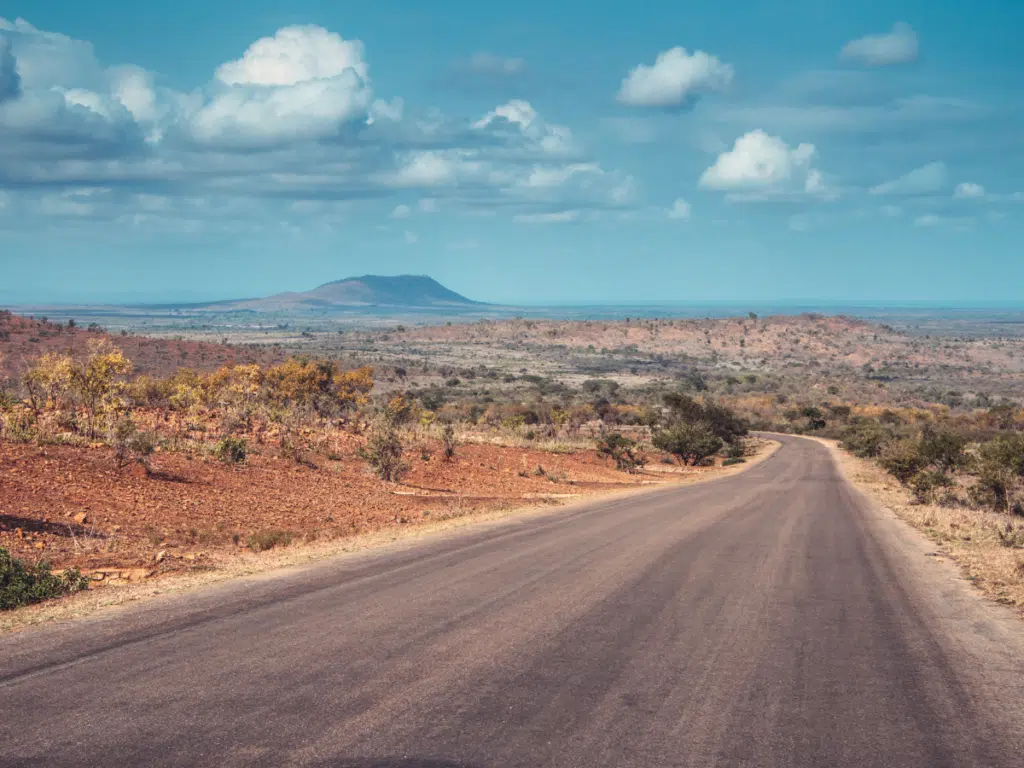
This post contains affiliate links that may reward me monetarily or otherwise when you use them to make qualifying purchases – at no cost to you. As an Amazon Associate, I earn from qualifying purchases. For more information, please read our disclosure policy .
Kruger National Park
Established in 1898 by President Paul Kruger, Kruger National Park in northeastern South Africa is the oldest conservation park in Africa. Now home to an incredible diversity of wildlife including the Big Five animals of Africa , it remains one of the most iconic and well-known safari parks in all of Africa.
Before becoming a national park, Kruger was a popular game reserve owned by the Dutch government. After its initial creation as a national park in 1898, it was expanded between 1903 and 1934 so that it has now covered almost 2 million hectares. The first road to enter Kruger National Park was built in 1927, making it easier for visitors to explore this vast wilderness area.
Today, over 1 million tourists from around the world visit Kruger National Park each year to see its incredible wildlife. Part of the incredible wildlife diversity in the park is due to its six unique ecosystems: grasslands, acacia savanna, thornveld, mopane woodland, miombo woodlands, and riverine forest. These unique features and microclimates allow for a variety of flora and fauna to thrive here.
Besides its diverse animal life, the park is also known for its sustainable tourism practices and outreach efforts, which benefit local communities near the park.
Greater Kruger National Park
In addition to the bounds of Kruger National Park, the area is surrounded by a number of unfenced private game reserves that share the same wildlife and many of the same geographic features as Kruger National Park. Together with Kruger, these game reserves form what is known as Greater Kruger National Park.
Game reserves that form Greater Kruger include the following:
- Sabi Sands Game Reserve ,
- Makuya Nature Reserve,
- Letaba Ranch Game Reserve,
- Timbavati Private Nature Reserve,
- Manyeleti Game Reserve,
- Balule Nature Reserve,
- Klaserie Private Nature Reserve,
- Umbabat Private Nature Reserve.
Another famous South Africa safari destination , Mala Mala Game Reserve, shares a large unfenced border with Kruger National Park , though it’s technically part of Sabi Sands Game Reserve. Kapama Private Game Reserve is another reserve in the area, though it remains fenced off from Kruger.
Kruger National Park Map
The Kruger National Park is located around the Limpopo River, though not all of its boundaries are defined by geographical features. The park covers a total area of 19,455 square kilometers, making it one of the largest game reserves in Africa!
This Kruger National Park map identifies the extension of the park and the surrounding game reserves and nature reserves that form part of Greater Kruger National Park. Feel free to click around or even download this map for your travels.
Why is Kruger National Park Famous?
Kruger National Park is a world-renowned African safari destination in South Africa , famous for its incredible diversity of wildlife and unmatched safari experience. The park covers an area of nearly 2 million hectares and is home to lions, elephants, buffalo, rhinoceroses, leopards, and many other animals. Home to the Big Five of Africa as well as 147 mammal species and 114 reptile species, it is a great place for nature lovers to visit.
There are numerous archaeological sites and historical places to visit inside the Kruger National Park. This region of South Africa was inhabited by some of the the world’s earliest civilizations , and their mark can still be found in the park today. So if you’re interested in history as well as wildlife, then be sure to visit this amazing national park!
- 10 Best South African Safaris (For All Budgets!)
- Are African Safaris Safe? Safari Safety Guide for 2023
- African Safari Ultimate Guide: Best Tours + Destinations
- African Safari Terms: What You Should Know Before You Go
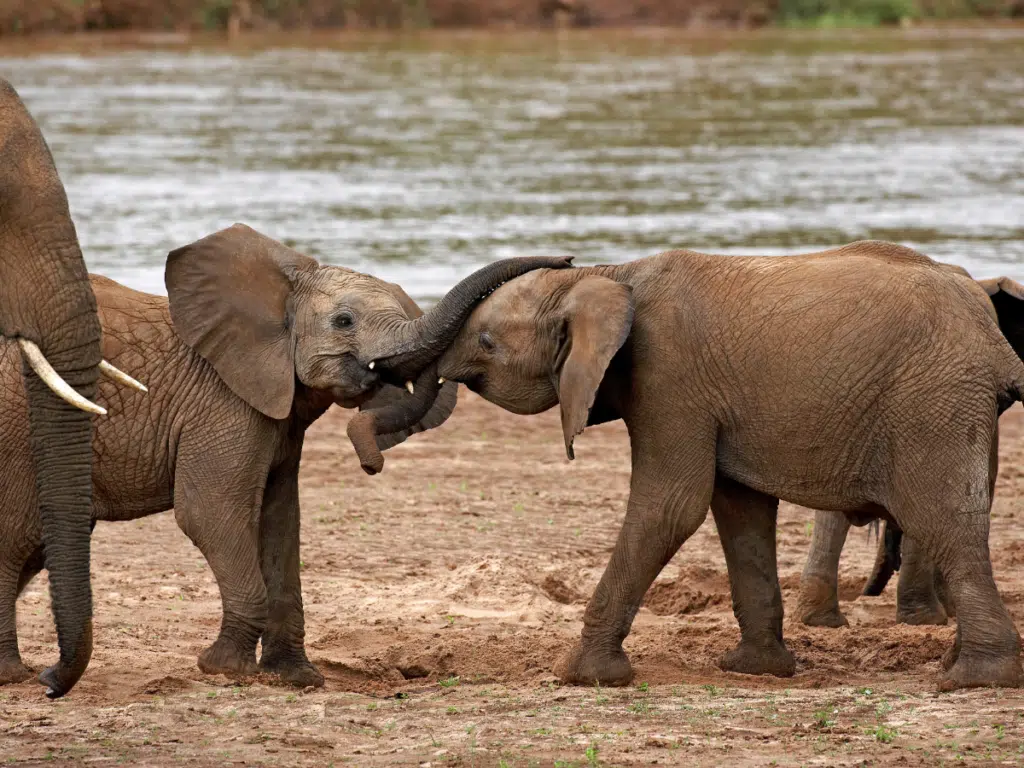
Kruger National Park Wildlife
As one of the most revered safari destinations in Africa , it’s no surprise that the wildlife at Kruger National Park is unrivaled. Known as being a great destination to see the famous Big Five of Africa (lion, elephant, Cape buffalo, leopard, and rhinoceros), you’ll have an incredible chance to see all this and much more.
While the national park is filled with far too many animals to name, here are a handful of the animals that make the biggest impression among travelers visiting the park:
- Big Cats: Cats like the lion, cheetah, leopard, and caracal are all big cats you’ll see within the park. Though some species are harder to spot than others, with some luck you can spot them all/
- World’s Largest Animals: The savannah elephant, black and white rhinoceros, Cape buffalo, hippopotamus, zebra, and Southern African giraffe are among the world’s largest animals.
- Africa’s Dogs: African painted dogs, black-backed jackals, and spotted hyenas are also present in Kruger; while African wild dogs are rare, much more commonly sighted in Sabi Sands Game Reserve , you’ll have a much better chance of seeing hyenas.
- Hooved Mammals: Blue wildebeest, kudu, impala, sable, nyala, bushbuck, and the exquisite small steenbok are all present in Kruger among the ungulates and antelopes.
- Strange and Exotic Species: Though smaller, the aardwolf, aardvark, pangolin, and stripped polecat are all among some of the park’s most fascinating smaller creatures.
The best place for seeing wildlife in the Kruger National Park is at the Nature’s Valley campsite, where you can spot nocturnal animals like leopards and hyenas. However, if you’re hoping to see the Big Five, your best bet is at one of the larger campsites like Skukuza or Lower Sabie.
If it’s an adventure you are looking for, Kruger National Park has it all. For starters, go on a game drive at the Phalaborwa gate. Try the Wolhuter Wilderness Trail. Another great option is the Tshokwane Picnic Site.
If you’re looking for something more challenging, check out the Napi Wilderness Trail or Olifants Wilderness Trail. And finally, if you really want to push yourself, consider doing the Sweni Wilderness Trail.
Kruger National Park Big Five
Many travelers in Kruger National Park, particularly first-time safari travelers, want to make sure to see all of the Big Five of Africa while visiting the park. While sighting all five of these animals isn’t guaranteed, you’ll have an excellent shot! These are the Big Five animals in Kruger, and the most up-to-date details about the frequency of their sightings by travelers.
Read More: What Are the Big Five of Africa? + How To Spot Them
Lions in Kruger National Park
Lions are quite common in Kruger, and you’ll likely encounter multiple over the course of your South Africa safari, especially in this iconic national park. There are an estimated 1,600 lions in the park, quite a healthy number for a park of this size.
While you can see lions throughout the park, Camp Shawu with its dam is an area that is known for its abundant lion sightings.
Leopards in Kruger National Park
While leopards are much more elusive than lions in this national park, there is a decently-sized population of leopards, giving you a good chance to see them during your safari. Leopards tend to be more solitary and sneaky than lions, making them harder to spot, though Kruger is a great place for it.
Elephants in Kruger National Park
Elephants are incredibly abundant in Kruger National Park and throughout the Greater Kruger area, making them a mainstay on safaris here. While elephants are one of the Big Five species you’ll most frequently encounter in the park, you’ll still savor the special moments with these gentle yet fearsome giants.
Buffalo in Kruger National Park
Like elephants, buffalo are plentiful in Kruger National Park. Large herds call this national park home, making them incredibly easy to spot , and likely to be a daily fixture on your game drives.
Rhinos in Kruger National Park
While black rhinos are traditionally the rhino species associated with the Big Five animals, Kruger is home to significantly more white rhinos than black rhinos. A frequent target of poachers, black rhinos now only number to a few hundred in Kruger, while several thousand white rhinos still remain in the park.
Best Sabi Sands Lodges
- Elephant Plains Game Lodge ($$ – $$$)
- Lion Sands River Lodge ($$$)
- Inyati Game Lodge ($$$)
- Cheetah Plains Lodge ($$$$)
Kruger National Park Safaris
If you’re looking for an African safari adventure , look no further than Kruger National Park, regardless of your budget. Whether you’re looking for a luxurious lodge or a budget-friendly experience in the bush, you’re sure to find it in Kruger.
Choose from a variety of different safaris to suit your interests and budget, including group or private tours with flexible options for driving yourself or having a guide take you around.
Self-Driving Safaris in Kruger National Park
One of the aspects of Kruger National Park that makes it so affordable is that, as a national park, visitors can drive themselves through the park. That means no guides are needed – just plan for the cost of your rental car! This is a great way to save money if you don’t have the budget for an expensive lodge with game drives included.
Of course, self-driving safaris aren’t for everyone. Many safari travelers prefer exploring with trained guides. However, they’re a great option to consider for budget-friendly travel or if you’re looking for the independence to plan your own days.
Keep in mind that you can’t venture off the roads on self-driving safaris, as you can when experiencing a guided game drive on the private game reserves surrounding Kruger National Park. This can make it harder to see wildlife at times – come prepared with binoculars to get the best view!
Kruger National Park Guided Tours
Travelers looking for savings but who would like a guided drive rather than a self-driving experience can book one-day guided drives through Kruger National Park . These are quite economical and can really enhance the experience!
Alternatively, you can also find inclusive multi-day safari tours through Kruger National Park, with transportation included for a totally hassle-free guided experience through the park.
If you’d prefer the experience of guided game drives as part of a stay at a safari lodge, plan to stay at one of the private concessions located within Kruger National Park. Among the best are the Singita Lebombo and Singita Sweni lodges along Kruger’s border with Mozambique ; Singita’s impressive conservation efforts make these ecolodges Earth-positive among this protected terrain.
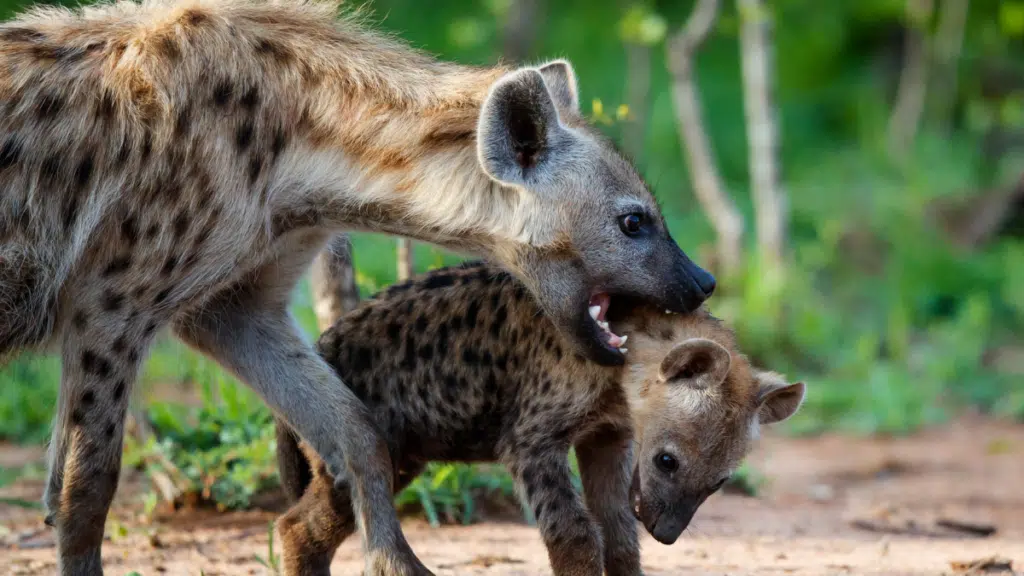
Where to Stay in Kruger National Park
No matter your budget, you’ll find an incredible array of options to choose from when deciding where to stay in Kruger National Park. From luxury lodges to basic rest camps and even campsites for tent camping, you’ll be able to choose the option that’s right for you, one of the major benefits of choosing this South Africa safari destination .
If you’re interested in camping, there are campsites throughout the park; set up your tent and enjoy nature at its finest. There are also several lodges located on private concessions inside the park, offering a more comfortable experience while still giving you the opportunity to photograph wildlife. These are some of the best places to stay in Kruger!
Jock Safari Lodge
The first private lodge built in Kruger National Park, Jock Safari Lodge offers a feeling of an earlier time. Perched along the banks of the Mitomeni and Biyamiti rivers in the Bushveld Concession Area, Jock Safari Lodge enjoys a privileged spot in a region known as one of the greatest in the Kruger National Park.
In addition to impressive and comfortable furnishings, Jock Safari Lodge is known for its incredible and unique safari experiences. To view the area’s rich wildlife, visitors may take daily game drives in open safari vehicles. Walk into the neighboring bush to observe historic Bushmen artwork.
During the rainy season, go on a frog safari to observe the many species frogs that live in the region and learn about the stories told by the stars.
Bateleur BushVeld Camp
Bateleur Camp , known as “Family Cottages,” was constructed in the late 1980s and has seven completely furnished chalets. Each accommodation is air-conditioned or has a ceiling fan, and many of the bedrooms have en-suite bathrooms. At Bateleur Camp, all lodging spaces are serviced daily and furnished with linens, towels, and soap.
A game-watching hide that looks out over a waterhole is one of the numerous attractions at Bateleur Camp . In the presence of knowledgeable drivers and trackers, night drives give you the chance to partake in the nocturnal animal inhabitants of Kruger Park’s nighttime act ivities.
Shimuwini Bushveld Camp
Shimuwini Bushveld Camp offers basic accommodations but its secluded, picturesque location along the banks of the Letaba River is unforgettable. Offering stunning river vistas and almost guaranteed wildlife encounters year-round , you’ll enjoy easy access to excellent elephant and buffalo country.
Activities at the camp are morning drives, night drives, and guided bush walks, all led by knowledgeable guides and trackers. Offering a great safari experience at an affordable price, it’s a hidden gem within Kruger National Park.
Singita Sweni Lodge
Located on Singita’s impressive private concession within Kruger National Park, Singita Sweni Lodge is an impressive luxury lodge located on the lush banks of the Sweni River. Just a few miles from the border of Mozambique, this impressive lodge features just seven private suites nestled among trees for a secluded and romantic safari experience you won’t forget.
No expense is spared at Singita Sweni in even the smallest detail of the guest experience. Expansive open-concept rooms feature gorgeous furnishings and private indoor/outdoor spaces with pool and outdoor shower included! The riverside location is perfect for animal and bird encounters even before you head out on incredible game drives.
- The Best Safari Parks (For Every Traveler)
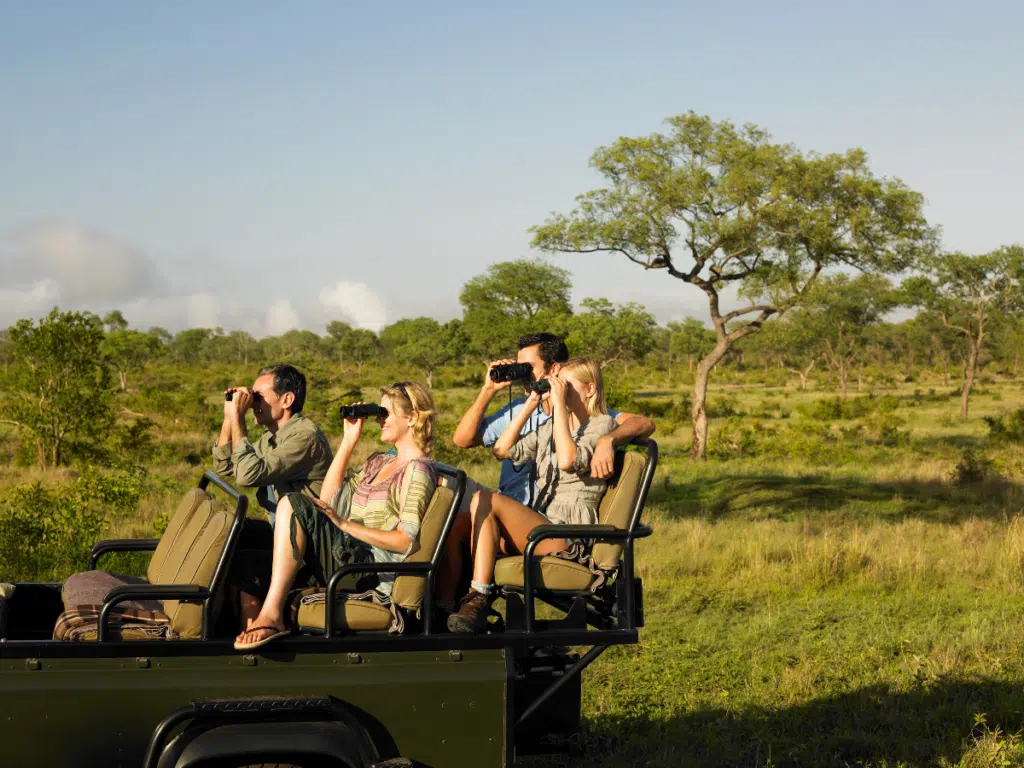
Kruger National Park – FAQ
Where is kruger national park.
The Kruger National Park is located in the northeast corner of South Africa, bordering Mozambique to the east and Zimbabwe to the north. The park covers an area of 19,485 square kilometers (7,523 sq mi), making it one of the largest national parks in Africa.
The Kruger National Park is located in two provinces: Mpumalanga and Limpopo. The park covers an area of about 19,485 square kilometers (7,523 sq mi), making it one of the largest game reserves in South Africa .
How Big is Kruger National Park?
Kruger National Park is one of the largest and most popular safari parks in Africa . It covers an impressive 19,485 square kilometers of land, which is larger than almost 60 countries! This makes it a must-see destination for tourists from all over the world, certainly a bucket list destination you won’t want to miss.
When Did The Park Open?
1927 is when the gates opened at Kruger National Park for the first time. At that time, just three cars were permitted into the park each year! Needless to say, things have changed a lot since then.
Today, Kruger National Park is one of Africa’s most popular tourist destinations. More than one million people visit every year , and the park continues to grow in popularity. There’s something for everyone here from lions and elephants to bird-watching and hiking. So if you’re looking for an amazing African safari experience, be sure to add Kruger National Park to your list!
How Many Animals are in Kruger National Park?
Kruger National Park is home to a very large variety of animals, including the Big Five of Africa . In fact, it is estimated that the park has between 120 and 240 African wild dogs, up to 13,100 blue wildebeest, 35,300 plains zebras, 120 cheetahs, 4,420 Nile crocodiles, 500 bushbucks, and 37,130 African buffalo . There are also 460 eland present in the park, as well as 3,100 hippopotamuses.
How Many Tourists Visit the Park Each Year?
Kruger National Park is one of the most popular tourist destinations in Africa and receives an estimated one million visitors or more every year. Safari vehicles are a great way to see the park without getting too close to any animal interactions. The park is divided into five regions, each with its own unique attractions and landscapes.

Carley Rojas Avila
Carley Rojas Avila is a bilingual New York-based travel writer, editor, content marketer, and the founder of the digital travel publications Explorers Away and Home to Havana. Carley is an expert on all things Latin America, the Caribbean, and Cuba, having lived and worked in four different countries in the region. Her writing has appeared on the Associated Press wires and in Travel + Leisure, Yahoo, MSN, Euronews, The Weather Channel, and more. When she's not writing about her travels, find her front row at a Bad Bunny concert, befriending street cats, and taste-testing every pizza in Havana.
Where are you flying from?
- London Heathrow
- Manchester International
- Cardiff Airport
- London Stansted Apt
Our new direct Virgin Atlantic service commences 22nd October 2023.
Please remember when searching for your holiday to add an additional night, as we operate an overnight service on our outbound flight.
i.e. For a 7 night holiday please search for 8 nights.
Our new direct Virgin Atlantic service commences 30th October 2023.
We will operate from London Heathrow four times a week on Mondays, Tuesdays, Thursdays and Saturdays.
Our seasonal Virgin Atlantic service with up to 4 direct flights, will operate until the 19th May 2024.
Our seasonal direct service will recommence on the 28th October 2024.
Our Virgin Atlantic service operates on Mondays, Wednesdays and Sundays.
Flights include a short touchdown in Barbados.
Our Virgin Atlantic service operates on Tuesdays, Fridays and Saturdays until 29th March 2024. From the 2nd April, this service will reduce to Tuesdays and Saturdays.
Our seasonal service will recommence on the 29th October 2024, with flights operating on Tuesdays, Fridays and Saturdays
Our seasonal Virgin Atlantic service with up to 3 direct flights, will operate until the 11th May 2024. Flights will commence from 23 May 2024 - 24th October 2024 on Thursdays and include a short touchdown.
Our seasonal direct service will recommence on the 29th October 2024.
Daily direct flights from London Gatwick to New York with our partner airline, Delta, operates between 10th April and 26th October 2024.
Our Virgin Atlantic service with direct flights, will operate on Wednesdays and Sundays until the 30th March 2024.
Our direct service will operate on Tuesdays and Thursdays from the 2nd April 2024.
1 room / 2 adults
Please enter all child ages
There must be 1 adult per child under two years of age travelling, please adjust your passenger number
To book online please select a maximum of 9 passengers, to book 10 adults or more please call 0344 557 3978
Please note: Drivers must be over the age of 21 to hire a car unless otherwise specified. Drivers between 21 and 24 years of age may be subject to additional costs.

Kruger and surrounds holidays
A must-do in south africa, kruger and surrounds from £1211pp.
The world-renowned Kruger National Park is one of the world's most spectacular nature reserves. Set off on a Kruger National Park holiday and take in the awe-inspiring landscape and scenery of the South African wilderness. Perfect for nature lovers or those looking for an adventure, make the most of a luxury Kruger safari.
Hotels in Kruger and surrounds
Essential information for kruger and surrounds.
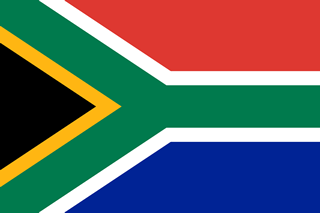
Do I need a VISA?
Your UK passport should be valid for a minimum period of 30 days from the date of exit from South Africa and it should have at least 2 blank pages when you present it at immigration to enter or leave South Africa.
Find out more about Travel Visas here »
Getting around
The Kruger National Park is approx a 5-6 hour drive from Johannesburg. The area is quite vast but depending on which lodge you stay in we recommend flying into either Skukuza or Hoedspruit airports where you can drive or be transferred to your lodge.
Highlights of Kruger National Park and surrounds
Everybody should go on a safari at least once in their life, and where better than South Africa's world-famous Kruger National Park and the Eastern Cape, rich in wildlife and home to the Big Five.
One of Africa’s biggest game reserves, Kruger is home not only to the Big Five (FYI, that’s lions, leopards, rhinos, elephants and buffalos), but hundreds of other mammals and birds, too. For wildlife, Kruger National Park is pretty much unparallelled. Not only that, rolling savannah and distant mountains make for the safari setting of dreams.
Want to experience safari without skimping on luxury? You’re in luck. Kruger National Park and the Eastern Cape is famous not only for its vast and diverse variety of flora and fauna, but also for its luxury safari lodges, so you get the best of both worlds.
Here’s how to make the most out of your Kruger safari trip:
Kruger safaris are always sensational, but there’s nothing quite like taking a game drive around the National Park by sunset or sunrise. Spot the Big Five before the rest of the world wakes up, as well as cheetahs, wild dogs, antelopes, honey-badgers, bush babies and up to 350 bird species.
For a different safari experience altogether, how about walking Kruger safari tours with expert field guides and trackers? There’s nothing quite like it for feeling close to the action and at one with the wildlife.
If you’re feeling fancy, take a helicopter flight across the bushveld and over the Blyde River Canyon. The views will take your breath away, and the ride itself is a thrill. You might even be lucky enough to spot a herd of elephants from way up in the sky, where you’ll be able to watch the magnificent creatures in their natural habitat.
Enjoy phenomenal stargazing – some of the best in South Africa – from Jock Safari Lodge , where you can even choose to sleep out on your riverside sala for the best outdoorsy experience.
Planning on taking the kids? They’re in for a treat! Drop them off at Ulusaba Rock Lodges's ‘Cub’s Club’ for mini rangers’ courses, safari goodies and activities which will inspire even the most apprehensive of little ones. Kruger National Park holidays are truly the best for individuals and groups of all kinds, including families of all sizes and ages.
Many of the lodges celebrate the local Shangaan culture with traditional singing and dancing after dinner or around the BOMA by night, a beautiful and harmonious treat for everyone.
Often when you think of safari holidays, you think of basic lodges and tents. But that’s not how we do safaris at Virgin Holidays, oh no! We’re all about treating you to a bit of luxury, no matter your destination.
Safaris in the Kruger Park safaris are always sensational, but there’s nothing quite like taking a game drive around one of the lodge’s private concessions. Choose a lodge in the Sabi Sands reserve and you will be able to skip the crowds and search for wildlife in your very own piece of paradise, with less vehicles and the ability to do night-drives, you really will feel spoilt. Book the exclusive Cliff Lodge at Ulusaba for jaw-dropping views and a private pool, as well as world-class service, or sleep under the stars in the oh-so-exclusive Chalkley’s Treehouse at Lion Sands . Kick back with a cocktail at the Motswari Private Game Reserve , which looks onto a watering hole, and watch animals come and go as you sip.
Special occasion? Celebrate your honeymoon with romantic private dining under the African skies and enjoy a hot stone massage using Africology products at the Aroma Boma Spa, Ulusaba.
Sounds just a little bit better than you were expecting, hey?
Foodies, rejoice: you’ll get to taste some delicious local food as part of your Kruger safari packages:
- After an early start spotting the Big Five, a post-safari breakfast will be extremely welcome. How does poaches eggs on a Boerewors patty, a specialist sausage, sound? Thought so.
- Lunch is served followed by high tea before afternoon game-drive then it is time for the best bit, sundowners. Enjoy stretching your legs in the park where your ranger will select a gorgeous spot for you to enjoy some traditional South African snacks with a cool cocktail or some fine local wine.
- Feast on Kudu burgers from a Braai , a traditional African BBQ – super succulent and so tasty you’ll want seconds, and maybe thirds. Even better, enjoy your dinner around the BOMA, with breathtaking views across the plains – the perfect sunset dining experience.
- As for drink, South Africa is, of course, famous for its vineyards, which means one thing and one thing only: wine. And good wine, at that. Try Pinotage, Chenin Blanc and other new world wines from local vineyards. What a way to wind down at the lodge after a day of wildlife-spotting!
It’s high time you booked yourself and your family or loved ones onto that safari trip you’ve been talking about for years, huh?
Let’s get this show on the road: browse our Kruger National Park hotels and lodges right now, this minute, and you’ll soon be hanging out with (okay, near) lions in the African bush.
Customers who like Kruger and surrounds also like...
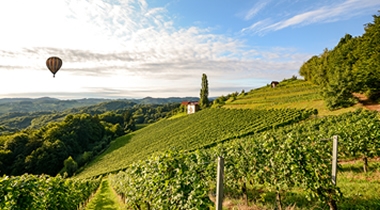

- Guided Safari
- Classic 4 Day Kruger Safari
Reservation for 4 Day Classic Kruger Safari Package
- All accommodation is subject to availability
- All last minute reservations (less then 31 days prior to arrival date) are payable within 48 hours after receiving a confirmed provisional reservation via e-mail.
- As accommodation availability changes from day to day all enquiries about general availability are subject to change without notice. Accommodation availability is only guaranteed once you receive a provisional reservation confirmation. In order to secure your reservation full pre-payment is required.
- Customer Support
- Tel: +27 21 424 1037
- Fax: +27 21 424 1036
- Contact by Mail
- Business Hours
- Mon - Fri. 08:00 - 17:00
- Saturday. 08:00 - 12:00
- Reservations and Booking
- Booking Conditions
- Visa and Passport
- About Siyabona Africa (Pty) Ltd
- Game Reserves
- Balule Game Reserve
- Manyeleti Game Reserve
- Sabi Sand Game Reserve
- Thornybush Game Reserve
- Timbavati Game Reserve
- Near Kruger National Park
- Birding in Kruger Park
- Kruger National Park
- Most Popular Pages
- Kruger Park Maps
- Best Time to Visit Kruger
- Getting to Kruger
- Accommodation at a Glance
- Camp Gates Map
- Kruger Park Gate Times
- Kruger Travel Help
- Conservation Fees
- Kruger Park News
- Reference Guide
- Africa Mammal Guide
- Africa Bird Guide
- African Flowers Guide
- Africa Grass Guide
- African Tree Guide
- African Reptiles Guide
- Kruger Park Culture
- Kruger Park History

Animals Around the Globe
Kruger National Park – All you need to know
Posted: November 25, 2023 | Last updated: November 26, 2023
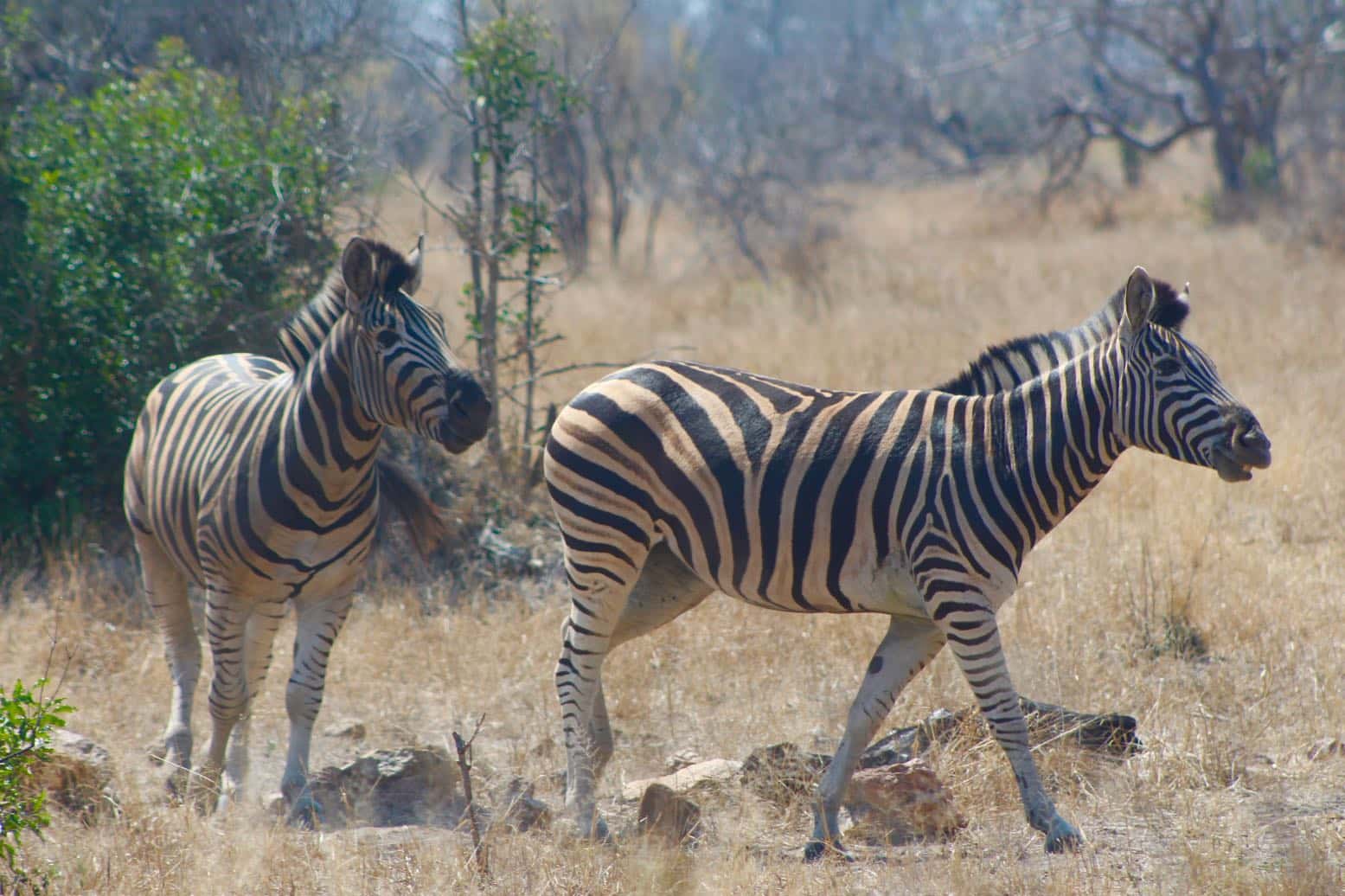
Have you ever heard about the Kruger National Park?
Or even luckier- have you ever been yourself? This is one of South Africa's national treasures. A spectacular piece of land totally protected and roamed by Africa's most incredible animals .
The Big 5 , amongst many more, reside in this wild and wonderful place, and the diverse fauna and flora bring in almost a million visitors every year.
The Kruger National Park is approximately the size of the whole of Wales which measures to 1,948 528 million hectares. It covers both the Mpumalanga and the Limpopo Provinces in the northern parts of South Africa and offers the visitor an exhilarating and up-close wildlife experience.
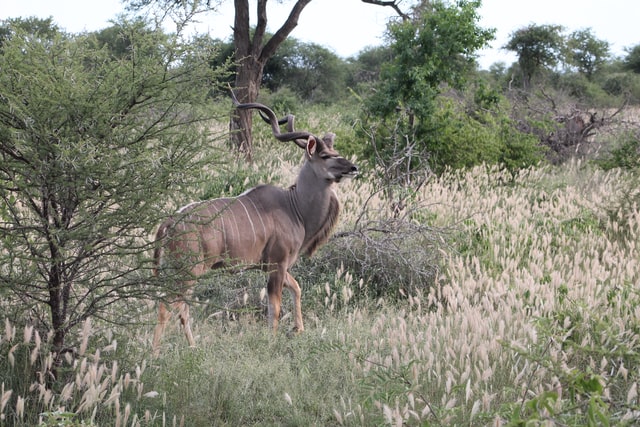
Where to begin?
Lion Sands River Lodge
If you wish to make your dream of exploring the Kruger a reality, these operators can make that a reality for you!
Upon arrival one also has to pay a conservation fee- this is for the upkeep and safety of the National Park as there is a lot of work being done to protect the animals internally.
From there airport, visitors usually get picked up by their game lodges accommodation (if you’ve gone that route), or you can hire a car to do your own viewing and travel within the Kruger.
Once you land you immediately get a sense of excitement and can usually spot amazing animals from the plane. As soon as you step out of the plane the wilderness is clear and exciting!
The hub of the Kruger National Park and the biggest rest camp is called Skakuza. There is a small airport called the Skakuza Airport, with a landing strip suited for small planes.
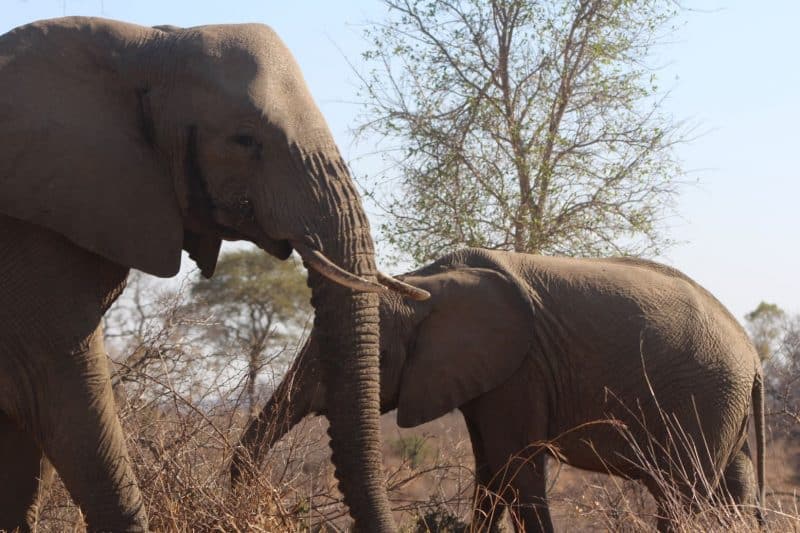
Skukuza Rest Camp
Skakuza, as the largest rest camp, has so much to offer. The accommodation in the camp gives one a real sense of culture in the Kruger as all the accommodation sites are shaped in traditional hut formats- completely round. The African culture in this area believes that having corners in a home is a space where evil spirits can dwell- hence the round huts and rondavels.
When walking around the camp, be careful of mischievous monkeys trying to steal a meal or even a backpack, and keep looking for rare and precious bush babies.
Skakuza is situated on the Southern Banks of the Sabie River. The camp is well foliaged and there are lots of lofty trees along the river's edge. Activities and facilities are diverse in this camp, as are the animals and plants found both within the camp and in the surrounding areas.
Entry and exit of the camps in relatively strict and there are severe penalties for not meeting the curfew of the camps internally. No one is permitted to do independent night drives- as it is far to dangerous. However, guided tours with special permission occur every evening and one can do so with a permitted company.
There are also various permits and passes you must obtain from here, wether you’re hiring a car to do your own game drives, or with a guided tour, there are very strict regulations to follow for your own safety as well as the animals safety.
This camp serves as the ‘headquarters’ for the Kruger, and it is from here you can enjoy a meal and their restaurants and consult the SANParks (South African National Parks) officials about any queries and concerns.
Skukuza, as previously mentioned is the Kruger National Park’s largest rest camp and administrative headquarters.
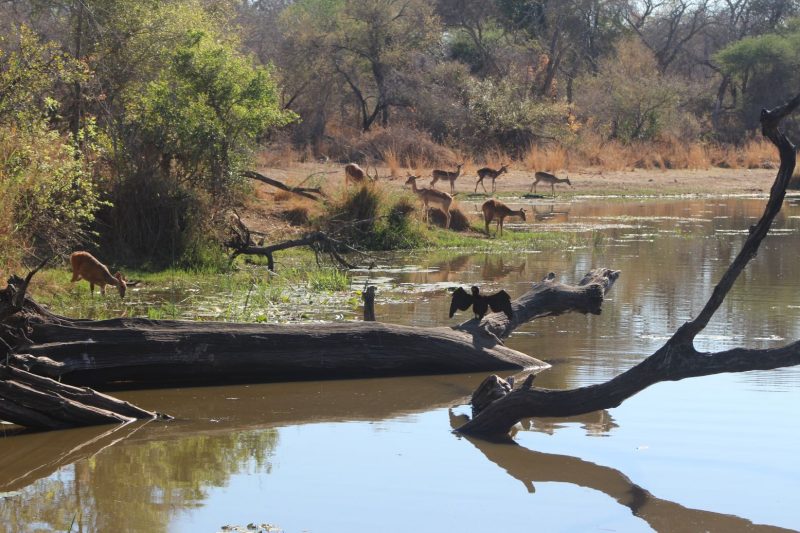
- Thick–tailed Bush Baby
- Spotted Hyena
- Purple–crested Lourie
These are all very lucky to spot, and some break into the camp itself, but mostly one can spot these cute five in the surrounding area and in trees. In the case of the hyena- this certainly won’t be in the camp itself- not to worry.
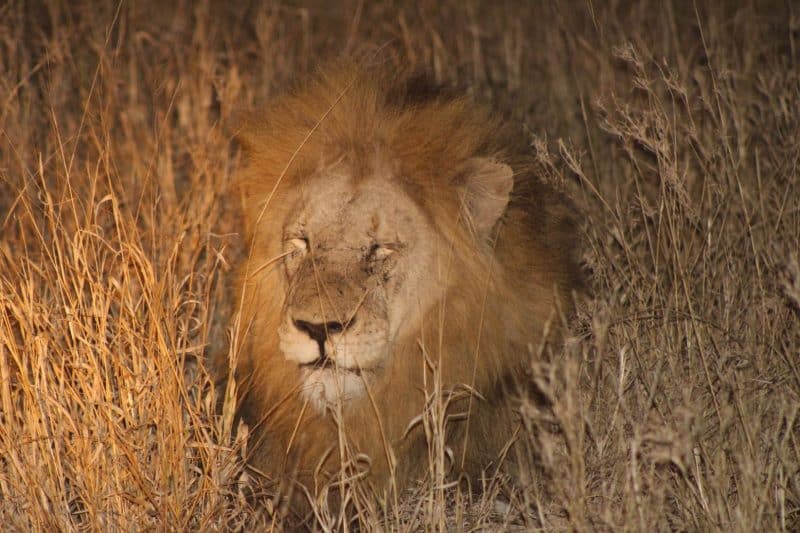
Satara Rest Camp
Clearly, Satara is a special camp to visit for its rich and popular wildlife viewing. It is situated around 90 kilometres from Skakuza, and has the most amazing sense of ‘wild’ in the camp.
Of the smaller animals, the Honeybadger is something to look out for on this South African safari. At night, spotted hyena regularly whoop from the camp’s perimeter while the repetitive sonar chink of fruit bats blends with the chirp of cicada and cricket.
Besides the regular big cats , general game includes; Blue wildebeest, zebra, waterbuck, giraffe and the ubiquitous Impala. Rhino, buffalo and elephant are also easily seen from Satara.
Because the fertile grazing land surrounding Satara this attracts vast herds of antelope and other grazers, and therefore, the large cats that prey on them are in abundance for you to see on your South African safari.
Satara Camp stakes its reputation on being one of the best spots in the world for viewing Lion, Leopard and Cheetah in the wild. Satara Camp is often referred to as the ‘cat camp’ because of the large numbers of Lion and Cheetah in the area, and is for this reason that Satara is such a popular camp.
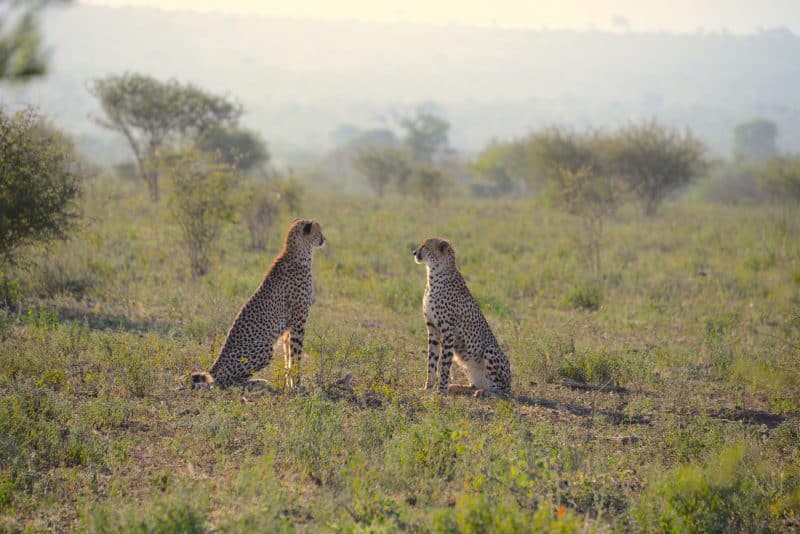
Plenty of activities like bush barbecues and traditional dances complement the game viewing here. Even an Open Air Theatre is available in this camp for visitors to enjoy. As mentioned earlier, Satara is the best camp for viewing lion, leopard and cheetah and there are good bird watching opportunities from the Sweni Bird Hide near by.
Large cats are frequently spotted in the Muzadzeni area, where a large and successful Lion pride operates, or along the 5100 route that runs east from Satara Camp, hugging the bank of the N’wanetsi stream. This stretch is especially productive in winter when the veld is dry, and Lion and Leopard lie waiting to ambush thirsty Antelope that swarm in large herds to drink at the few remaining pools of water.
Although there are no major rivers, there are watercourses lined with well-developed trees. There are 3 dams and 6 waterholes in the area, offering you plenty of opportunity to spot the Big Five.
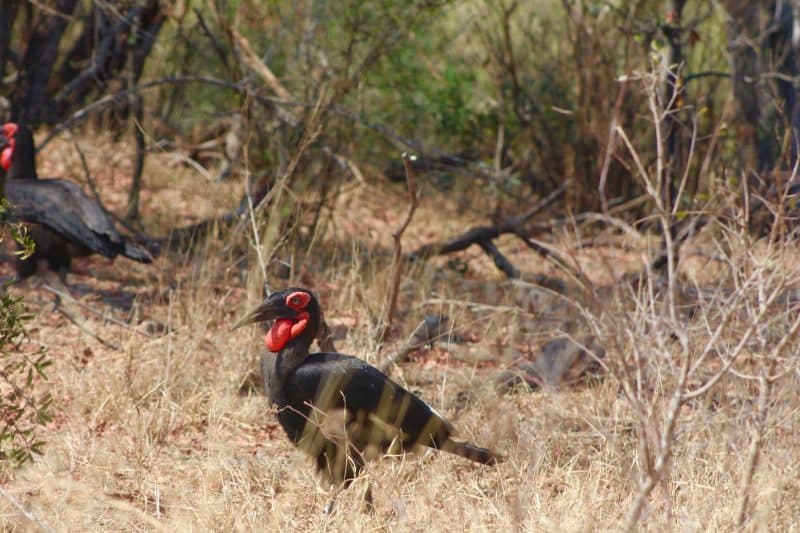
Satara, like other camps, has a plethora of resident birds. Particularly prominent are Red-billed buffalo weaver, glossy, greater Blue-eared and Burchell’s starling and mourning dove. At night, giant eagle, barn owl, scops and pearl spotted-owls can be seen and heard in the camp. The open plains to the north of the camp are a good place to record Montagu’s and pallid harrier for a South Africa safari.
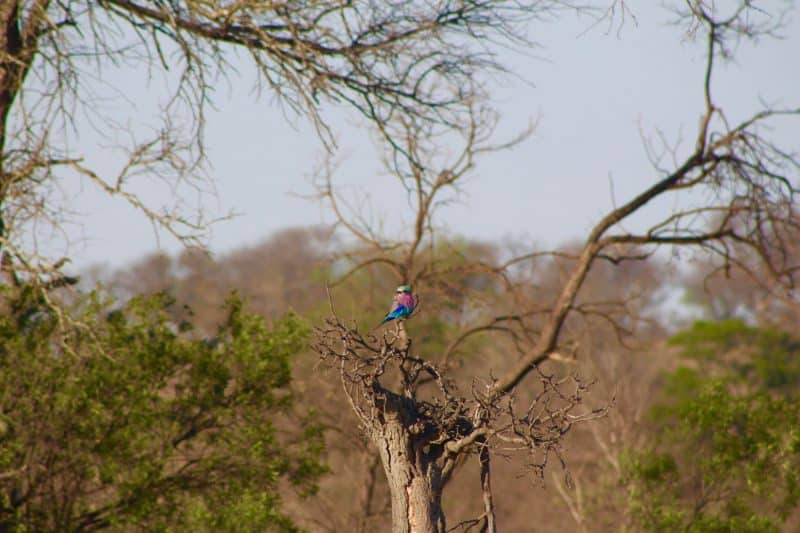
Lower Sabie
In this rest camp, the bounty and plenitude of nature are very evident, eloquently symbolised by the most conspicuous of its numerous trees, the mighty sycamore fig, which provides generously for the livelihood of many birds and insects . Not only do these giants produce fruit at least twice a year, but different trees produce fruit at different times, extending the gifts of life over many months. Watching the endless procession of animals coming to drink at the Sabie River establishes a sense of one’s own place in the eternal cycle.
Lower Sabie is a camp which graces the banks of the Sabie River, one of the few perennial rivers to flow through the Kruger National Park. Visitors cannot but feel soothed by the view towards the river and the Lebombo Mountains beyond.
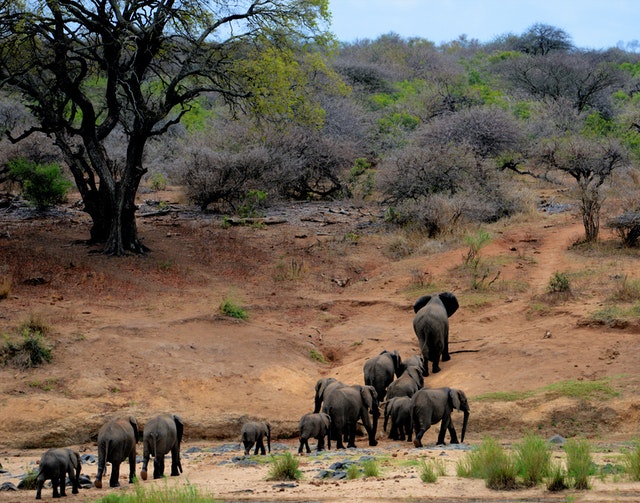
Game viewing is possible from Olifants Rest Camp where a shaded lookout platform is positioned. Here at your Kruger Park accommodation you are sure to spot Hippopotamus, Crocodiles in the Olifants River as well as the occasional Lion kill.
To the south, rolling plains are dotted with Buffalo, Giraffe and Kudu. While along the Olifants River, wildlife such as Lion, Crocodiles and Hippopotamus can be viewed on gameviewing and sightseeing excursions in Kruger Park, as well as an abundance of birdlife such as Owls, Storks and Eagles.
Because Olifants Camp is situated in a transitional zone, 2 distinct types of vegetation can be found, offering a wide range of game. In the north, the low lying Mopane trees provide cover for Zebra, Impala, Kudu and Elephant .
Guests that visit Olifants will be exposed to an unforgettable window of Africa. This camp is situated a top a hill which towers several hundred feet over the Olifants river. Views from the lookout platforms allow one to see the river below, just as a soaring eagle would survey it, as it hunts from the skies.
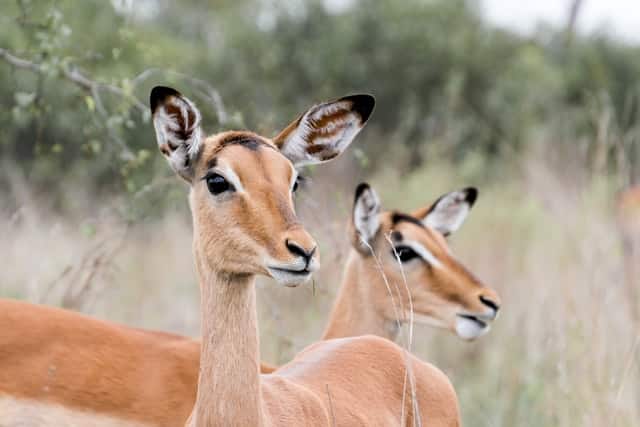
Pretoriouskop
Nostalgia prompted an exception to the rule for Pretoriuskop, the Kruger National Park’s oldest rest camp, and exotic flowering plants were allowed to stay, enhancing the strong sense of the past that is so pervasive.
The impressive granite dome known as "Shabeni Hill" is not far from the camp, which is found in the south-western corner of the Kruger National Park. It is immediately apparent to any visitor that Pretoriuskop is unique as brilliant red trees adorn the camp, pre-dating the decision to make exclusive use of indigenous plants in laying out rest camp gardens.
When the world was still young, some 3 500 million years ago, molten rock forced its way through the earth’s crust and solidified to form the spectacular granite outcrops where Pretoriuskop Rest Camp is now nestled.
More for You
NATO Aircraft Activated After Waves of Russian Strikes
Average US annual salary by age revealed – see how you compare
Do I have to pay off my spouse's debts when they die? Here's what you're responsible for and what you aren't after a loved one's death
2024’s Canceled Shows, for Your Final Consideration
7 Ways People Destroy the Value of Their Homes, According to a Real Estate Agent
A woman said her tattoos got her rejected for a job, but experts say personality is far more important
I Was Told My Father Was A 'Deadbeat.' After He Died, I Found Out Everything I Knew About Him Was Wrong.
Barack Obama shares his No. 1 piece of advice for his own daughters: Don't let your hunger for success ruin your happiness
Scientists have discovered the maximum age a human can live to
17 Phrases Older People Use That No One Else Gets
The most expensive state to live in isn't California or New York, based on data. Here are the top 10.
Man loses 450 pounds after reaching 'rock bottom.' 1 key diet change helped
I’m a Bank Teller: 3 Times You Should Never Ask For $100 Bills at the Bank
I’m a psychologist and mom—here are 3 phrases I wish more parents would say to their kids
Liz Cheney's Message to Supreme Court After Donald Trump Hearing
6 Medications You Should Never Mix With Dairy
China could force Putin to leave Ukraine in 'major shockwave to Moscow'
Marriage counsellor shares one sign your relationship is really over
Baking Soda Makes a Great DIY Weed Killer—Here's How to Use It
Here is the average credit score at every age in the U.S.—see how yours stacks up
- Kruger National Park Tourism
- Kruger National Park Hotels
- Kruger National Park Bed and Breakfast
- Kruger National Park Vacation Rentals
- Flights to Kruger National Park
- Kruger National Park Restaurants
- Things to Do in Kruger National Park
- Kruger National Park Travel Forum
- Kruger National Park Photos
- Kruger National Park Map
- All Kruger National Park Hotels
- Kruger National Park Hotel Deals
- Kruger National Park
- Things to Do
- Restaurants
- Vacation Rentals
- Travel Stories
- Rental Cars
- Add a Place
- Travel Forum
- Travelers' Choice
- Help Center
Kruger Private Game Moderate Price for family of 4 - Kruger National Park Forum
- Africa
- South Africa
- Kruger National Park
Kruger Private Game Moderate Price for family of 4
- United States Forums
- Europe Forums
- Canada Forums
- Asia Forums
- Central America Forums
- Africa Forums
- Caribbean Forums
- Mexico Forums
- South Pacific Forums
- South America Forums
- Middle East Forums
- Honeymoons and Romance
- Business Travel
- Train Travel
- Traveling With Disabilities
- Tripadvisor Support
- Solo Travel
- Bargain Travel
- Timeshares / Vacation Rentals
- South Africa forums
- Kruger National Park forum

I have spent a lot of time exploring best game reserve to go to and I am going round in circles.
What we would like- best immersive experience with nature. We are a family of 4, the kids are 12 and 14 and they love nature. Yes we would like to see the main players, but would also like something a little different.....giraffe's, smaller mammals, birds, etc. To sit on a verandah, in the evening, and watch animals come to a watering hole whilst drinking a moderately priced bottle of Crement ....may give you an idea.
Kruger is appealing because it's so vast- I love the idea of not knowing what you may see.
Many of the lodges are beautiful but so expensive, but I would like something that is mid-range, so not luxury and not basic.... a solid 3-4 star. My husband and I went to Phinda many years ago and LOVED it, but it far too expensive for us now (especially as we are now 4 people).
We also need to think about malaria risk.
We will travel in August 2024
Any help greatly appreciated.
3 replies to this topic

You need to give a budget. What is moderate to one, may not be moderate to another. Your kids are both likely to be charged the adult rate and you will need 2 rooms. Also you may have issues with availability at this point for August of this year.
Thank you. I am thinking around 25-35000 R per night (for 4). Am I delusional ?? :-)
Do you mind tented?
You all happy to share or you want separate rooms?
Do you mind 9 per vehicle?
Sandy - owner - Love Africa Travel
- Kruger Private Game Moderate Price for family of 4 3:23 pm
- Free week for SA residents Apr 25, 2024
- Satara restaurant menu Apr 24, 2024
- Skukuza airport, Kruger National Park Apr 20, 2024
- Recommendations for a government camp near MQP airport Apr 20, 2024
- Camera Beanbags Apr 17, 2024
- Help with Lodging Split Apr 14, 2024
- Kruger Safari questions for 7 nt safari Oct 2025 Apr 11, 2024
- Help with bewildering amount of info Apr 11, 2024
- Sabi Sands (4n) OR Timbavati+Klaserie (7n) Combo Apr 08, 2024
- Guided tours start and end at the park Apr 06, 2024
- Kruger Gate or Crocodile Bridge Gate or Malelane gate Apr 05, 2024
- Which area to stay for best wildlife viewing in July? Apr 04, 2024
- Help with lodge in Sabi Sands Apr 04, 2024
- Best time of year to go to Kruger National Park area? 3 replies
- Organised safari tour Johannesburg to Kruger 13 replies
- Closest Airport to Kruger National Park 7 replies
- Flights from Victoria falls to Kruger 5 replies
- Siyabona Africa Safaris 9 replies
- Icon Expeditions Tour Company South AFrica 8 replies
- Flights from Cape Town to Kruger National Park 6 replies
- Sabi Sands OR Timbavati 26 replies
- Go2africa? Are they good? Can anybody advise? 28 replies
- Kruger, Chobe or Okavango Delta 7 replies
Kruger National Park Hotels and Places to Stay
- How to do Kruger
- Under what circumstances do I need to take Malaria Prophylaxis in Kruger area
- Tipping during safari
- Background to staying and booking in Kruger National Park
- Top Safari Destinations
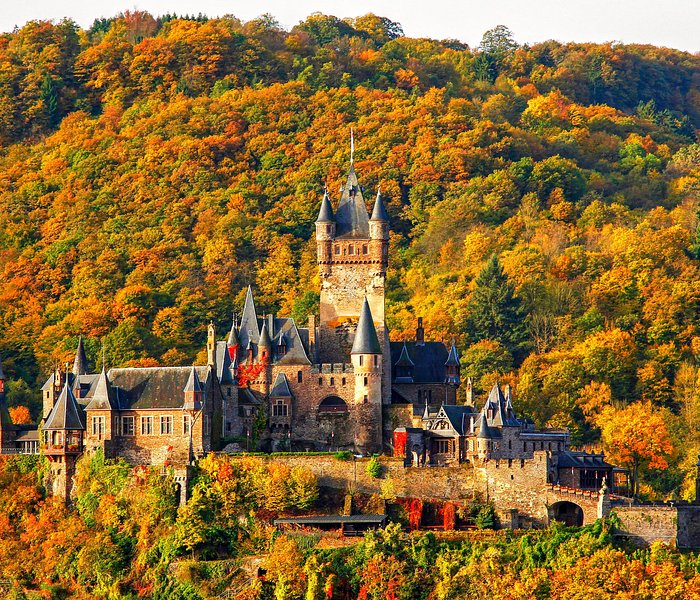

IMAGES
VIDEO
COMMENTS
South Africa's premier safari destination, Kruger National Park throws up some staggering statistics. Established in 1898, it extends over some 19,000km²/7,335mi² and supports a total of 147 mammal species (the most of any African national park). This includes an estimated 13,000 elephants, 40,000 buffalo, 2,000 lions and more rhinos than ...
Classic Kruger Safari. 2 to 7 Day safaris from R10 900 per person. As the name states, this is the classic way of going on safari in the Kruger National Park. On a Classic safaris, you will stay in en-suite chalets in the heart of the National Park with open vehicle safari drives. View Our Classic Safaris.
3 Day Kruger Park Lukimbi Fly-in Safari. 2 Nights at Lukimbi Safari Lodge in the Kruger Park, three full meals per day, all teas and coffees, two game drives daily in open land rovers and a safari walk. BIG 5 off-road game viewing. Big Five sightings in their natural habitat. Private views of the river or bush from your suite.
per adult. 7. Kruger National Park Afternoon Private safari. 34. 4WD Tours. 5 hours. The Kruger national park is a leading African wilderness, not only does it offer the Big 5 but cheetah and Wild Dogs, and…. Free cancellation. Recommended by 100% of travelers.
Kurt Safari offers a range of Kruger National Park safari packages, including 3, 4, 5, and 8-day options, including Photographic and Birding safaris led by experienced guides. Booking any of our Kruger Park safaris is easy through our website. You can choose the package that best suits your needs, book directly online, and make secure payments.
Plan your Kruger National Park safari trip from a range of recommended tours, from exclusive private safaris to affordable group safaris. Find out about the best game viewing routes, lodges, activities and attractions near Kruger Park.
Kruger National Park. South Africa, Africa. Kruger is one of the world's greatest wildlife-watching destinations. All of Africa's iconic safari species - elephant, lion, leopard, cheetah, rhino, buffalo, giraffe, hippo and zebra - share the bushveld with a supporting cast of 137 other mammals and over 500 varieties of bird.
South Africa's largest national park offers a safari experience beyond comparison - teeming wildlife like the Big 5, diverse landscapes, and luxurious accommodations. The Kruger National Park is home to the legendary , consisting of the lion, leopard, rhino, elephant, and African buffalo. However, there are many other fascinating wildlife ...
Book the Best 3, 4 or 5 Day Kruger Park Safaris and Tours. "Kurt Safari is the # 1 Rated Kruger National Park Safari Company on Tripadvisor. We specialise in 3, 4 and 5 Day Kruger Park Safari Packages, as well as Day Safaris and Tailor-Made Kruger Safari Trips. Safaris Depart Johannesburg Every Monday - Wednesday - Saturday.
Your #1 source for safari packages to South Africa's Kruger National Park. Our Kruger Park Safari Packages. Learn More. 7 Day Tremisana Game Lodge Safari. 7 Days. ... Viva Safaris has been established since 1991 and has over 25 years' experience in providing our guests with the best Kruger Park safari value anywhere in South Africa ...
5 Day All-Inclusive Greater Kruger with Simbavati. 4 nights at Simbavati River Lodge. Private game-viewing deck. River or bush views available. Outdoor rain-shower. 2x safari activites, daily. View safari to see all inclusions.. $ 620 USD. $ 490 USD.
All Kruger National Park fees are payable at the gate at time of entrance. Park fees are valid for 24 hours. International Visitors: 440 ZAR (USD 26.50) per adult, per day and 220 ZAR (USD $13.20) per child, per day. South African Citizens and Residents: R110 per adult per day & R55 per child per day.
There are 12 deluxe safari lodges on private concessions within the Kruger Park and a wide choice of ultra-luxury lodges in Greater Kruger. Located in the north-eastern corner of South Africa, Kruger Park covers an area of 2 million hectares. Added to that is Greater Kruger, 180 000 hectares of protected wilderness which lies on the Park's ...
The Kruger offers top-notch classic safaris where expert guides and trackers go in search of the Big 5 in customised 4×4 vehicles. For the truly adventurous, lodges like Rhino Post in the national park, Africa on Foot in Klaserie and Ngala Safari Lodge in Timbavati offer walking safaris, where your game drives can be replaced by venturing out on your own steam with a guide to discover Kruger ...
This is Kruger National Park, 7,580 miles of wild lands that are home to 500 bird species and 145 mammal species, including elephants, black and white rhinos, giraffes, zebras, antelopes, hippopotamuses, and lions. Located in the heart of the Lowveld, the entire park is a wildlife reserve and is bigger than the country of Israel.
This is our guide to what you need for a safari in the Kruger National Park. s. There are many lists out there telling travellers what to pack, and yet many travellers still get it wrong. Over packing is also a big problem. International flights have a high luggage allowance, but on many of the smaller planes and safari vehicles the amount of ...
It is no wonder the Kruger Safari Co.'s three-day camping safari is such a popular option for seeing the region's breath-taking scenery. You might also like our 4-Day Camping Kruger Park Safari Tour or 5-Day Camping Kruger Park Safari Tour. Collection from OR Tambo Airport Bus Terminals by 07:00am. from. ZAR 10995.
Kruger National Park: An Essential Guide to Africa's Most Iconic Safari Park. Covering an area of almost 2 million hectares, Kruger National Park is one of the largest national parks in the world. It is one of the most popular and famous African safari wildlife parks, and also one of the oldest. Founded in 1898, Kruger is world famous for its ...
Kruger and surrounds from £1206pp. The world-renowned Kruger National Park is one of the world's most spectacular nature reserves. Set off on a Kruger National Park holiday and take in the awe-inspiring landscape and scenery of the South African wilderness. Perfect for nature lovers or those looking for an adventure, make the most of a luxury ...
Kruger National Park - South African Safari. Customer Support; Tel: +27 21 424 1037; Fax: +27 21 424 1036; Contact by Mail; Business Hours; Mon - Fri. 08:00 - 17:00; Saturday. 08:00 - 12:00; Booking; Reservations and Booking; Booking Conditions; Visa and Passport; About Siyabona Africa (Pty) Ltd;
The Kruger National Park is approximately the size of the whole of Wales which measures to 1,948 528 million hectares. It covers both the Mpumalanga and the Limpopo Provinces in the northern parts ...
Skukuza airport, Kruger National Park Apr 20, 2024; Recommendations for a government camp near MQP airport Apr 20, 2024; Camera Beanbags Apr 17, 2024; ... Background to staying and booking in Kruger National Park; Top Safari Destinations; Kruger National Park Destination Experts. Craig Beal.
Watch as this Buffalo stands in a pond for an unusually long time in Kruger National Park, South Africa. #wildlife #amazing #safari #animals #nature
safarilodges_ on May 2, 2023: " Hoyo Hoyo Safari lodge in Kruger National Park in South Africa @hoyohoyo_safari_official The lodge is set on...".